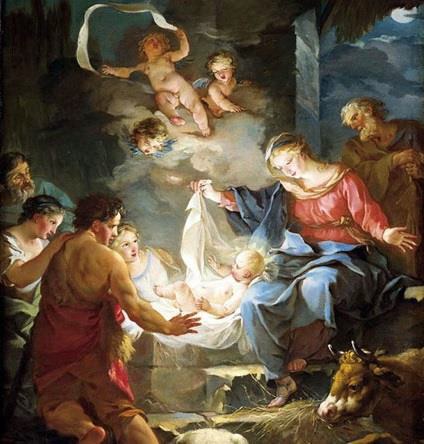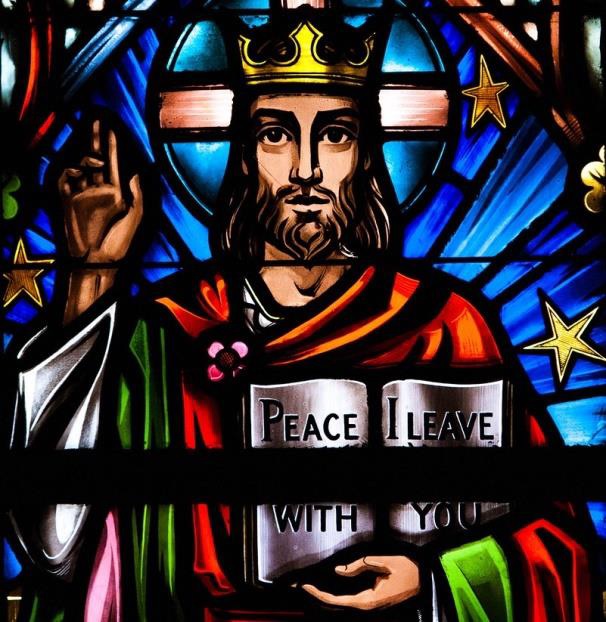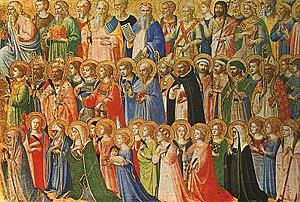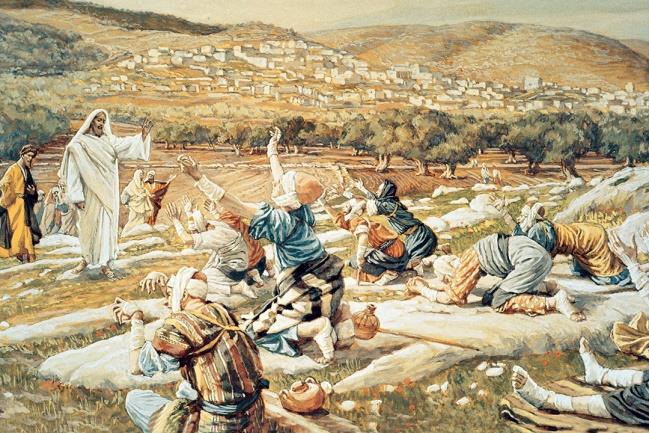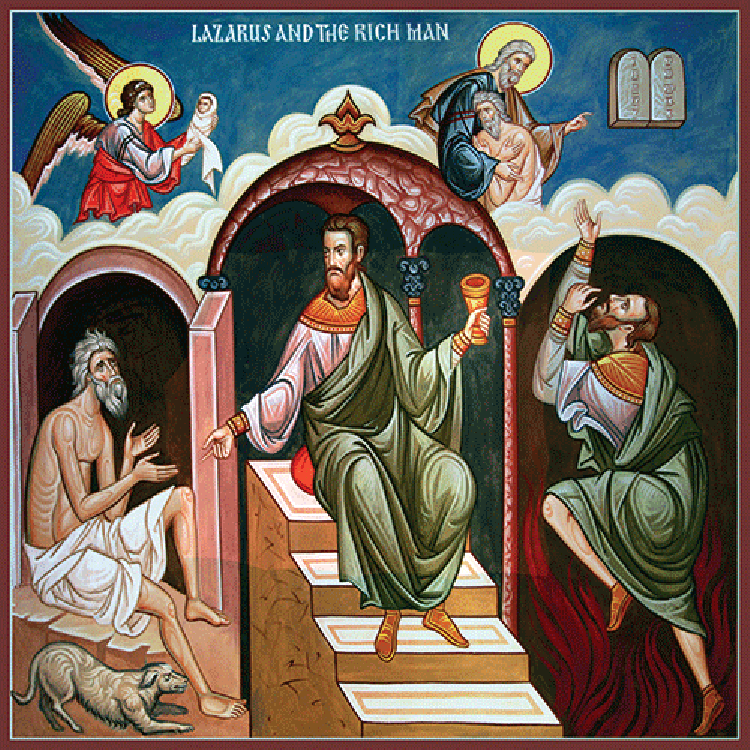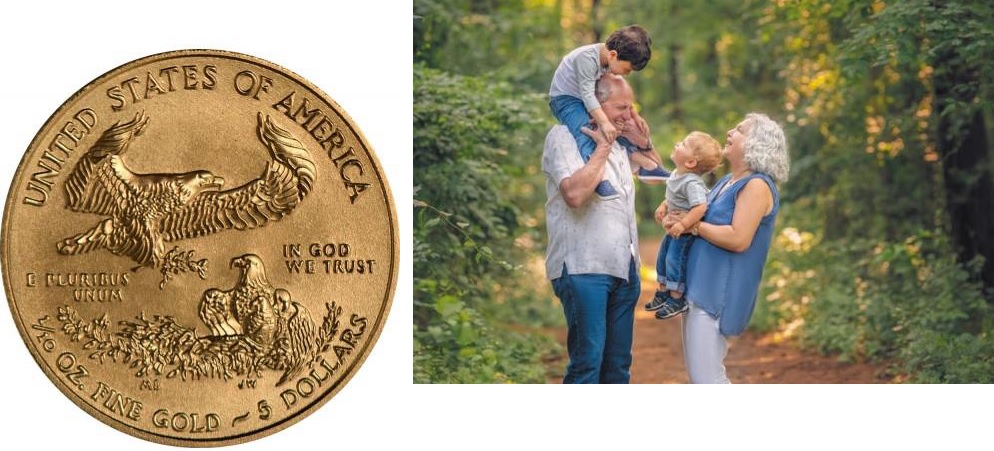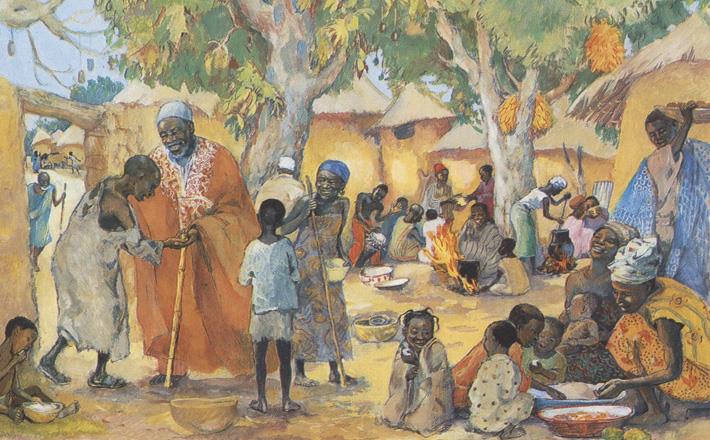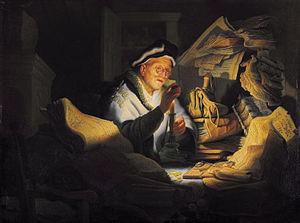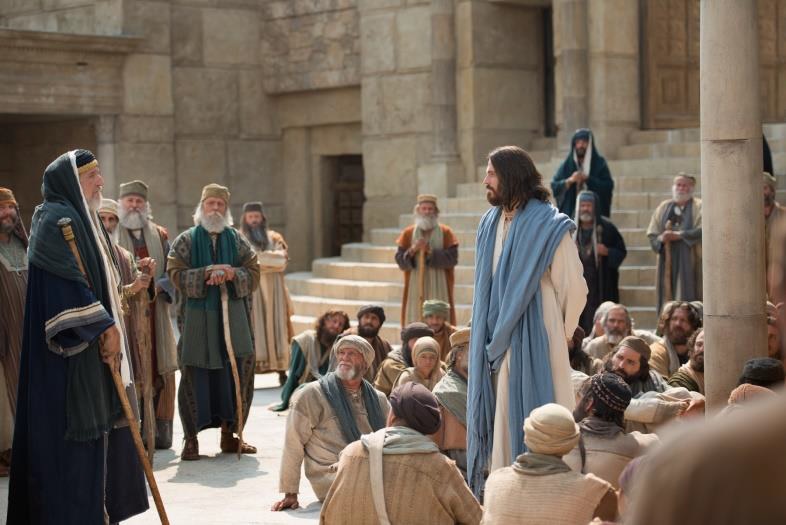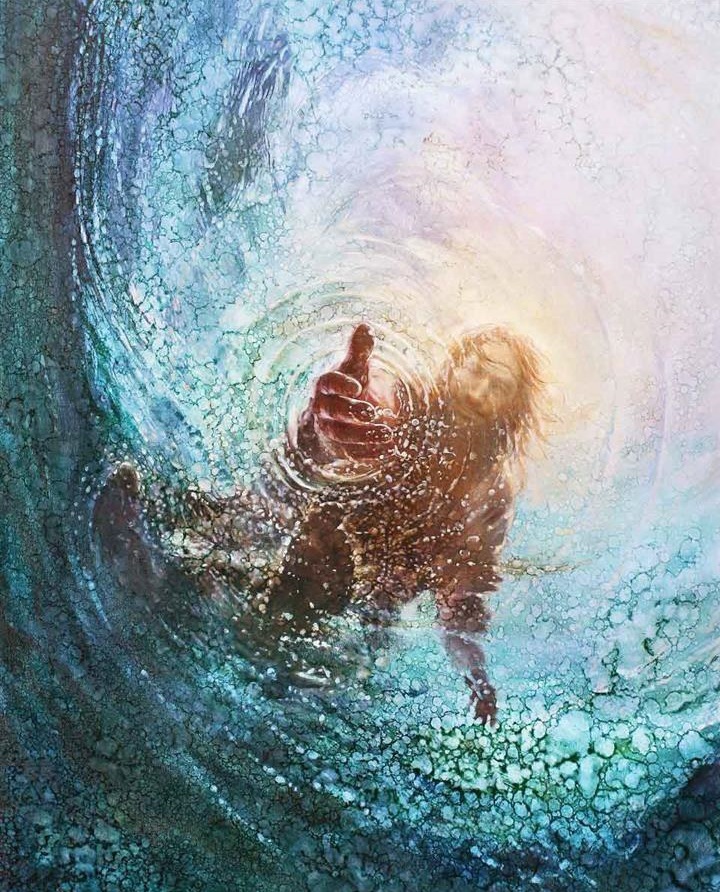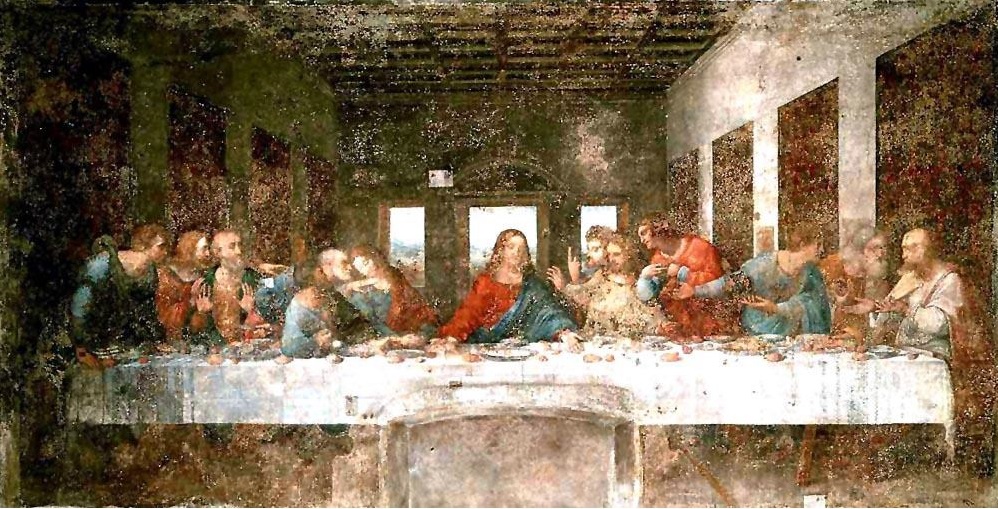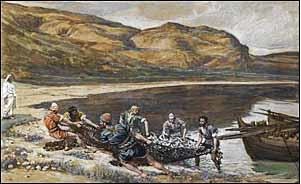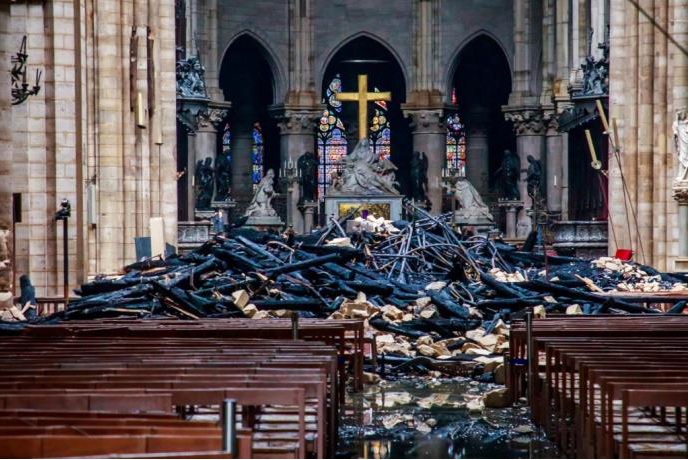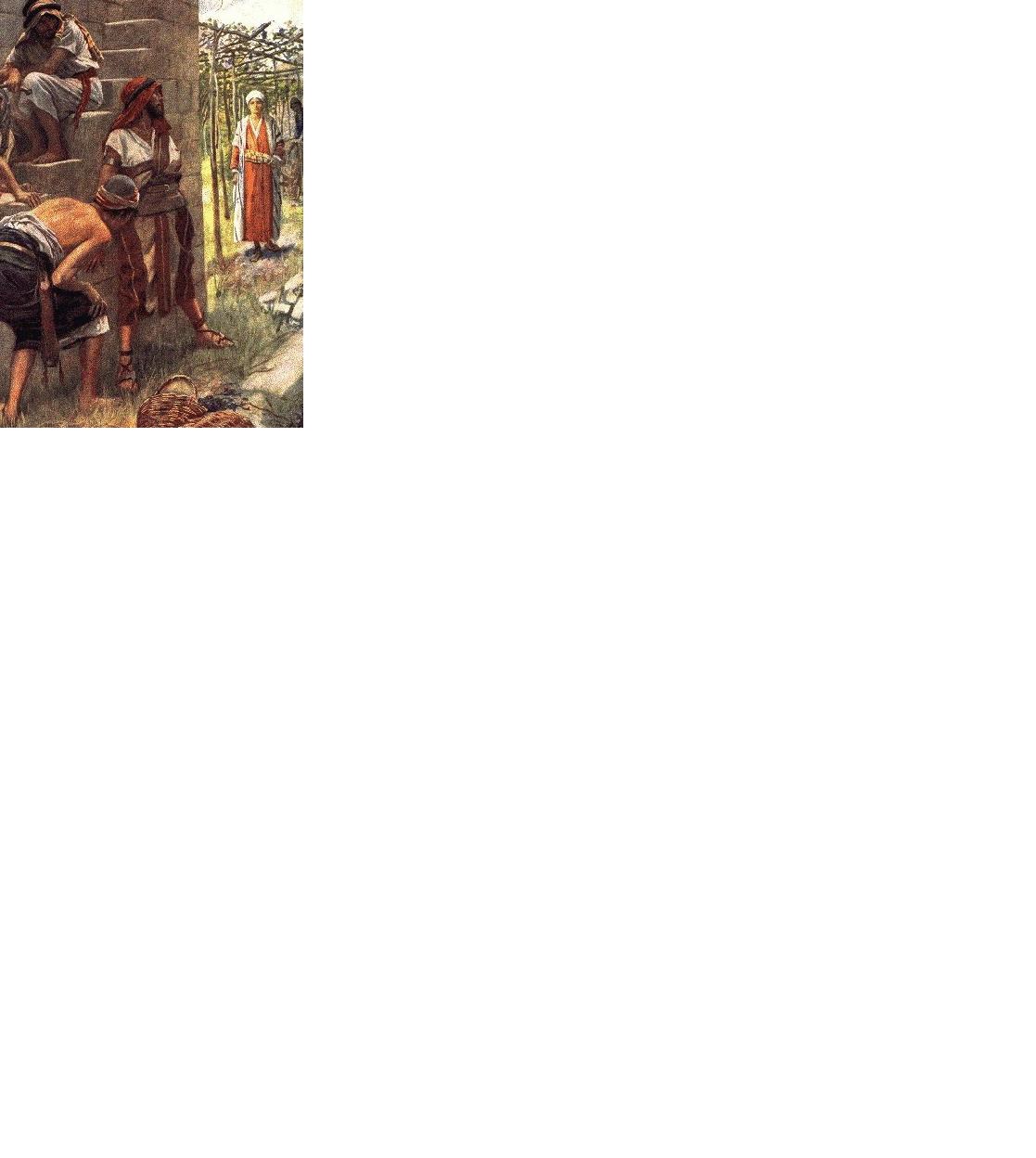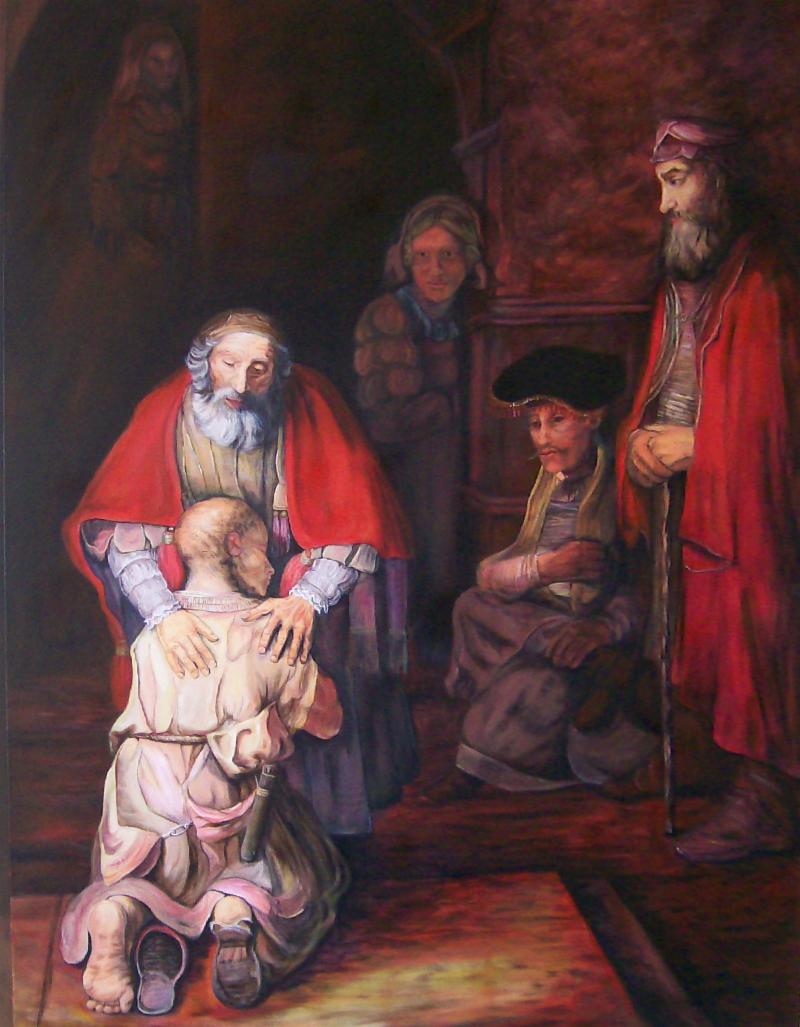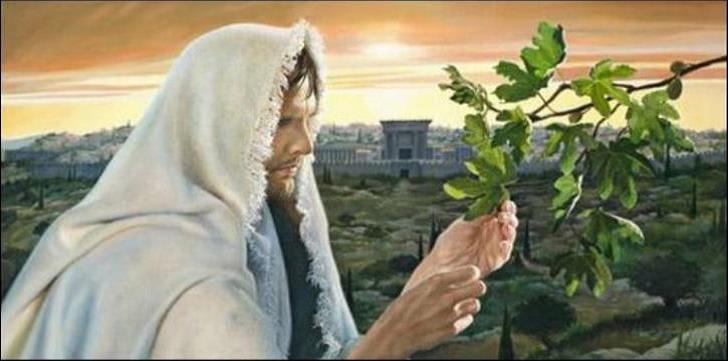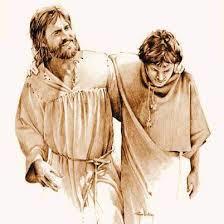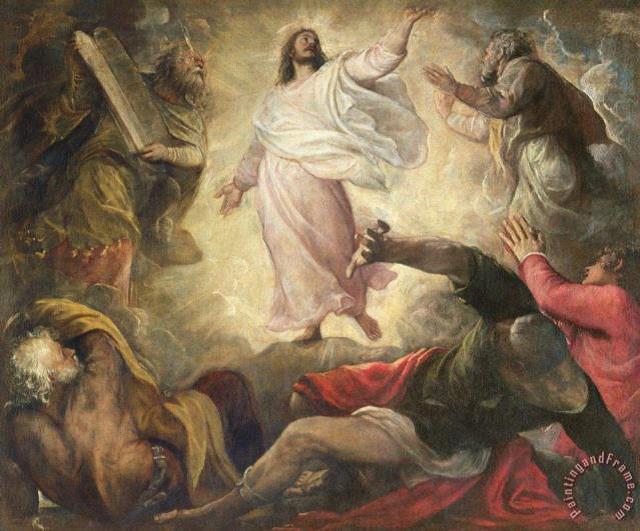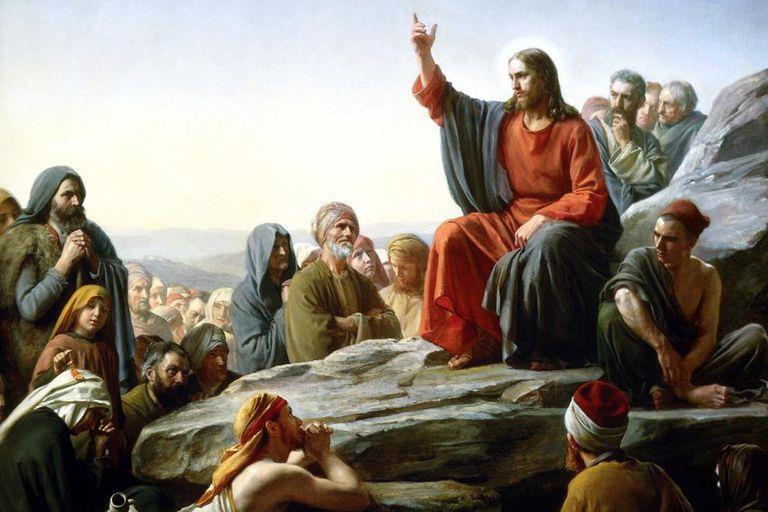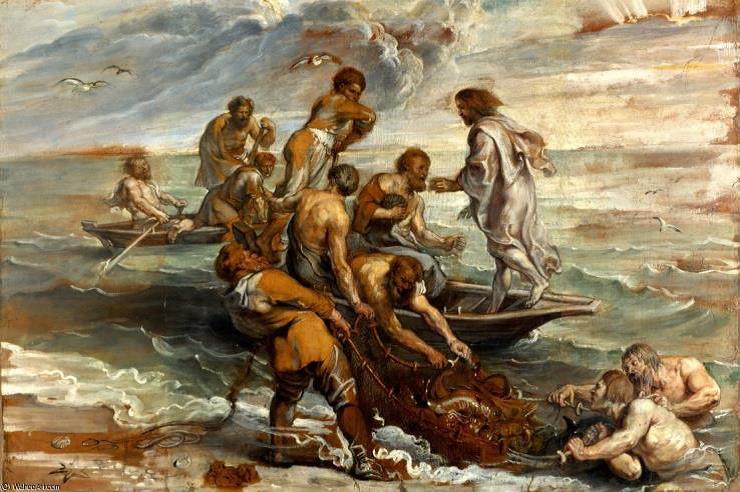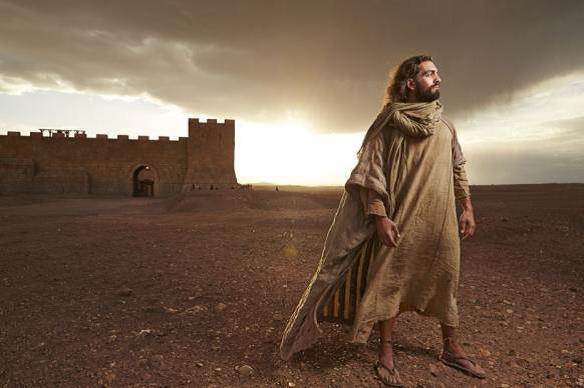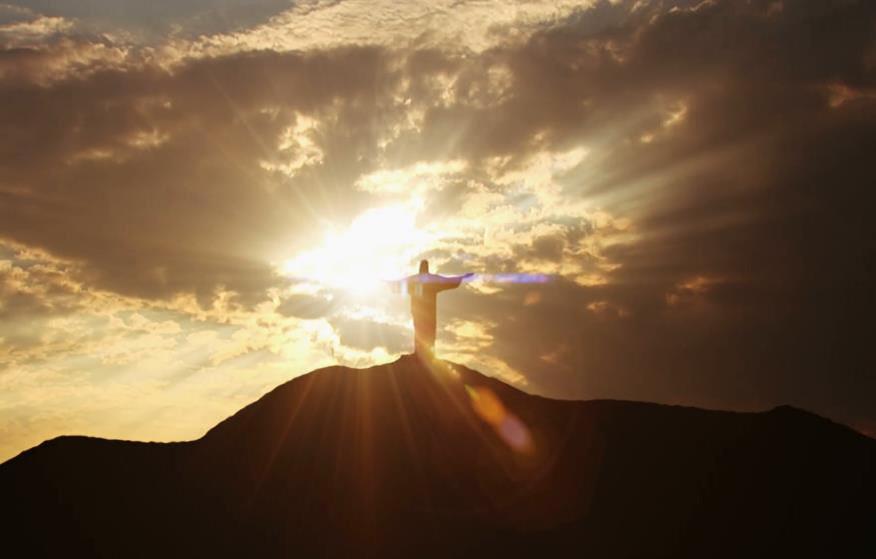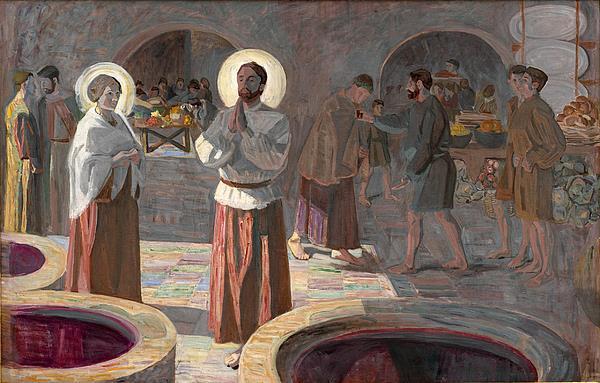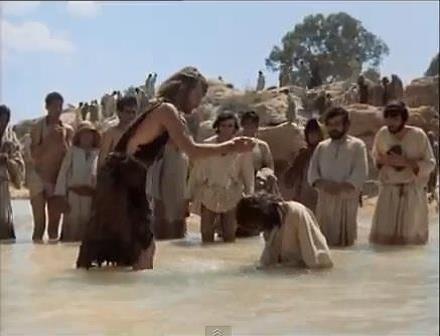|
|

Christmas Is a Gift Exchange
This Sunday and Beyond - December 29, 2019
Get it in PDF form with calendar
Gift exchange has become very popular for Christmas and other celebrations, especially in work places, schools or other institutions with a great number of people, where it is practically impossible to buy gifts for each person. So the solution is that each person buys a valuable gift for a specific person, who is kept a secret. It is usually known as Secret Santa, and the good thing is that every person is assured a gift. It was a well devised solution, perhaps even a commendable one, but God knows better.
No matter how valuable a gift we receive from someone may be—and some gifts are really valuable, not only for their material worth but for what they mean in terms of human relationships—none of them can equal the gifts that God is constantly pouring abundantly upon our lives: the gift of life itself, the gift of wisdom, the gift of His unconditional love manifested to us in the love of our fellow human beings and even other creatures of the animal kingdom.
But there is one special gift that God has given us that is unrivaled: the gift of Himself. How did God manage to give Himself to us? He devised a special plan. He made himself man. He was incarnated by the power of His Spirit in a very special human womb, that of the blessed Virgin Mary, and left the realm of timelessness and omnipresence in order to live a human life, in a given time, at a given place. This gift is none other than our Lord and Savior Jesus Christ. He is perfect man and perfect God in one person, the eternal Son of God.
During Christmas we celebrate this unique gift. But though we may believe that gift exchange is a recent invention, it turns out that God Himself had thought of this a long time ago. Not that He actually needs something in exchange for His most precious gift, but we need to take part in His gift exchange if we are to take part in His salvific plan.
So we received the undeserved blessing of His presence with us, in human shape, so we could get to know God’s unconditional love as something close to us, something really human and tangible. But if the Christmas gift remains only as a wonderful memory in the distant past, what are we to gain from it?
This is where we, as followers of Jesus Christ, enter the scene. If Mary offered the gift of her human womb then in exchange for the great blessing of incarnating God, today we need to offer our humanity to keep on incarnating Christ in our lives. So the gift we offer God is the gift of ourselves. He needs each and every one of us. He needs our uniqueness to carry on His plan of salvation for the whole world. Each of us has a mission to accomplish, no matter how small we may perceive it, but it becomes indispensable in the big plan.
So let us not refuse to take part in this gift exchange. It is devised by our Creator and He will never disappoint us. He will return the gift of ourselves multiplied to us, by such a figure as no one could even think of. It is certainly the best gift exchange ever. The Christmas exchange.
Fr. Carlos Expósito, Rector
|
RETURN TO TOP
God With Us
This Sunday and Beyond - December 22, 2019
Get it in PDF form with calendar
As the Advent Season comes to an end, the readings for this Sunday focus on the coming of the one who is to bring new hope to God’s people, to restore their lives and bring back the joy, to save them from the slavery of sin and death, to reconcile them with their Creator, with all of creation, with one another and with themselves.
This is the promised Emmanuel (God with Us). God will no longer be just up there, in an unreachable realm, having compassion of his creatures and doing remarkable things to save them from time to time. God will now dwell among His people, and His people will get to know Him, because He has chosen to reveal Himself to them in human shape.
But what leads God to do this? Is it because He wants to feel what it would be like to be a human being? That would be simplistic. If we believe in an Almighty God, then He does not need to become human to know exactly what it feels like to be human. God must have a very definite purpose.
He does. His infinite love and his willingness to save us in spite of ourselves leads Him to do this. By emptying Himself of his divine features He uplifts our humanity to Himself. This is not just a downward movement. It is a two-way movement. God the Son is fully human but He is also fully divine. This is the wonderful mystery of incarnation. But the ultimate purpose of incarnation is to take us all up back to God, to our true home, to where we have actually always belonged.
So God sends His Holy Spirit to impregnate Mary, the chosen human vessel, and God the Son starts to be humanly conceived in her womb. From the very start, as soon as Mary’s pregnancy is visible, human pain affects both Mary and her betrothed, Joseph. Anguish fills this betrothed couple. Joseph feels betrayed and at the same time his goodness and love make him decide to leave Mary secretly in order to preserve her reputation. Then God’s angel assures him of the divine origin of her pregnancy and instructs him to name the child Jesus (God saves). Now he learns about the saving mission of the child he is responsible for. It is so easy to disregard what Joseph (and not only Mary) had to go through…
At the same time, this chosen couple has the greatest of all blessings. The blessing of raising God’s incarnation. The most sacred of missions. The highest duty to God.
We are so blessed! God is no longer only in our favor; not only is it God for us, but God with us. He has shown us His infinite love in Jesus Christ’s human life: a life lived for us all, a life of unconditional self-giving love.
We have now learned that incarnation brings the greatest joy but also entails human suffering. It is not easy for the divine to become human and it is not easy for the human to become divine. But the two-way movement that started in Mary’s womb has never ceased. It will never cease because it is God’s wish to uplift us to Himself. So we are to incarnate His beloved Son in our lives. We are to be His eyes, lips, arms and legs in this broken world. We are called to bring reconciliation, hope, healing, and joy. It will not be easy. We may suffer. But the blessing and joy of being part of God’s incarnation surpasses it all. Merry Christmas!
Fr. Carlos Expósito, Rector
|
RETURN TO TOP
The True Joy of Our Lives
This Sunday and Beyond - December 15, 2019
Get it in PDF form with calendar
This Third Sunday of Advent is known as “Gaudete Sunday” or “Rose Sunday”. The reason for the former name is that the Introit of this day’s mass starts with the word “Rejoice” (Gaudete in Latin). The latter refers to the use of rose as the liturgical color for this day. So essentially the theme of this day is to rejoice. But what is there to rejoice about?
The Gospel reading for this day presents a different John the Baptist. This is not the one shouting out in the wilderness, but the imprisoned one doubting, asking about the Messiah’s identity. “Are you he who is to come or shall we wait for another?” He sends out his followers to ask Jesus himself, but instead of giving a straightforward ‘yes’, Jesus simply tells them about the signs of the Kingdom he and his followers have been giving: the blind receive their sight, the lame walk, lepers are cleansed, the deaf hear, the dead are raised up, and the poor have good news preached to them.
We may wonder what made John the Baptist doubt. Was it because he was imprisoned and therefore depressed? Knowing his character and his integrity one can hardly think so. But maybe there was more than physical imprisonment here. We can be imprisoned by our own preconceptions. The Messiah John the Baptist was expecting had a clear-cut mission: to establish a new Kingdom for those who had repented, in which all evil would be excluded. This would be a definitive establishment. And John did not see that happening. For one thing, he was still unjustly held in prison and the ones who did him injustice were free. So maybe he was wrong about Jesus being the Messiah.
When we see the world around us we may have the same doubts. We tend to think that the only way this can be God’s world is when all evil doers are banished, when only good things happen to us all the time. We see ourselves as the passive receivers of the circumstances of this world. If they happen to be favorable, then we are ‘happy’. If they are adverse, we are the unhappy victims. And what is God waiting for to make everything bright and clear for us, the ‘good guys’? It turns out that we are always the ones deserving happiness and many others are seen as the ones making us unhappy. This is an immature and unrealistic view of the world.
What we call happiness is always dependent on circumstances. So where is the real joy of life?
Jesus did not tell John the Baptist’s followers: Look, my followers and I all live in wonderful palaces and we spend our days in blissful leisure, enjoying every moment of our lives because we never experience any adversity or sorrow. He told them what he and his followers had done, through hard and constant work, to alleviate the suffering of the world around them, to mend broken lives, to give new life, to give hope to the poor. And that was how God’s Kingdom was being brought into the world.
Is it easy to give hope to the suffering ones, to heal broken lives, to become good news for the hopeless? It is not. It calls for self-giving sacrifice, of our time, of our favorite activities, of our money, of our energy, and what not. But this is what Jesus is calling us to do. This is how we become agents of joy. And this is how we can experience the most authentic joy in our life.
Fr. Carlos Expósito, Rector
|
RETURN TO TOP
End and Beginning
This Sunday and Beyond - December 01, 2019
Get it in PDF form with calendar
It seems a bit frightening to start the new Christian year with a Gospel reading that tells us about the end of times, the end of the world, the end of everything we know. And the signs that Jesus tells his disciples are uncertain. There is no way to know the time. So hard for us who are so used to have everything under control.
The fact is that there can be no new beginning without an end. The old things, the well-known cherished things, must come to an end so that something new can start taking place. And it is certainly hard to let go and move on.
Most of us look back to the years of our childhood, adolescence or youth as “the good old days”. In many cases we have idealized these days, and forgotten the hard times we went through even at those ages. We tend to forget that those times that we think of as better compared to the present were also shared with an older generation that looked back at an even older time as their “good old days”. And so will it be in every different generation.
Our church is now experiencing a transition. Father Eaton has just ended his abundantly fruitful interim period and this new priest has just started ministering here. It is a wonderful coincidence that my start here happens right at the beginning of the new Christian year, and probably as frightening as the Gospel reading! I do hope that this END-BEGINNING takes place a little more smoothly than what the Gospel depicts. But there will be uncertainty. And some degree of confusion too. With God’s, help, a lot of prayer from both you and me, and with your graceful cooperation, things will eventually start to fall back in place. And there will be new beginnings too.
After all, isn’t this what life is all about? We live in an everlasting Advent. We are always a bit weary of changes, but hoping and expecting new things and times to come. Always a little like the preceding ones, and different and new too.
New does not necessarily mean better, but when it comes to Jesus’ promise of a New Earth and a New Heaven, we can be absolutely assured that what is coming is so wonderfully beyond our human grasp that no words will ever do it any justice. Does it really matter if we do not know the time? Let us simply think and act in this world as if the time were always now.
MARANATHA! COME LORD JESUS! Amen.
Fr. Carlos Expósito, Rector
|
RETURN TO TOP
King of Kings, and Lord of Lords
This Sunday and Beyond - November 24, 2019
Get it in PDF form with calendar
Our Church Calendar year is complete with Sunday’s celebration of worship in this final season of Sundays after the Feast of Pentecost. It is also the completion of two years of being a “parish in transition”, as we have searched and prayed and discerned a new priest and pastor who will be the new All Saints rector. If you can join us, or if you are reading this and cannot be with us, the Gospel reading (the Good News of Jesus Christ reading) is about Jesus riding into Jerusalem in a grand entrance with shouts and cries of Jesus being the hoped-for Messiah. I suppose it would have been a grand way to usher in the ministry of our new Rector! We just would have avoided making use of the foal of a donkey for him to ride. That would be a bit too presumptuous, don’t you think?
But the new Rector will be leading his first set of Sunday masses NEXT Sunday which is the FIRST Sunday of the Church Calendar year, the beginning of the Advent season, as we set our focus and devotions on the coming of Jesus Christ, both in remembrance of his nativity through the “Mother” of God, Mary, and for that time in the future when Jesus the Christ will come again in judgement and usher in the NEW kingdom and the NEW earth.
“Maranatha! Come Lord Jesus!” (from the end of the Revelation to John)
But what does that have to do with taking a Holy Week story of Jesus before His crucifixion and pasting it in to the Sunday before Advent?
Well, just think of this way: the story is the culmination of all of our work and prayers and hopes and dreams as disciples to be reminded that this man Jesus, who is in fact the Son of God, is on that donkey colt representing the entrance of the KING into the holy city Jerusalem. That story of course will have a quick narrative leading to Jesus’ scourging, crucifixion and death. Not what we want for our King! But it is the point of both Jesus coming into His Kingship, and what KIND of Kingdom He is ushering in.
So here we will be finishing up a calendar year of the life and teaching of Jesus Christ, and we will gather to culminate all that we have learned, shared, and also GIVEN to this King of kings, and Lord of lords. It is incredibly moving to come before THIS king and offer our lives to Him, and the substance of our lives. Besides a feast day of culmination, the feast day also sets Jesus immovably as that Great King who is faithful, and just, and cares, and nurtures, and best of all, SAVES. Yes, Jesus Saves. That’s the meaning of His Name. And this Great King is coming, therefore, let us not forget Who He Is, and let us continue through praise and thanksgiving and service to keep our eyes and hearts on Him.
When you come to Church on Sunday, or as you take a look at the image for this reflection, you will see what is the Great Window at the west end of the nave. Jesus sits enthroned, with symbols of the four Gospel evangelists surrounding Him, as well as other symbols of King, Priest and Prophet. But don’t overlook the colors. Immediately surrounding Jesus’ head are two colors, mostly blues, and then gold, as in His crown. Take a look at those blues, and then look at the new color behind the high altar at the east end of the church. You will see an attempt to match one of those lighter blues. If you were to look in the Mary chapel you would see the new gold painted wall behind the altar there, matching the gold in the Great Window.
The blue is found in many churches like ours. It represents the heavens, and specifically THE heaven, where Jesus sits enthroned, and from where He will preside in that coming day over the creation of a new heaven. The gold represents the glory of God as found in His Church where the Holy Spirit resides and makes holy, as well as empowers, the spread of God’s Kingdom. It is here in the church that heaven and earth are joined, in the remembrance of our Great King Jesus, in the consecration of earthly elements of bread and wine which become the very presence of our King in the Holy Sacrament of Communion, and thus the place where – while we wait – we can meet and be IN communion with our King Jesus. We come and offer our lives to the King; He comes having offered His life for us, and fills us with the benefits of His kingdom as His heirs. Alleluia!
Father Robert Eaton, Interim Rector
|
RETURN TO TOP
Some things will end; some things are eternal
This Sunday and Beyond - November 17, 2019
Get it in PDF form with calendar
Anybody walking into a large, massive, building (whether historical or a newly architecturally designed one) will usually begin to take note of the walls, the windows, the floors, the air space, the construction, and the artistic design work. Congress Hall in Philadelphia, or Washington, D.C., Hagia Sophia in Turkey, St. Peter’s Basilica, Vatican, St. Paul’s Cathedral or Winchester Cathedral, London, a brand new Football Stadium (like is being built for the Raiders in Las Vegas), even the unfinished La Sagrada Familia Basilica by Antoni Gaudi in Barcelona, all fill that description; you may have your own favorite, awe-inspiring building.
The second Jewish Temple in Jerusalem was like that before it was destroyed by the Romans around 70 AD. So was the first Temple that Solomon built, before it was destroyed by the Babylonians. For many people visiting those temples for the first time, the experience was overwhelming.
The experience is close to looking out over the San Diego Bay at dusk on an October day and being in awe of the splendiferous display of the setting sun colors of deep orange, vibrant rust, thick rouge, moving to deepening shades of blue. Just amazing.
What an awesome God we have who has designed in His creation such displays; and has allowed human beings to be able to craft such spanning brick and mortar.
Into those thoughts and views and praises and thanksgivings for God comes the Gospel (the Good news of Jesus Christ) where the apostles and disciples were taking in all the exquisite detail of the Jerusalem Temple, and Jesus had a reply. The following piece of scripture from Luke is the record of that visit and response:
”When some were speaking about the temple, how it was adorned with beautiful stones and gifts dedicated to God, Jesus said, "As for these things that you see, the days will come when not one stone will be left upon another; all will be thrown down."
Something paraphrased like this: “Get your cell phones out now, boys, and take a picture, because this will all be gone before you know it.” And, of course, it was destroyed only 30+ years after Jesus prophesied it would happen.
The good thing to note, I think, is that Jesus did not say that architectural beauty was a waste of time; he didn’t say not to appreciate such adornment as if it was a waste of money; he didn’t say that such efforts by men was a stench in the nostrils of God; he didn’t deny that humanity can build such for and to the Glory of God.
Besides the prophesy of all being torn down, as the Romans would do, he was saying something about what the Temple represented in terms of the relationship between God and His People. He was saying that one expression, more specifically one Covenant that had been initiated by God and ratified daily by any one of His Faithful People, was coming to an end. The NEW Covenant was that testified to in the realized arrival of the promised Messiah; “testified” so that we can also call the Christian scriptures the New Testament (as contrasted to the OLD Testament). The destruction of the Temple would thus symbolize the end of the Covenant of Moses, and that the Covenant of the Messiah had been ushered into existence.
Jesus, the Word of God, as identified by John’s Gospel, and in the Revelation given to John on Patmos island gives rise to the new testimony as also God’s Word, or the Word of God, along with the Old testament. And God’s Words, given by Jesus on that day with the disciples in the Temple, inspired by Jesus’ Holy Spirit, would give rise to the awareness we Christians have of both the Old and New Testament – even if the Old is in fact Old because the New has come to fulfill it – being the inspired Word of God.
If you want to learn more about Jesus’ Words, prophecy, revelation, the Messiah, the fulfillment of the Old Covenant, and your relationship with Him as you look for HOPE for things to come for you, then begin by reading the Bible. It is the good thing to do, and it won’t hurt you to do it.
Father Robert Eaton, Interim Rector
|
RETURN TO TOP
For Real??
This Sunday and Beyond - November 10, 2019
Get it in PDF form with calendar
In our society we have used a variety of short phrases to question the sincerity, the seriousness, or the prankish questions and statements that come our way. For instance, someone comes up to you and says, “The price of gas is going down today by $2 per gallon.” Of course, if your only mode of transportation is your feet and your legs, or a bicycle, that example might not get a rise out of you. But for people who drive a car, such an extreme drop in price would probably elicit, “Are you serious??!”, or “Really?!?!?”, or “For reals, man?”
The same responses – but with a slight change in inflection – can come when responding to what would otherwise be an absurd question or statement that might actually be based in a serious curiosity. The slight inflection might also be combined with a rolling of the eyes. More often than not, these are hypothetical questions, or unnecessary scenarios.
Such is the first part of the story from the Gospel (the Good News brought by Jesus Christ) for this coming Sunday, November 10, 2019, where Jesus is asked a question by members of the religious/political group called the Sadducees. You may remember that the Sadducees did not believe in certain super-natural points regarding the interaction between God and Man. They didn’t believe in Angels, for instance. And they didn’t believe in resurrection. So, guess what the subject was of the question they asked? The Resurrection.
They attempted to cloak the real subject with an inane scenario about marriages and the Jewish Law. They present a story about a woman whose husband died while she was still alive. Deuteronomy 25:5 states: “the wife of the deceased shall not be married outside the family to a stranger. Her husband’s brother shall go in to her, taking her in marriage, and performing the duty of a husband’s brother to her.” The woman has an obligation to keep the family line going, raising up children for her husband. But, the Sadducees ask, what if this woman marries all seven brothers in succession, whose wife will she be in the resurrection? To whom will be her greater allegiance? And for goodness sake, who will do the cooking, cleaning and serving?”
That’s exactly the point where we would say, “For Real, man?” Add: Eyeroll.
You know, people ask these kinds of questions, and make these kinds of “Are you serious?” statements for a variety of reasons. One reason is just to be humorous. But mostly, I think, the purpose is to confuse and then test a person’s beliefs, or to mock them, or attempt to discredit them.
Those of us, if we had been there, who might have been the eye-rollers might have started to tell Jesus, “Don’t do it, Jesus! It’s a trap!” And Jesus would have looked over at us, smiled gently, gave a head nod, and said, “I got this…”
What I love most about this story is that Jesus does not admonish them, try to trick them back; he didn’t even say to them, “Silly rabbit….” What he did do was address the main concern of anybody who doesn’t believe in the resurrection of the dead in Christ, and that concern is about the nature of heaven and eternal life as compared to here on earth.
Understanding the motives of people when they make strange statements, or try to trap YOU into saying something you don’t need to say, or when people attempt to simply ridicule you, is a major life tool. I’m not saying its easy to learn, although there are some people who just have a gift for being able to read right into an otherwise arcane statement or question. The main thing is that it is a function of the ability to listen, and listen well. This is what diplomats and negotiators learn to do. It’s what peacemakers of any stripe need to learn in order to be more effective peacemakers.
And here is some particularly good news for you – no question you have cannot be answered by God right at the heart of what you need to hear, and no question will be rejected. If you have a sincere heart and have a burning question, even a conundrum, God the Father wants to hear it, and He wants to answer it for you. That’s because He loves you, and wants you to enjoy eternity with Him, no matter what about the land of the earthly living has caused you confusion.
I believe Jesus wanted each and every Sadducee to share eternity with him. And so he ended his answer by saying to them what they DID know correctly, that God IS. As revealed at the burning bush with Moses, God IS the God of Abraham, and Isaac and Jacob. So Jesus said, “Now he is God not of the dead, but of the living; for to him all of them are alive.”
?
The Orders of Earth and Heaven are different. Will you be living with Him in eternity? Or stuck in death here on earth? Jesus wants us with Him.
Father Robert Eaton, Interim Rector
|
RETURN TO TOP
To All The World: “We Covet Your Prayers”
This Sunday and Beyond - November 03, 2019
Get it in PDF form with calendar
Sunday (FALL BACK YOUR CLOCKS!) is the celebration of our existence as "All Saints" Parish. Rather than provide a reflection based on the Good News read on Sunday (which will be the Be-atitudes as Luke recorded them), I invite all of our weekly readers to join us in the following prayers for the parish. You might be someone walking by the church and pick this up, or someone at home who can't be here, or one of our many parish friends scattered abroad. We appreciate - we covet your prayers. The following is the special set of prayers developed for this day of celebration, and if you pray through them I think you'll get a good idea of what "All Saints" means for us. If you want to try to synchronize your watch with the time we pray these in the liturgies, then pray around 8:35 am or 11:15 am. And, thank you.
Father Rob Eaton, Interim Rector
PRAYERS OF THE PEOPLE
Celebrant: God has raised Jesus Christ to sit at the right hand of God the Father, as head of the Body of Christ, the Communion of all the saints, those at rest and those alive in Christ. Let us therefore come before the throne of God, this whole communion of saints, made worthy by the Blood of Jesus Christ, and boldly pray to our Father in heaven through his Son for all the world and all the saints.
Litanist: Today’s Mass is offered to the greater glory of God, Father, Son and Holy Spirit, and with the special intention, with a new Rector, for the renewal, the rededication, and the anticipation in the Holy Spirit for this Parish today, and beyond.
Lord in thy mercy,
All: Hear our prayer.
Litanist: O God, source of all holiness, the glory of your gift shines out in all your saints: we glorify you for the riches of your grace, revealed in them.
Lord in thy mercy,
All: Hear our prayer.
Litanist: Lord, you chose the apostles to be the foundation of your
Church: keep us faithful to all that you left in their care.
Lord in thy mercy,
All: Hear our prayer.
Litanist: Your martyrs testified to you, even to the shedding of their blood: make all Christians faithful witnesses to your word.
Lord in thy mercy,
All: Hear our prayer.
Litanist: Father, you have moved the saints to offer their lives to you, and have showed us in them the face of your Son: move us to follow in their steps to journey in hope towards the Lord of life.
Lord in thy mercy,
All: Hear our prayer.
Litanist: In the saints you reveal your presence and your care: as we
venerate them, may we be drawn closer to you.
Lord in thy mercy,
All: Hear our prayer.
Litanist: In your saints, and through your entire Body of Christ, you have made your Word known to a world that lays in darkness and unrest; Let your kingdom come through us to all leaders, all nations, all peoples, and empower our testimony of your love and grace.
Lord in thy mercy,
All: Hear our prayer.
Litanist: Father, through the sacrifice of your incarnate Son, you have bound yourself forever to mankind: as we celebrate this feast, we pray that we may be numbered among the saints who see your face.
Lord in thy mercy,
All: Hear our prayer.
Litanist: Welcome our departed brothers and sisters into the company of Mary, Joseph and all the saints: through their intercession, grant us a place in your kingdom. Rest eternal grant to them, O Lord.
All: + And let light perpetual shine upon them.
The celebrant concludes the prayers:
Lord in thy mercy.
All: Hear our prayer.
Celebrant: Almighty, everliving God, we are celebrating with joy the triumph of your grace in all the saints. With so vast a multitude praying for us, may we receive from you the fullness of mercy we have always desired. Through Jesus Christ our Lord.
All: Amen.
|
RETURN TO TOP
Walk Humbly (It is Good with the Lord!)
This Sunday and Beyond - October 27, 2019
Get it in PDF form with calendar
The Gospel reading (the good news reading) that you will hear on Sunday, October 27, 2019, is one of the more familiar sayings of Jesus Christ. We hope you will join us at 8am or 10:30am, and you will hear it read in the context of another very pithy parable, short as it is.
Jesus tells of two men and where and when and how they pray. As the familiar saying implies, one man is being humble, and one is not. The kicker is that one is supposed to be a man of righteousness; but that’s not the one that Jesus upholds and promises spiritual exaltation. It is the man who is being, contrite; a man who is considered spiritual scum because of his profession. The implication is that this man has recognized his sinful behavior, but has come to the Lord’s presence to ask for mercy because he has sinned. And so Jesus will offer this last line to his parable, noting that the repentant, contrite sinner is the one whose humility will have the right kingdom effect:
“I tell you…, for all who exalt themselves will be humbled, but all who humble themselves will be exalted."
Of course, if the now justified, humble man were to turn to see the other man in the parable being arrogant and self-promoting, and then say about that man, “What a louse”, he most likely would lose the exaltation kudos that Jesus was offering!!
Being humble, and then staying humble would be the message objective for long-term spiritual health.
I think Jesus’ message of exaltation and humility is one of the truths that can be seen as of immense virtue (from the word for “strength”) across the breadth of Humanity. It is not the work of faith that brings one into salvation for eternity; that is only found in turning one’s life over, in believing fully, in the truth of Jesus as the promised Savior Messiah, and in His death and His resurrection. But it is a work that presents itself to God the Father for his judgement of Mercy for those who are not believers.
And in the acting out of being humble, you do a very important work of assisting the world around us to be a gentler, more peaceful, more just, place to be and live.
I am reminded of the story of Cyrus, King of Persia, (the land now known as Iran). The prophet, Jeremiah, had prophesied that Jerusalem would be conquered and captives taken way for seventy years. Babylon indeed conquered Jerusalem as Jeremiah prophesied. Then, in c. 539 BC, King Cyrus defeated Babylon. The Lord God moved the King’s heart and inspired him to let the Judeans return home. King Cyrus also ordered the Persian treasury to be opened to help rebuild the walls and the temple at Jerusalem, as well as the return of all the precious metal temple ornaments kept in Babylonian storage.
Here was a man who was not a Jew, much less a Christian, obviously, and an extremely powerful ruler, who showed mercy, and not a little of humility in his authority, to help God’s people. Isn’t that just the opposite of what happens historically, with both Jews AND Christians! You can read the main story at Ezra 1:1-11 if you’d like. To dive in more deeply, do an internet search for “Babylonian Captivity.”
Ours is the same, and certainly we are even commanded by the Lord God to be this kind of people, not looking down at others as worthy of condemnation. Rather, we are to consider others as worthy of the love that God made available to us through the death and resurrection of Jesus Christ.
And if someone who is not a disciple of Christ has that capacity – which they do, because God made them – then we can too.
Is it not clear that the world itself needs more people who are 1) humble, and 2) do not condemn the humble of the world as contemptible? May the Lord have mercy on us all!
Father Robert Eaton, Interim Rector
|
RETURN TO TOP
God Listens, Because He Cares
This Sunday and Beyond - October 20, 2019
Get it in PDF form with calendar
I’ll be honest with you, my favorite parables that Jesus tells are the ones where there is an explanation!
It could come in the form of an introductory comment, or a concluding comment by the author of the Gospel which contains the parable, or by Jesus himself, such as when he is asked to explain the meaning.
The fact is that the meanings of Jesus’ parables are not always seemingly obvious (like when the 12 disciples themselves are saying to Jesus, “I don’t get it; please explain”). But what I’m thinking about right now is that the parables -- with all the twists and turns that sometimes are part of the telling -- can cause us to spend a lot of time on the wrong point. So when an explanation is given by Jesus or the Gospel author it can be amazingly clarifying, and even relieving to be provided with the object of the lesson.
On Sunday (October 20, 2019) the Gospel reading (the Good News reading) is a parable that Jesus tells as a story of the interaction between a Judge, and a Widow who is seeking justice for some purpose. As the story unfolds, which is quite short, we hear that the Judge really is not interested in giving even the time of day to this widow who is being relentless in keeping coming back to the Judge to get the justice for which she is pleading. The judge finally provides the decree providing justice. Jesus’ implies strongly that the Judge provides the justice because he finally just gave in, to get rid of her. It’s a great story. It has its own sense of humor, it has drama, it has elements of stereotypical truth, it has David and Goliath written into it, it has the potential of several morals to be taught regarding civic justice, attention to each other’s needs, the stewardship of power and authority rightly administered, “and there’s more!” as the info-mercials tell us.
But I think you can see, too, that there is so much that can be talked about – and I have talked about or written about or preached about or “teached” about everything this story provides as subject matter – that we can end up somewhere completely different than the reason the story was actually told!!
I was reminded of this phenomenon when going to the store recently to purchase ONE THING. I needed one, single thing for a project I was doing, a project I left in order to go to the store to purchase the one thing I needed to continue on with the project. You get the idea. And when I came out of the store I had 10 items, and I had spent at least 5 times more in money to buy all those things than I had planned, and used a lot more time to go to the store than I had intended.
Working at trying to understand a parable can be just like that. The best thing I could have done was to write myself a note and take it to the store with me. The note would have had the one item written on it, plus a little helpful exhortation: “And nothing else!” (that still hasn’t always helped come out of the store with only that one thing! I mean, who can go into a hardware store without spending time looking at all the cool stuff there!)
So, the attached explanation or introduction to a parable is also intended to keep our minds and ears and even our hearts attentive to Jesus’ purpose. Sometimes the parable is built with lots of interesting things in it in order to make the conclusion as powerful and as thought-provoking, and truth-telling as it needs to be.
And the story of the unjust Judge and the Persistent widow? It is about prayer. And here is what the author of this particular Gospel says, “And he told them a parable, to the effect that they ought always to pray and not lose heart.” (Luke 18)
If you are like me, then I know that you wonder about your prayers regarding your life – perhaps even the injustices of life – and whether God is listening at all, and whether there is some advice from God about how to do the praying!
Then this is one of those moments for you to hear it said, where Jesus, the Son of God, the Christ teaches and encourages us that we 1) need to pray (!), that is to ask God for the things of our lives, that we are to do that praying “always”, and 3) are never to lose heart in making your request, no matter how long it takes.
At the end of the parable it is not the author of the Gospel, but Jesus himself who tells us the difference between how God receives prayers from us, and the unjust judge in the story. It’s not about the judge; it’s about God and those who come to him for help. Alleluia.
Come hear the story on Sunday, and get the full effect. And hear the other bible readings that let us know that God cares about us and loves us.
Father Robert Eaton, Interim Rector
|
RETURN TO TOP
Appreciate God’s Grace while you have it!
This Sunday and Beyond - October 13, 2019
Get it in PDF form with calendar
Three years ago in 2016, for this week’s Gospel reflection, Father Steven Schuneman, a priest in the Diocese of San Diego who was assisting in various ways in All Saints’ parish, was invited to write the reflection. With a few additions here and there, I’m including his focus on a very simple issue that we must take account of in our lives: God is powerful and mighty, but we don’t always show our appreciation! Living a grace-filled life means recognizing the grace!
- Fr. Rob Eaton, Interim Rector
Gratitude and grace are two words and themes that we see in the readings for this coming Sunday, October 13, 2019. They are important words as we come to understand our journey of faith in this life. If we hold them together, we can better come to appreciate the meaning of life and what is essential for us.
We find the word “grace” in the Collect of the Day (the Collect is the prayer that pulls together the themes of the day in scripture readings and calendar):
“Lord, we pray that your grace may always precede and follow us, that we may continually be given to good works.”
Perhaps the first thing we think of is “the grace” we say at meals, but the meaning of grace is so much deeper than that. We can try to comprehend it, but it’s definition will always allude us. And that is because grace comes to us through the Holy Spirit, Who is also “uncatchable.”
But let’s try anyway: Grace is the Love of God, freely given, unmerited and undeserved that we experience throughout our life. It has been said that everything is grace, a gift from God who loved us into being. To live a grace-filled life, does not mean superficially that you are one lucky person all the time! Absolutely, like in healing, grace from God is given to us. But the phrase is meant to refer to the person who so appreciates the presence of God in all things, even the hardest moments of their life. Grace surely is our salvation, faith, and healing; and grace-filled is to keep on looking to God in thanksgiving no matter what gets in the way, being grateful in and for everything received, in every situation.
The Gospel reading (the Good News reading) for Sunday provides an amazing story that presents the horrible situation, the power of Jesus, the cry for mercy, and the lesson of how to handle good news.
There in Luke we will hear the story of the ten lepers that Jesus encounters on his ministry travels. Obviously to anyone, it is hard to find grace in their leprosy, a terrible disease that destroys body and soul. But, their encounter with Jesus is one of grace and healing. They call to Jesus, “Have mercy on us!” Now, most people would have nothing to do with lepers; they would not go near them, they would send them away, and quickly. Jesus sends them away, but he sends them healed of their disease! He sends them to the Temple priests in Jerusalem, who, according to the Law, alone can declare them clean again. For the lepers, grace is poured out like a waterfall, cleansing them from their disease. A powerful, but intended to be normal, Kingdom healing sign of God’s grace and love. They must have jumped for joy and run to show their families and friends.
The gospel tells us, though, that one man turned back. One man, when he saw that he was healed, turned back to Jesus, praising God for all that He had done. He fell at the feet of the Master, giving thanks for the grace of God. And as an additional layer to the profundity of this story, the man was a Samaritan. I encourage you to use your smart phone or computer to look up something like “Samaritans versus Jews” so you can understand the import of this moment. But briefly, he was not a Jew; he was an outcast living among outcasts. The story continues as Jesus cannot help but notice that ten were cleansed but only one returned to give thanks. How can that be?
I can imagine this quite easily. Grace, like the air we breathe, surrounds me every day. It always precedes and follows me. Wherever I go, I can know that grace has been there before me. I know that grace will follow me along every path of life…… and I forget every day. I forget to give thanks constantly for God’s grace and presence. I’m too busy, too preoccupied, to rush back to Jesus and give thanks to His Name. I may take a moment, but the moment passes too quickly.
O God, help us to receive with joy and gratitude the gracious life and love that you bestow upon us each and every day. Amen.
Fr. Steve Shuneman (10/2016)
|
RETURN TO TOP
Duty: Believe, and just “do” what you are supposed to!
This Sunday and Beyond - October 6, 2019
Get it in PDF form with calendar
On Sunday, October 6, 2019, you are invited to come to All Saints’ and hear the Good News (the Gospel) of Jesus Christ. And as you are listening to the Gospel itself being read aloud, you will hear a rather awkward beginning. The minister reading the Gospel will start by saying,
“And the apostles said to the Lord, “Increase our faith!” (Luke 17:5)
Was that an impromptu request for more teaching, or for more show-and-tell about how healings or exorcisms were to be accomplished? Or was it about something that had just been said, or happened, but was for some reason not included in the Sunday Gospel reading? Well, I’ve looked, and I can tell you it was the latter. So, then, what in the world did Jesus say to them just before that which would elicit such a disbelieving outburst?!
I’ll include for your benefit the preceding 4 verses prior to the Apostle’s outburst:
And Jesus said to his disciples, 3 Take heed to yourselves; if your brother sins, rebuke him, and if he repents, forgive him; 4 and if he sins against you seven times in the day, and turns to you seven times, and says, ‘I repent,’ you must forgive him.”
Ah. Jesus made a command statement about forgiving over and over. No wonder they said, “Increase our faith!” How so very hard and difficult it is to keep forgiving someone, especially for the same repeated offense. This is actually MORE difficult of a command in other bible contexts. Here in Luke 17 Jesus provides the caveat “If…he turns to you seven times and says “I repent”…..” In other places, the clear implication is that we are to forgive even BEFORE repentance takes place. As the Apostles might have said, “Even MORE faith, Lord!”
Now, it is tempting to continue this reflection by talking about the very profound benefits for the person who forgives, including the release of bitterness toward that offending person, and thus the release for you as forgiver from being shackled to that bitterness.
But what I sense the Lord wants us to reflect upon this week is Jesus’ desire here to teach the disciples the difference between the dynamic and powerful faith that comes through the Holy Spirit as a follower of Christ, and daily duty to which we are called as his disciples, whether we feel empowered or not. Faith to accomplish; or accomplishment by duty.
So the first thing Jesus says after the Apostles’ outburst, “Increase our faith!”, is this:
“If you had faith as a grain of mustard seed, you could say to this sycamine tree, ‘Be rooted up, and be planted in the sea,’ and it would obey you.”
Jesus’ point here is to say simply, “You are using the wrong word and concept. An increase of faith certainly will assist you as you face the salvation work of commanding healing for a malady that seems impossible to envision as being healed; or commanding a dead body to come to life; or to command in my Name that a demon – a demon! – should come out of a person. But you don’t need more faith to do what you have been told to do as my disciples for such a regular daily part of what the Kingdom of God is all about; what the essence of my ministry to the Jews and to all the World is all about.”
And then in order to illustrate THAT difference, he adds the following:
“Will any one of you, who has a servant plowing or keeping sheep, say to him when he has come in from the field, ‘Come at once and sit down at table’? Will he not rather say to him, ‘Prepare supper for me, and put on your apron and serve me, till I eat and drink; and afterward you shall eat and drink’? Does he thank the servant because he did what was commanded? So you also, when you have done all that is commanded you, say, ‘We are unworthy servants; we have only done what was our duty.’”
It is not a matter of justifying, or reasoning, or of your emotions getting to the point of being “strong enough” or feeling good enough in order to forgive someone. It is a matter of the will that has given allegiance to Jesus, the Son of God, who says to us, “Go forgive.” That, my friends is simply our DUTY as followers of Christ. So also,
· Be Kind. That is not a matter of faith. It is a duty.
· Be Patient. That is not a matter of faith; it is duty.
· Love one another. I know that may FEEL like you need more faith to do, but it is duty. It is a command to do.
· Again, Be a forgiver. That is not a matter of faith, says Jesus. Oh, yes, it is a matter of THE FAITH we hold as believers in Jesus. But not as the verb form.
· Be Generous with what you have been given, and in word. That is not a matter of faith, it is a duty.
Look around at your life. As someone who wants to be a follower of Christ, don’t procrastinate by asking for “more faith” for these basic signs of your faith in Him, just do them. Don’t worry; God will save you.
Father Robert Eaton, Interim Rector
|
RETURN TO TOP
Little Things Matter Uncountably: YOU Count to God
This Sunday and Beyond - September 29, 2019
This coming Sunday, which is September 28th, 2019 (already!), has a familiar story that Jesus teaches that says so much to anybody listening no matter what year it may be, 2019 AD or 32 AD. The story Jesus tells is about a man who has much, and a man who has extremely little; and that the man with very little ends up in heaven, in the bosom of Abraham, and the man with much ends up in hell.
In one sense it's about a man with much who doesn't pay attention to anything else but himself, including the needs of the world just outside his door. But note, the underlying story is not about “having a lot and hoarding it” kind of selfishness, but the kind of self-awareness that does not take anything else or anyone else into consideration. Something like wealth with blinders. We'll get to that in a minute. What is important to NOT do with this story is to read it with our own discriminations and seeing it only as a matter of having wealth, and judging how that puts you into the category of bad people, versus having no money putting you in the category of good people. This is the theme of much of Jesus’ gospel stories over the last few weeks.
So let's continue. You can’t miss that when you come to church on Sunday you are going to hear the message that we need to hear through all the lessons, and not just the good news lesson of the Gospel. As Dr. Scott Hahn says so well regarding Sunday’s assortment of Bible readings, "The rich and powerful are visited with woe and exile in [Sunday’s] Liturgy." Yeah! Let 'em have it, Bible!"
Ah, but it's not for their wealth in and of itself that they are visited with woe and exile on Sunday; but for their refusal to share it; not for their power, but for their indifference to the suffering laying and dying right at the gates to their homes!
In the first reading from the book of the prophet Amos, we hear of the leaders in Israel who have become overly content with thinking their wealth makes them immune to disaster, which is in fact happening at the very time they are feasting on fine foods and wines, "reveling" while the house of Joseph, the kingdom of Israel, collapses around them! Here's a teaser:
1 “Woe to those who are at ease in Zion, ...
the notable men of the first of the nations, to whom the house of Israel come!...
6 [Those] who drink wine in bowls, … but are not grieved over the ruin of Joseph!
7 Therefore they shall now be the first of those to go into exile,
and the revelry of those who stretch themselves shall pass away.”
Let's now consider the rich man in Sunday's Gospel, who also lives like those "notable men" in Amos' prophecy, living like a king—dressed "in royal purple and fine linen."
By failing to even be cognizant of the impending death of the starving man at his gate, the rich man symbolizes Israel’s failure to keep the Old Covenant, to heed the commandments of Moses and the prophets. This is the sin Amos reveals to the "notables." Born into the nation of the people that God has chosen to bless, they could claim Abraham as their father. But for their failure to give—their inheritance is taken away. As you can read from the teaser above, the rulers are exiled from their homeland.
However, even worse, in Jesus' parable, the rich man is punished with an exile, if you will, far greater—an exile to last for eternity, and this one with a “great chasm” fixed between himself and God.
Reminiscent of our last few Sundays, we see similarities of themes: great feasts, presumed greatness, judgement of those who are not. And Jesus carries on these themes without judging wealth itself. He makes it very clear, with a theme we enjoy noting ourselves, that in this world, his and ours, the rich and powerful make a name for themselves, while everyone else remain anonymous, refused an invitation to their feasts.
But you will hear in Jesus' parable something of his usual and famous turn-arounds: notice that the Christ knows the so-poor man Lazarus by name. Another look at Amos we see that he has recognized the people, "Joseph" in his sufferings— and all the while in both stories, the leaders and the rich man have no name! Don’t we all want to be known by God?!
How do we make this work then, without making offhand and snap judgments to the direction and that all people who have wealth are evil and going to hell, and not be self-condemning to the loss of our own identity!! In context, we need to know that the prophets like Amos, and Jesus as the Son of God, have no problem being able to identify the ones of us who are being just and the ones who are being unjust, whether we have money and wealth or we have nothing.
This may be difficult for us and listening to the lessons on Sunday but they are a call to repentance for all of us!! And where does this call come from? And how do we walk and act Justly through it all? We are to heed the warning of One who was raised from the dead. We are all in the same boat, and for any of us to lay hold of the eternal life God promises, we must hold tightly to the One who HAS risen, we must pursue righteousness, and keep the commandment of love.
Still, the fact that Jesus speaks of those who have wealth and put some in the light of the antagonist tells us once again that the love of wealth and the false security of wealth is way too easy to fall into. If you have wealth, pay attention.
Every Sunday at All Saints we celebrate the Mass. And in this Eucharist we have a foretaste of the love that will be ours in the next life—when He will raise the lowly, the Just, to the heavenly banquet with Abraham (who had a great deal of wealth eventually but did right with it!), where we too, as Jesus promises, may rest our heads on the bosom of our Lord.
Come join us to hear this good news.
Father Robert Eaton, Interim Rector
|
RETURN TO TOP
Little Things Matter Uncountably: YOU Count to God
This Sunday and Beyond - September 22, 2019
There is a song named “Slow Fade” that was written and is performed by the Christian music group, Casting Crowns. I am reminded of it in thinking about the implications of the words of Jesus that come from the Gospel (the Good News of Jesus Christ) to be read this Sunday, September 22, 2019.
Let me share two of the first set of verses, and then I’ll share with you the Gospel words.
It's a slow fade / When you give yourself away
It's a slow fade / When black and white have turned to gray
Thoughts invade, choices are made
A price will be paid / When you give yourself away
People never crumble in a day
It's a slow fade, it's a slow fade
God knows this to be too true about us. Judas, for instance, chosen to be an Apostle, did not at the same time decide to betray Jesus. And from all appearances, Judas was faithful in the tasks given to him early on. And then it started to slide. You can see something of it chronologically through the later part of the three years with Jesus. But Jesus did not say to Judas at the beginning of this apostolic relationship, “You are a betrayer.” In fact, he didn’t say anything like that publicly until the Last Supper, “But one among you will betray me…” It was a slow fade for Judas.
At the end of the Gospel for Sunday Jesus says, "He who is faithful in a very little is faithful also in much; and he who is dishonest in a very little is dishonest also in much. If then you have not been faithful in the unrighteous mammon, who will entrust to you the true riches? And if you have not been faithful in that which is another's, who will give you that which is your own? No servant can serve two masters; for either he will hate the one and love the other, or he will be devoted to the one and despise the other. You cannot serve God and mammon."
The first sentence comes out like black and white: you are or you aren’t. We’ve just seen, though, that Jesus understands the “slow fade.” The next two sentences of Jesus actually underscore the slow fade process: “If then you have not been faithful”. That speaks to a process that may be interrupted with faithfulness as well. He finishes strong, though: “You cannot serve God and mammon.” Jesus makes use of the matter of faithful finances, which is good enough to preach about. But the truth is that it’s about everything. And the “slow fade” is about the one master gaining more and more traction in your life. You could also say its about the one master being given more and more traction in your life.
Well, is that it? Once “mammon” is in control is that the end of you? Is it not possible to regain lost ground of faithfulness? Does it end with that?
Here’s what’s true before we go on to consider those questions: If your life ends with your slow fade being unrepentant, or unrejected by you, then yes, that’s it. Your life is an opportunity constantly to turn everything over to Jesus Christ. To serve the Lord, and Him only. To believe and follow him.
But before the end comes what we hear from Jesus with these words in the context of all his teaching on repentance is that this is an incredibly important admonition not to devalue anything given at the hand of the Lord, and to give him thanks and praise for everything. In other words, start considering where His words hit you in your life, and then start turning the darkness into day, and recognize, then leave the slow fade behind.
One of the ways this is possible – the reversal of the slow fade - is to begin seeing that any of your day’s tasks and interactions are in fact NOT separate from our relationship with God. That is, even the smallest of things matter to God. This very simple awareness can actually lift that weight of black and white unfaithfulness off your shoulders. And by working on the little things first – which can also include going to Church every Sunday, reading your bible every day, saying your prayers systematically, and by spontaneously adding in the concerns for your family, church, friends, work and yourself – you are being faithful in the little things, which may show others around you that you can be faithful in larger things. As well, by being faithful in the little things, you will be resisting being unfaithful.
Hear Jesus’ words and be warned; Hear Jesus’ words and be strangely comforted that He cares about little ol’ YOU, and doesn’t want to lose YOU to another master.
Father Robert Eaton, Interim Rector
|
RETURN TO TOP
What and Who Are Precious
This Sunday and Beyond - September 15, 2019
Get it in PDF form with calendar
We go looking for the things that are most precious to us. It may be that that precious thing has already been in our possession, yet we lost it, and now are driven to find it again. It may be, on the other hand, we have not yet been able to acquire it, yet we know it is precious to us in some way, and so we are in a life search for it. One other option which is most fascinating, is that moment when we are introduced to, or discover on our own, the most precious thing in our lives that up to that point we didn’t realize was most precious to us! Serendipity moments.
When you come to church at All Saints’ this Sunday, September 15, you are going to hear readings from the bible that speak of precious things. And if you listen closely – I recommend you read the lessons beforehand and consider them every time you go to church, if you know what they will be -- you will clearly hear that the point is not the things in and of themselves, but what is behind those things becoming precious, and to whom—that is important to understand.
When in the Gospel (the “good news”) according to Luke we hear Jesus teaching about precious things, we hear Jesus raising powerful images of what has been within our possession already. And then in his mini-illustrations a precious thing becomes lost – for whatever reason—and you know these lost things will immediately have the attention of his audience. A lost sheep: what parent doesn’t immediately say to the rest of the family at the fair or a theme park when not all heads are accounted for, “Stay right here. I have to go find ________, who has wandered away!” Or the woman who lost one out of ten silver coins: what one of us if we suddenly couldn’t account for 10% of our total livelihood wouldn’t go searching high and low for it, probably asking our family to join in, and asking our closest friends to start praying it gets found! And then Jesus points out what the response looks like on the one who has found, the one who has brought back what was lost, and now found: joy and delight and relief and fulfillment and satisfaction, completion.
Even better, and to the point, Jesus and each of the lessons for Sunday point to the essence of the relationship between each one of us, and God himself. In other words, you are precious to God, and he longs to have you in a connected relationship with him.
It’s not your money that makes you precious to him – he gave you that money out of his pocket in the first place. It’s not your brains that make you precious to him – He’s already let us know that it was He who formed us in the womb with all our parts in the first place; what “parts” we have were his in the first place. It’s YOU, hand in hand with Him.
And so, you see, whether you were involved with Israel’s “original sin” of creating a golden calf to worship and call god; or whether your faith in “something” has not included God at all; or whether your relationship has been marked by any other sinful, disobedient behavior that has broken your relationship; or you have simply wandered away blissfully ignorant of what exterior forces have drawn you away; all of these represent the tearing of a relationship of love and mercy that God has chosen to have exist with us. All of these separations mean God’s precious people are apart from him. And his love, his mercy, his willful longing informs us of why he considers you precious, and why he wants you in close relationship with him, and why he won’t let you go without a fight, so to speak.
Do not be fooled: God knows the difference between “my people” and those who are “no longer my people.” And God knows, we can keep running from God until our tragic death and un-eternal end. This is in fact why Jesus has come to us. The “happiest words the world has ever heard” are heard in St. Paul’s letter to be read on Sunday, “Christ Jesus came into the world to save sinners.”
Why? Because we are precious to God, and He has come after us, looking for us, and he has given us the endless opportunity through our lives, to turn to God because he is to be the most precious “thing” in OUR lives. To show that, we will call him Lord. And we will give thanks to him. And we will trust in his love for us by returning to him for his use all those things that we thought were most precious.
Father Robert Eaton, Interim Rector
|
RETURN TO TOP
Will Philemon act with the love that God has?
This Sunday and Beyond - September 8, 2019
Get it in PDF form with calendar
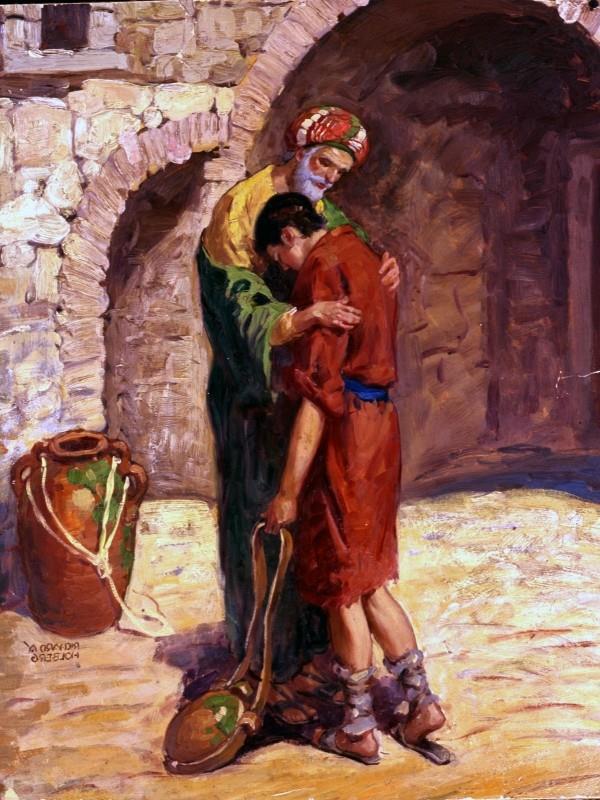
Philemon and Onesimus
Reflection 1
The following reflection was first published by the former Rector, Fr. McQueen, three years ago. I’m passing on a slightly revised version to you in its simplicity. I also have a few things more to say about Wisdom and Discernment, which run as a theme through the lessons for Sunday, as well, but important to add given an important Rector Search discernment meeting Saturday. That reflection is separate.
The second lesson for this Sunday, September 8, 2019, is St. Paul’s one-chapter letter to Philemon. Here we have an example of the radical difference faith in Jesus makes in our lives and in the world, in regard to a different way of thinking about things, and the resultant decisions made.
The subject of the letter is a man named Onesimus, a slave who had run away from his master Philemon, who was a friend and convert of Paul’s (a precious relationship to which Paul refers in the letter for emphasis!). Onesimus had made his way to Rome, where Paul was under house arrest. In Rome, under Paul’s spiritual instruction, he, too, had become a Christian. Paul is now sending Onesimus back with this letter-note, asking Philemon to forgive Onesimus and accept him back not as a slave, but as a brother in Christ!
While the world would have seen this as unthinkable, Paul has every expectation that his request will be granted because – although Paul says he could demand it as Philemon’s father in Christ -- he’s asking Philemon to see this through the eyes of Jesus, on the basis of agape love – the “God-action love” that God has for us all.
Paul alludes to this when he prays that Philemon’s sharing of the faith may become even more effective when he perceives all the good that we may do for Christ. The “world” tends to approach relationships from the perspective of justice, that is, the parties (sounds legalistic, doesn’t it) fulfilling their duties and obligations and having their rights and interests protected. And that’s good. However, it’s not ALL the good that we can do for Jesus, or for each other. As Paul demonstrates in his appeal to Philemon. In this literal circumstance we see the spiritual reality that when we show mercy, allowing our love to go beyond justice, relationships are transformed. Debts are paid, slavery becomes freedom, and bondage becomes brotherhood. This is in fact the basis of God’s Wisdom.
And let’s say it again, but more so, that it is critical to see that Paul doesn’t impose this on Philemon, but invites him to choose the greatest good, and offers to pay the debt himself, if that helps. Ah! This is exactly what Jesus has done for US, paying our eternal debt so that we can be generous rather than stingy with our brothers and sisters.
So, let’s make the application, shall we? Looking at our lives with the eyes of Jesus, are there any places where we’re holding onto the idea of justice when what’s really needed is mercy? We need to look for opportunities to make the same invitation, offering more than what’s owed or expected, whether that means forgiveness and mercy or just a greater love. That’s what it means to do all the good we can for Christ and it’s what will make our faith most effective when we share it.
Reflection 2
Your prayers are necessary, and they must be informed in faith
All Saints’ Parish is in prayer for the selection of a new Rector, while the Vestry is the Search Team, doing the work of reading, discerning, interviewing, making reference checks, conversing, and in prayer themselves. The lessons for Sunday (Proper 18C) are much about how that discernment is manifested as the obedient people of God. At the same time, perhaps, providentially, comes the following lesson appointed for Thursday in this week from the letter of James, chapter 3:13 through chapter 4:12.
It brings to the fore an important yet often overlooked aspect of Godly wisdom being sought by we followers of Christ. And that aspect is that wisdom, and discernment in the Spirit, are going to be by default, under attack by those spirits opposed to God. Its, literally, dangerous enough, as James denotes, that there is God’s wisdom (wisdom from above) and there is an earthly, unspiritual wisdom. While we are praying that we only act upon the wisdom from above, setting aside our own sinful desires, the attack is on to get us to see it as an opposite!!
This reflection then is an acknowledgment that the reading from James is hard stuff, uncomfortable. Certainly, the Vestry gathered is a gathering of men and women subject to these kinds of divergent wisdom. But also take note: that this group of men and women are people of faith in Christ, they have been diligent in their duties, and they are in prayer. I am quite delighted in their Search work. They are doing their part; and they have been doing it quite successfully. But we CANNOT let slide that the Enemy is sly and crafty, and he does not want the right Rector for All Saints!! So he will work to undermine such important meetings, and reflection prior to the meeting.
Please read the following in that light, and form your prayer for the spiritual protection of the Vestry members on Saturday, Sept 7, as they meet to choose who the Finalists will be. Add it to your Quadrena, which already has some element of this already. But bring that prayer you craft several times to the Lord.
Thank you,
Fr. Robert Eaton, Interim Rector
James 3:13 “Who is wise and understanding among you? By his good life let him show his works in the meekness of wisdom. 14 But if you have bitter jealousy and selfish ambition in your hearts, do not boast and be false to the truth. 15 This wisdom is not such as comes down from above, but is earthly, unspiritual, devilish. 16 For where jealousy and selfish ambition exist, there will be disorder and every vile practice. 17 But the wisdom from above is first pure, then peaceable, gentle, open to reason, full of mercy and good fruits, without uncertainty or insincerity. 18 And the harvest of righteousness is sown in peace by those who make peace.”
James 4:1 ”What causes wars, and what causes fightings among you? Is it not your passions that are at war in your members? 2 You desire and do not have; so you kill. And you covet[a] and cannot obtain; so you fight and wage war. You do not have, because you do not ask. 3 You ask and do not receive, because you ask wrongly, to spend it on your passions. 4 Unfaithful creatures! Do you not know that friendship with the world is enmity with God? Therefore whoever wishes to be a friend of the world makes himself an enemy of God. 5 Or do you suppose it is in vain that the scripture says, “He yearns jealously over the spirit which he has made to dwell in us”? 6 But he gives more grace; therefore it says, “God opposes the proud, but gives grace to the humble.” 7 Submit yourselves therefore to God. Resist the devil and he will flee from you. 8 Draw near to God and he will draw near to you. Cleanse your hands, you sinners, and purify your hearts, you men of double mind. 9 Be wretched and mourn and weep. Let your laughter be turned to mourning and your joy to dejection. 10 Humble yourselves before the Lord and he will exalt you.”
Father Robert Eaton, Interim Rector
|
RETURN TO TOP
“Social Grace, Kingdom Style”
This Sunday and Beyond - September 1, 2019
Get it in PDF form with calendar
We invite you to come to Church. You may sit in any pew. Please be prepared to have someone say to you, “Excuse me, I believe that’s my seat you are sitting in.”
I’ve actually witnessed it myself; I’ve seen it way too often happen like that. The leadership of a congregation will make the public invitation to “sit wherever you’d like”; the person who usually sits in that spot has not paid attention to the memorandum. Awkward moment. Sometimes made so embarrassing that you decide to leave or never come back to “such an unwelcoming congregation.” Mind you, there are plenty of other parishioners who would simply go to another pew being thankful for those new people sitting where they usually do. If you come, and that happens, please forgive that person who seems to be saying they “own” that seat; who knows what has already happened poorly in their life earlier that morning. And please realize that most anybody else who has just witnessed such self-serving entitlement will themselves be very embarrassed, and most likely say something apologetic before the morning is over.
In the good news reading from Luke on Sunday, you will hear a story about seating etiquette, and, of course, how Jesus intends that story as an object lesson to describe the workings of the Kingdom of God.
You can’t escape seeing the mastery of Jesus’ teaching throughout the four Gospels in regard to cultural etiquette and the Kingdom of God. Well, after all, he is God. But he is SO good at it. He see’s something (like I have and like we all may have), he gets poked by it (you might say irritated by what he witnessed) and then speaks up aloud to point out what happened, what should have happened, and how it is intimately tied in to the values, the priorities, and the mission of God, and of the those who desire to come into God’s presence.
And so many times he’s done it before you can say, “Where’s my wine?”
As we hear the story, though, we very quickly realize that he’s not talking to the Pharisee leader to whose house Jesus has been invited to have lunch. He’s not telling the host that he didn’t treat him (Jesus) right in where or where not Jesus could sit. He’s not telling the Pharisee host that all his Pharisee buddies he’s also invited to lunch are not treating others with hospitality.
So what’s the deal here? It’s actually a story pointed at the guests who have entered the dining hall and its about THEIR self-serving entitlement, and their risk of being embarrassed in front of everybody by choosing a seat at the table that implies they are more honored in the host’s eyes than what the host actually sees.
Jesus is going to teach them Kingdom etiquette (which they should have known already – it would be no secret from the scriptures), and he’s going to do it appealing to their own desire not to do something that could potentially be awkward or embarrassing for them.
Etiquette is a set of specific rules designed to ensure polite behavior in a group or within a culture. Part of being properly socialized within a culture is learning what that culture considers acceptable behavior in dining, conversation, and attire. SOUTHERN etiquette takes that concept and puts it on steroids; if you don’t follow “proper” etiquette you can often be ostracized.
I think Kingdom of God etiquette teaches us how to be more like Jesus. So, we do want to pay attention here. And what is that basis for Kingdom of God etiquette? Because as sure as anything, proper etiquette will be ultimately different between the Kingdom of this world, and the Kingdom of God.
In an interesting corollary to this story of a lunch, St. Paul says that the basic standard for Christian behavior is “So whether you eat or drink or whatever you do, do it all for the glory of God.” (First Corinthians 10:31) It is our Kingdom etiquette goal to honor the Lord in every way. Whether sitting in a church service, shopping at the mall, or working at our jobs, we can do so for the glory of God. When we carry the reputation of Jesus with us, our behavior affects the way others see Him.
Here’s the thing. The story we will hear speaks not of rude and uncivilized behavior, particularly, but the UNINVITED behavior of believing you are more “than that.” To honor the Lord so often means to humble ourselves.
You know, the folks who set up the luncheon Jesus attended could have taken care of this whole embarrassing kerfuffle if they had been organized enough to provide place cards with people’s names on them! But without the nametags, the Christian does the next best thing: they choose a seat far less in importance than they might possibly think that others might think of them. Its more than etiquette usually teaches: it is the will and the art of being humble. Of not honoring yourself; placing yourself less even if you ARE honored more than others! But certainly not to act like these presumptive guests.
Reminds me of walking in the woods and suddenly having an uninvited swarm of gnats and mosquitos flying around my head. They can come along if they like. But presuming to fly so close into my face and ears means hearing me tell them to move! Or be swatted. I don’t think they care. But WE are supposed to care about Kingdom etiquette, which does well – if not surprisingly – in our earthly social circles.
Jesus would teach that If you are to do all for the glory of God, then that displaces our own desire, even self-entitlement to receive our own honor and glory. Jesus lived it out. And he taught it about himself, “For even the Son of Man did not come to be served, but to serve, and give his life as a ransom for many.”
By the way, if you are coming to church for the first time, just ask the greeter or usher where to sit in a seat not already “claimed.” And they will smile knowingly and lead you in.
Father Robert Eaton, Interim Rector
|
RETURN TO TOP
“Will I be going to heaven?”
This Sunday and Beyond - August,25 2019
Get it in PDF form with calendar
Don’t tell me you’ve never asked that question before! You may have all the assurance of faith, all the confidence in the promises of God, all the hope in the Jesus who is the author and the perfecter of your Faith, all the ability in your spirit to know the difference between the foundation of the earth (which seems solid until the next earthquake hits) and the cornerstone of all creation, the foundation of the kingdom of God, namely, Jesus Christ himself. Yet despite that you still….and still have had moments of doubt and worry and lack of trust and rejection and personal betrayal (yours from others and yours toward others) that has brought that question into your mind, if only for a moment of personal pain. Or several seasons of a wandering soul.
The Sunday bible readings at All Saints’ Church for August 25, will not sound reassuring in that regard. And with that question running through our heads and hearts like the old “ticker tape” reporting the current status of our futures, we are not left off the hook of seeing our own hand in our own feared demolition. That is to say, we won’t be able to blame God if in fact we don’t get to heaven. We have readings from the Prophet Isaiah to hear this week, and from the Letter to the Hebrews, both of which have plenty of passages within them that speak not of the terrors of separation from God, but from the mercies of God providing a way to get there! But, really, how do we find comfort, if we do not know DIS-comfort?!
And lest you were waiting for the Gospel reading – the Good News from Jesus - to provide a safe haven from the fear of that question of entrance into heaven after the readings from Isaiah and Hebrews (as I mentioned in my sermon last Sunday) while shifting uncomfortably in our pew seats, the words of Jesus do not, in fact, let us off the hook.
So why would I want to go to Church to hear all that, and have that question of entrance into heaven be even deepened?? Because there is an answer and it is good news.
Like the people on Pentecost after hearing Peter preach, “all that” produces a question within our hearts that gets pointed in the correct direction. The question on Pentecost was, after being convicted of being complicit in the death of Jesus Christ on the Cross, “What then shall we do?” The incorrect direction is back into ourselves. Why? Because it was not you nor I or anyone before us who – by their power alone – created heaven and earth in the first place! As a result, it is not you or I who can provide salvation! So, the correct direction is back toward the One who made all things, and through whom all things were made, God the Father through Jesus Christ, and through whom we have an entrance into heaven.
The form of the question in Sunday’s Good News reading is good news then, at the least, because it is offered in the correct direction. And immediately upon hearing it read aloud it becomes the expression of the deepest concern of our hearts as well. Now we are highly expectant of the words of Jesus to the man, and to us. The man said to Jesus, “Lord, will those who are saved be few?” (You know how you ask a question about somebody else, but it’s really about yourself.)
So where is the Good News? Jesus will answer the man by saying, “Strive to enter by the narrow door; for many, I tell you, will seek to enter and will not be able.”
There are a few things that Jesus says here and will go on to say more of, that bring us to the Truth of us and heaven. One of those is that there is a lie out there – maybe in you right now - that we just need to live a good life, and that the difference between going and not going is dependent on how much good stuff we do or don’t do. Very dangerous lie. It’s not about not doing good, because we are in fact commanded to do good. The problem is thinking that I can get myself into heaven (or fail to) based on my own striving in my own work. The good news? It’s not about your ability or strength or savvy or self-qualification. You are not off the hook, and that is actually good news.
In the same sentence, though, is the good news that there IS a key to getting into heaven, and it is through Jesus Christ himself. In his answer (and all of his other teaching beyond this teaching) he says “I tell you.” This comes right in between his saying that there is a door, and that entrance is possible.
“I tell you” are the words from the one who is God -With- Us, that is, God has come to us because he wants us to get through that door! As the Psalmist said, “…because we know that God is on our side.” And as St Paul said in Romans 8, “If God is for us, who can be against us?” Jesus, saying essentially, “Here I am” and “Turn to me for the answer to your question”, this Jesus is the door and the entrance into heaven. Be in awe and trembling regarding the judgement of God, and turn that awe and trembling into trust toward your salvation and guide, Jesus Christ, the Son of God, risen from the dead, victor over life’s and heaven’s closed doors.
Yes, you may still have your moments of doubt. That’s because in this world, lies are rampant. Stand strong in your trust in Jesus Christ. And if you ever see the door shut before you, and you have believed in Him, then rebuke the illusion, and walk confidently with the Lord knowing the door is open.
Father Robert Eaton, Interim Rector
|
RETURN TO TOP
“Be on the God side of Fire and Division”
This Sunday and Beyond - August,18 2019
Get it in PDF form with calendar
Fire and division are the stark words from Jesus in Sunday’s Gospel (good news) reading in Luke chapter 12, verses 49-53. If you’ve just lived through a forest fire in areas where there are smaller communities (like Paradise, California), the concept of fire is immediately negative, destructive. Standing back from such difficult experiences and memories, we can see, though, that there are reasons that fire can be described as helpful, even necessary. Like on a very cold night, with no electricity, and you need warmth. Or when you are shaping iron.
The same thing is true of division. And sometimes the two can be understood in the same illustration or context. For instance, when purifying precious metals, fire provides the necessary melting so that extraneous minerals can be separated from the gold or silver you are smelting. And the end result is more “pure” precious metal, and thus more valuable.
The Bible contains the images of fire and division in both these ways. And that includes the reference to the Holy Spirit as fire for our lives, to live passionate and “on purpose” lives for God. God is also a demanding God, and so fire FOR US, and for His Church, also means constant vigilance for discipline to remain “on fire” for the Lord.
I am making use of a reflection provided by Dr. Scott Hahn as he ties together very quickly and succinctly some of these thoughts for our Sunday lessons.
“Our God is a consuming fire, the Scriptures tell us (see Hebrews 12:29 exactly as “for our God is a consuming fire”; Deuteronomy 4:24 also, “For the Lord your God is a devouring fire, a jealous God” ). And in this week’s Gospel, Jesus uses the image of fire to describe the demands of discipleship.
“The fire He has come to cast on the earth is the fire that He wants to blaze in each of our hearts. He made us from the dust of the earth (see Genesis 2:7) and filled us with the fire of the Holy Spirit in [his] Baptism (see Luke 3:16, [the baptism with which he baptizes, besides water baptism]).
“We were baptized into His death (see Romans 6:3). This is the baptism our Lord speaks of in the Gospel this week. The baptism with which He must be baptized is His passion and death, by which He accomplished our redemption and sent forth the fire of the Spirit on the earth (see Acts 2:3).
“The fire has been set, but it is not yet blazing. We are called to enter deeper into the consuming love of God. We must examine our consciences and our actions, submitting ourselves to the revealing fire of God’s Word (see 1 Corinthians 3:13).
“In our struggle against sin, we have not yet resisted to the point of shedding our own blood, Paul tells us in this week’s Epistle [to the Hebrews]. We have not undergone the suffering that Jeremiah suffers in the First Reading this week.
“But this is what true discipleship requires. To be a disciple is to be inflamed with the love of the God. It is to have an unquenchable desire for holiness and zeal for the salvation of our brothers and sisters.
“Being His disciple does not bring peace in the false way that the world proclaims peace (see Jeremiah 8:11). It means division and hardship. It may bring us to conflict with our own flesh and blood.
“But CHRIST is our peace (see Ephesians 2:14). By His Cross He has lifted us up from the mire of sin and death—as He will rescue the prophet Jeremiah (see Jeremiah 38:10).”
Dr. Hahn’s reflection is the classic teaching throughout the history of Christianity regarding Sunday’s words from Jesus. May you hear them again this week, and if not with us in Church, then perhaps on your own as you find time to read. And as you hear them and read them, may the Lord fill you with his Fire that you may love him and serve him without diversion or distraction!
Father Robert Eaton, Interim Rector
|
RETURN TO TOP
“Faith is not closing your eyes; Faith is seeing”
This Sunday and Beyond - August,11 2019
Get it in PDF form with calendar
Some very powerful scripture verses will fill the air on Sunday morning in All Saints’ Church during our 8am and 10:30am times for worship of the Lord God. You are certainly invited to join the parish as it gathers at those times.
The power scriptures are those that have to do with faith, with very familiar stories and instructions. All three of the lessons you will hear are about faith, both the faith that describes what we are doing right now, and the faith that we are asked to hold for things that haven’t yet happened – and may never happen in our lifetime!
I’m not sure which is the hardest, which is the easiest. One seems to be within our understanding of time, and one outside of our timeframe altogether.
Two of the most famous would be the promise given to Abraham, and about the second coming of Jesus. Regarding the promise to Abraham, Abraham received and held onto it by faith as God had said it to him. It wasn’t easy, and Abraham had at least two times of accepting advice to jump the gun, so to speak. But he was reminded, and it was made further clear, and he was on board.
For instance, from our first lesson, the one usually which is from what we call the Old Testament, we hear that at the encouragement of Sarah, Abraham caused a child to be conceived in her maidservant. The Lord’s response in specific was “...No one but your very own issue shall be your heir.” Which means between he and Sarah, to whom the promise was given as well, and no other woman. He brought Abraham outside and said, “Look toward heaven and count the stars, if you are able to count them.” Then he said to him, “So shall your descendants be.” And Abraham believed the Lord; and the Lord reckoned it to him as righteousness.
What happens next? Sarah will conceive at her “advanced” age, and she will give birth to a healthy baby boy, and they will name him Isaac. This was the physical, worldly sign of Abraham's willingness to believe, to have faith. But Abraham and Sarah would die before they saw the fullness of that vision word, countless descendants more than the number of stars in the heavens. But they still believed, even if they didn’t see it when they died. That’s faith, too. Faith in things that haven’t yet happened.
And so, we will hear the author of the Letter to the Hebrews say, “Now faith is the assurance of things hoped for, the conviction of things not seen.”
And then Jesus would bring it home as to our human emotional response when things haven’t yet happened,
"Do not be afraid, little flock, for it is your Father's good pleasure to give you the kingdom. [But STILL] "Be dressed for action and have your lamps lit.”
Would it be easier to believe Jesus would rise from the dead on the third day, like he SAID he would? Or to believe that - even though you don’t know when - he would be returning again? The first, our time, is something like, “Oh, that’s just impossible.” The second, God’s timing, is so often forgotten, or by impatience rejected.
Would it be easier for Abraham to believe that his wife of about 80 years of age could actually conceive, if they could even get that far? Or to believe that one way or the other God would provide countless descendants, never to be seen anyway?
And for Noah! Oh, man, there is some SERIOUS faith there.
Two things for your consideration:
The faith with which these men and women eventually responded to God’s promises was the very thing that would bring them into eternal life with God the Father in heaven. That faith “reckoning of righteousness” is exactly what God is looking for in each of us. He’s made infinitely clearer for us now by the promise that if we - You - would believe that Jesus is the Son of God, and is risen from the dead, then we too – You, too - will be ushered into eternal life. Wahoo! (you may translate that as “Alleluia!”).
The second thing is that you don’t have to be a Noah, or a Moses, or an Enoch, or an Abraham, or a Mary, the Mother of our Lord, or even Jesus, to prove such faith. The promise of God is a “now” time. And even the barest confession of believing in Jesus will mark you as an eternity-bound, faith-filled believer.
These moments in our time become the landmarks for the times of faith needed for the “God’s timing we can’t see yet” requirement of faith. Holding on to the faithful God we have NOW, will help utter our belief in the things to come, but that we may not see.
My advice is to fill your ears, your eyes, your heads, your hopes with things that God is doing NOW, so that you will have faith to hold onto the things to come. The easiest way is:
1) Read consistently the record of God’s mighty works in creation, and all along the way in the lives of men, women, boys and girls.
2) When you need help for an answered prayer, a healing, a provision of some sort, or maybe even a conception, your faith means asking God for it, and asking others to help you by joining their faith in God by agreeing with you for those prayer requests.
Whether for this “time” or for the “time to come”, “having faith” means not blindness, it means “seeing” what can be by trusting in God.
Father Robert Eaton, Interim Rector
|
RETURN TO TOP
“Seeking and Asking Is Always the First Step”
This Sunday and Beyond - August,4 2019
Get it in PDF form with calendar
In the Gospel reading for this coming Sunday at All Saints’ church (to which you are invited to attend) it’s hard to know for sure why the man interrupted Jesus’ teaching to the disciples. For sure, in my reading, it was not just because the stressed man with a family estate squabble said, “Hey, look. A rabbi. Let’s ask him to settle the issue for us.” The closest I’ve some to understanding the motive for the request is that the man had seen Jesus heal every sickness, cast out every demon, raise people from the dead, and utter unimaginable wisdom about life. And so, he could certainly arbitrate, like one of the Judges of Israel of old. That sounds good, doesn’t it?
Well, my attempts at deducing the man’s reasoning for asking is suddenly put to the side, because Jesus refuses to enter into the family squabble and instead uses the situation as an opportunity to teach about the seduction of wealth! Which, of course, in his inimitable way, is Jesus’ answer to the man, and to the man’s brother, regarding their family battle over their family inheritance.
If it had been me, realizing that a family inheritance squabble means that the patriarch of the family probably just died, I might have been tempted to shout back sarcastically, “So how’s your dad doing?” Good thing Jesus is Jesus, and you and I are not, eh?!
Back to Jesus, he goes on to share this famous parable about a farmer who has had VERY abundant harvests, has MORE THAN HE KNOWS WHAT TO DO WITH, and the solution that the farmer comes up with. The parable will end for us listeners with a wincing twist: the sudden death of the rich farmer and the story moral being about how much more he could have done with that richness besides put it under a bushel and look at it every once in awhile (and retire, and build a bigger pool).
Before we go on please note that the farmer has not gained his wealth illegally or by taking advantage of others. Further, he is not portrayed as particularly greedy.
Indeed, he seems to be truly surprised by his good fortune. This is not about GAINING improperly or immorally. This is about Kingdom stewardship. After all, what is wrong about building larger barns to store away some of today's bounty for a potentially leaner tomorrow? Isn’t that the nature of the dream given to Joseph in Egypt which got him the incredible position of steward of all Egypt??
But now we DO hear exactly THESE things in the parable:
First, notice the farmer's consistent focus throughout the conversation he has with himself: "What should I do, for I have nowhere to store my crops?" And he said, "I will do this: I will pull down my barns and build larger ones, and there I will store all my grain and my goods. And I will say to my soul...."
Self, self, self. As the parable portrays him, there is no thought to using the abundance to help others, no expression of gratitude for his good fortune, no recognition of God at all. The farmer has fallen prey to worshiping the most popular of gods: the Unholy Trinity of "me, myself, and I." This leads to, and is most likely caused by, a second mistake. He is not foolish because he makes provision for the future; he is foolish because he believes that by his wealth he can secure his future: "Soul, you have ample goods laid up for many years; relax, eat, drink, be merry."
The farmer is called "fool" not because of his wealth nor ambition but rather because he accords finite things infinite value. His plans for insulating himself, and living the good life on what he thinks is his grand ability and good business decision making, will now come up empty - which comes that very night! - it all proves inadequate.
What’s different than any of our modern strivings to provide and secure? Well, nothing.
Ultimately, nothing can save us from death, whether timely, or as in the parable, untimely. And, as the author of Ecclesiastes would make note of, once you are dead and gone you ultimately will lose control of all that you have gathered, no matter how good your attorney might be, and it will become subject to the mercy of the wisdom of those who follow you --- who weren’t the ones who made your money and built your silos in the first place.
Which should answer the question of the man asking Jesus about his family inheritance being divided.
br>
Why are you striving about something you didn’t have in the first place, you didn’t build, and you didn’t have control over? It is so difficult sometimes to deal with the windfall. And it is – as the parable pushes us to hear – a matter of faith and money in the same sentence.
Feeling bad at this point? Don’t be. That’s not the parable point. Certainly, we are asked to consider how and if we give thanks to God for what we have been given, even our very lives. But, you know, the further consideration for ourselves in reflection is not, "Is material abundance bad?" The answer is no. Because, in fact, many have been GIVEN abundance in order to do the right thing with it! But our reflection rather should be, "Is our material abundance sufficient to meet the weight of meaning, significance, and joy that we seek?" Can our wealth secure a relative degree of comfort? Certainly. Can it grant to us confidence that we are worthy of love and honor and in right relationship with God and neighbor? Certainly not. Only as we recognize that the gifts of ultimate worth, dignity, meaning, and relationship are just that - gifts offered freely by God - can we hope to place our relative wealth in perspective and be generous with it toward others. Look beyond yourself, trust in God, do the right thing.
Father Robert Eaton, Interim Rector
|
RETURN TO TOP
“Seeking and Asking Is Always the First Step”
This Sunday and Beyond - July 28, 2019
Get it in PDF form with calendar
Seek ye first the kingdom of God, and His righteousness /
And all these things shall be added unto you /
Allelu, Alleluia.
So goes the first verse of a “scripture chorus” written in 1971, written by Karen Lafferty. I think I heard it first around 1975, and started playing it on my guitar immediately. Simple, classic, worship-flexible, lyrics straight from the Bible. It got included in the Episcopal Hymnal 1982, which just goes to show someone’s good taste in classic music of any genre being made available for our worship.
Karen Lafferty, both composer and text author of “Seek Ye First,” was born in Alamogordo, New Mexico in I948. She earned a Bachelor of Music Education at Eastern New Mexico University in 1970 and alsohad additional private study. In 1971, Lafferty decided to change her career path; she became worship leader and concert artist at Calvary Chapel, Costa Mesa, California. In 2006, Eileen Johnson interviewed her after she had returned back to New Mexico after 20 years in Amsterdam with YWAM (Youth with a Mission) training Christian musicians how to be on mission with their music.
I’m going to share some of Karen’s story with you because there is an important witness about the matter of prayer. Of course, the song – straight from the scripture reading that will be heard this Sunday at All Saints’ Church, to which you are invited to attend at either 8am or 10:30 am - speaks to the matter of prayer which Jesus has been taking a good deal of time to inform his disciples about. The second verse of the song, which was added later, includes the iconic tri-phrase, Ask, Seek, Knock. There’s an important part of Karen’s story which helps us to see a bit that when Jesus was teaching his apostles and disciples about prayer and its power and purpose, he was absolutely serious about making the application! Scripture teaching from Jesus – or any part of the bible – about prayer is intended to inform our own prayers, or even get us praying in the first place. But always with this important message: God hears, and God answers.
Here is that interview portion. See if you can pick up on the part I was referencing:
“The next part of her story sounds a bit like a fairy-tale: Feeling a call to live what she believed, Karen Lafferty left her job as a [secular] entertainer to devote her life to full-time Christian service. In 1971, while in the midst of struggles to pay her monthly bills, she attended a Bible study that coincidently was based on Matthew 6:33, “Seek ye ?rst the kingdom of God . . .” She went home, picked up her guitar, and set the words to music. First published by Maranatha! Music (which was a ground-breaking mission venture by Calvary Chapel to provide “contemporary Christian music”) and recorded on its Praise album (1972), “Seek Ye First” launched Lafferty into fulltime music ministry.”
She made the move back to New Mexico and Santa Fe in 1995 in order to care for her ailing parents. She moved the HQ for her Musicians For Missions International (MFMI) to Santa Fe, and has continued to teach and perform. The royalties from those early massively popular songs continue to provide a considerable portion of the support for her missionary work and leadership training.
What was that portion I wanted you to find? Her struggle with her bills was in the context of her struggle alone. Jesus teaches us to not fear but to put our trust in God. The scripture from Sunday’s Gospel says that clearly: Ask and it shall be given unto you, seek and ye shall find, knock and the door shall be opened unto you. Alleluia!
One of the most important aspects of Jesus’ teaching on prayer, taken all together, is that even though Jesus does teach us a formulary, and an order of prayer, as he taught his disciples the Lord’s Prayer (that’s all part of Sunday’s readings!) he also made this very clear, that the first thing is not establishing a format but to come to the Lord. Between Him and You, real, tangible answers to your dilemmas and concerns, not to mention your praises and thanksgivings, will be given! Allelu, Alleluia!
Father Robert Eaton, Interim Rector
|
RETURN TO TOP
"You Are Called To Set People Free"
This Sunday and Beyond - July 14, 2019
Get it in PDF form with calendar
A friend once asked Isaac Rabi, a Nobel prize-winner in science, how he became a scientist. Rabi replied that every day after school his mother would talk to him about his school day. She wasn't so much interested in what he had learned that day, but she always inquired, "Did you ask a good question today!" "Asking good questions, Rabi said, "made me become a scientist." Another Nobel winner said this: ”You can tell whether a person is clever by his answers. You can tell whether a person is wise by his questions." The Philosopher Voltaire said: "Judge a person by his questions rather than by his answers."
On one occasion an expert in the law stood up to test Jesus. "Teacher," he asked, "what must I DO to inherit eternal life?" If we were to judge this expert in the law by his question, we would be deceived. He was not seeking to discover some profound secret about life. He was not even trying to discover the way to God. His purpose was to test Jesus, to trip him up, to lead Jesus to discredit himself by giving some unorthodox answer that would arouse the people against him. Still, Jesus used this experience to open the door of life for all who would enter.
Actually the expert in the law asked Jesus two questions. Let's deal with the first question: "Teacher," he asked, "what must I do to inherit eternal life?" Note, first of all, that the lawyer's question stressed doing something. "What shall I DO to inherit eternal life?" What good action could he take to insure that God would accept him? It is evident that he had no concept of the part that God's love and grace played in the process of salvation. He simply wanted to know if there was some act he could perform that would guarantee that he would be accepted behind the pearly gates.
He's no different from many of us. We, too, want to make sure we meet the minimum standards. Believe in Jesus? Check! Been baptized? Check! Show up in worship at least on Christmas and Easter? Check! Nothing profound here, the man wants just to make certain he's touched all the bases. But note how cleverly Jesus leads the conversation to open the man's eyes to new realities.
First, he shows this lawyer that he already knows everything he needs to know to find life. He's an expert in the law. Everything he needs is contained in the law of Moses.
What is written in the Law? Jesus replied to him. "How do you read it?"
Everywhere he went this expert in the law carried with him a little leather box called a phylactery. Several passages of Scripture were in this phylactery, two of which were Deuteronomy 6:3 and 6:11. These are the two verses which he quotes in response to Jesus question. The expert in the law answers, "Love the Lord your God with all your heart and with all your soul and with all your strength and with all your mind, and love your neighbor as yourself."
"You have answered correctly." Jesus replies, "Do this and you will live.”
What did Jesus mean when he said, do this and you will live? The lawyer was already alive physically. Was there more to life than what he was experiencing? Was he missing something? Is there an aliveness that goes beyond simply existing? The lawyer had never heard or maybe just missed what Jesus was teaching about this kind of living. Jesus promised, "I have come that they might have life, and have it abundantly" (John 10:10. RSV) To find Christ is to become ALIVE, with capital letters-both in this world and the world to come.
From Jesus’ answer to the lawyer it is clear that new life is possible through the power of love for God and love for neighbor.
This coming Sunday during my Sermon I will explain more about this kind of love and how Jesus made it very clear to our lawyer friend that we, too, can have this love and be with God eternally.
God loves all of you and what a fantastic gift he gives to each and every one of us. Hope to see you Sunday,
Always in the love of the Lord,
Father Sanders+
|
RETURN TO TOP
"You Are Called To Set People Free"
This Sunday and Beyond - July 7, 2019
Get it in PDF form with calendar
It is early, the morning of the Fourth of July as I write this reflection for the upcoming Sunday (July 7, 2019). I am reminded that the dawn of liberty in so many nations and individuals has been described as the light piercing the darkness. Of course, darkness is first. And there is struggle. And then, hopefully and prayerfully, there comes liberty.
Jesus came into the darkness as the Son of God and the savior. And he provided, and still provides true liberty. As we follow Jesus, believing in him and relying upon the power of God that he provides, we also should see liberty provided for others. Certainly, this liberty and freedom given to us should not be shelved, or brought out once a year in memoriam. That only provides a static sense and awareness of this liberty, this truth, that sets us free! Once static, then malaise.
Jesus knew the value of maintaining the momentum of setting people free from whatever caused them to be in bondage. He also knew that the matter of Eternal Liberty had to be evident when he was no longer roaming the earth going from village to village, teaching and preaching, and setting people free.
Part of that solution would be the coming of the promised Holy Spirit, poured out upon all the existing apostles and other disciples at that moment when it happened on Pentecost, and then the CLEAR expectation of that same action of the coming of the Holy Spirit upon each and every NEW disciple.
But while Jesus was still here, feet on the ground, so to speak, he provided the ministry expansion solution of what we might call “delegation of authority.” But, Holy Mackerel, what delegation and what authority it was!!
In Sunday’s Good News (Gospel) reading according to St. Luke, chapter 10, we will read that Jesus sent out 70 - NOT 12, but SEVENTY – disciples to go prepare his way into at least 35 villages. I say “35” because he sent them out two by two, and half of 70 is 35. But more than just logistics teams, he gave them authority to heal people, and to cast out demons who had possessed people.
In fact, the basis of this authority was not them; it was about him. We are told he said to all of them, “"Whoever listens to you listens to me, and whoever rejects you rejects me, and whoever rejects me rejects the one who sent me."
That is the basis of the liberty, the freedom, that God the Father, through his son Jesus was offering. It’s not a “free” freedom. Our Truest Liberty will only come as we believe and follow the Lord Jesus Christ.
The follow-up to this delegation of authority and sending out tells us that this solution for extending the liberty and freedom found in Jesus Christ actually worked! It is a scene at the end of Sunday’s Gospel that reminds me of that light breaking through the darkness, the piercing of static gloom and dis-ease. It is the celebration by the disciples of seeing THEMSELVES as the agents of this very liberty as people they ministered to were set free.
The seventy returned with joy, saying, "Lord, in your name even the demons submit to us!"
Jesus then instructs them to see that his delegation to ministry light into the darkness was not about “their” power. It was about setting people free, now. It was about that other person, then, finding the power and grace and love and liberty of Jesus brought to them, and for them to receive and be set free.
And it was a warning of sorts, that while ministering in power (which is good and holy), if it becomes only about the power, then they risk losing track of their own freedom in Christ. So, at the end of the reading on Sunday we hear Jesus saying to them, “See, I have given you authority …over all the power of the enemy; and nothing will hurt you. Nevertheless, do not rejoice at this, that the spirits submit to you, but rejoice that your names are written in heaven."
Liberty, it seems, begets liberty in the Kingdom of heaven. And proper rejoicing in this light is because freedom has been acquired! So, while you are ministering it in Jesus’ Name, do not lose your own by only valuing the authority in Christ expressed through you; rather, rejoice in the highest priority of being set free in Christ, yours, and theirs.
Father Robert Eaton, Interim Rector
|
RETURN TO TOP
“Power from on High”
This Sunday and Beyond - June 30, 2019
Get it in PDF form with calendar
People actually turned away from Jesus? That’s what we hear about in Sunday’s Gospel reading from Luke’s account (June 29, 2019). Incredible.
After all he had done already? And the thousands and thousands of people who had already benefitted from his power ministry of healing and exorcism and resurrections?
What in the world?! What could possibly keep them from turning to Jesus? Really? Being face to face with Jesus and then turning their face away from him?
Yes, these were of a Samarian village, and many people in bible studies will make much of the Samaritans having nothing to do with Jews. But not so fast: that was NOT the case with the people in that different Samaritan village from which came “the woman at the well.” They heard her testimony, and invited Jesus to stay longer with them. And he did many powerful works there. They turned their faces TOWARD him, not away. So that Samaritan vs Jew argument won’t work here.
You know, there have been many, many famous Christian leaders over the 2000 years (approximately) since Jesus rose from the dead who spent much of their early lives turned away from Jesus. Why? Were they secret Samaritans, or was there something else going on in their lives causing them a fear of the face to face?
And what brought them around?
One of the most famous was Augustine, from the North African town of Hippo. We know of his story because he wrote about it. Of course, one of the key elements in his story of eventual conversion was that someone close to him had been praying for him relentlessly. Talkin’ bout his mother, Monica! This truly was a woman of virtue. She suffered greatly because of her husband’s adulterous relationships. And her son was eventually following early on in his father’s footsteps. She was not about to let that happen, if her prayers to God had anything to do with it.
One of the other lessons for Sunday, from St. Paul’s letter to the Galatians, may actually give us an answer to the Samaritan refusal to receive from Jesus, as well as give a glimpse into the very things that Augustine says got in the way for him (and for which his mother’s prayers helped clear the way to his new life in Christ).
Paul wrote that we need to “Stand firm”, and to not submit -- again -- to the yoke of slavery. He’s talking to those who were already Christians. Which means that whatever this slavery is all about, it is something that has the ability to come around and get us all shackled up AGAIN. I think that a lot of people struggle with Christianity because they just don’t see freedom and slavery at work in their lives, at least not for what they really are.
I think a lot of people start to tune Paul out when he says not to gratify the desires of the flesh and then lists them. I think a lot of people tune out Jesus even if he they hadn’t heard a thing he taught about, because they already have an interior conviction of what is bad (immoral and sinful) in their lives, and that Jesus represents a challenge to such. And listening to Paul talk makes us all uncomfortable!! And it seems no one is left out of his list. Take “pleasure” as an example: Years of hook-ups and casual relationships don’t actually make you an experienced lover (don’t you know!), but make it more difficult to experience true love at all. Love is a decision to make your life totally about another person, not a magic spell that somehow turns a selfish person selfless. Oh, there is no doubt that love and pleasure can go together, and the bible does not deny such (just read the Song of Solomon). BUT, in fact, the more you EQUATE love with pleasure, the more you numb the desire for the real thing and then leave yourself unable to live into that kind of relationship when you want to. It feels like freedom in the beginning, but ends in slavery, which is why so many marriages fail and people that are never alone can be the loneliest.
The trouble is that we usually can’t tell the difference until we start to feel the chains of our freedoms. Or, if not left to our own demise, if when we hear the teaching and preaching of the Good News of Jesus Christ, and the Holy Spirit convicts our hearts and minds of what road of deception we have been heading down, and we turn our face to Christ.
This was in fact St. Augustine’s experience. By the time he realized that he wanted the love, joy, peace, patience, kindness, goodness, faithfulness, gentleness, and self-control that Paul tells us is the fruit of the Spirit, his life had already been heading in the opposite direction for a while. Even though it would take years to be free enough to live the life he wanted (years covered in prayer by that virtuous mother of his), the good news is that God began working in Augustine’s life immediately. He gave him a growing awareness of his bondage to loosen the chains and taste of his freedom to encourage him, until finally Augustine was able to walk out of the prison he’d spent so many years building.
What about devotion to Jesus feels like slavery to you? What are the freedoms that you think he would be denying you? Be honest and bold in asking, because if your freedoms are really slavery, there’s no point in making the walls of your prison thicker by pretending they’re not. Before it is too late, let Jesus Christ break your slaveries, and set you free to serve him in great thanksgiving and praise.
Father Robert Eaton, Interim Rector
|
RETURN TO TOP
“Power from on High”
This Sunday and Beyond - June 23, 2019
Get it in PDF form with calendar
On Sunday, June 23, our parish will commemorate Corpus Christi. No, not the town in Texas, but that for which the town in Texas was named: The Body (corpus) and Blood of Jesus Christ (Christi).
From the age of 16, Juliana of Liège (1193-1252), recurrently received the same vision when she knelt in prayer: A brilliant moon continually appeared before her with one small portion obscured and invisible. St. Thomas Aquinas was living then, and so was King St. Louis, but God chose neither the learning of the one nor the royal power of the other to be the means of bringing forward His desire for the Church to finally bring forward such an important devotion.
So it was that in the 13th century when Our Lord chose that the devotion to the Real Presence in the Body and Blood of Christ should be instituted, He had recourse to a simple nun in a vision. It was a persistent vision, even peskily so, that Juliana, in the Augustinian canonry of Mont Cornillon, tried in vain to chase it away. Finally, Our Lord Himself came to explain it to her.
He said to her it was to show that the liturgical year of the Church would remain incomplete until the Blessed Sacrament had a feast of its own, and He wished it to be instituted for the following reasons:
First, in order that correct doctrine of the One Holy Catholic and Apostolic Church might receive aid from the institution of this festival at a time when the faith of the world was growing cold and heresies were rampant.
Second, the faithful who love and seek truth and piety could draw from this source of life new strength and vigor to walk continually in the way of virtue.
Third, irreverence and sacrilegious behavior toward the Divine Majesty in the Blessed Sacrament might, by sincere and profound adoration, be extirpated and repaired.
Then He told her to announce to the Christian world His will that this feast should be observed by all.
We have seen this kind of interaction before in the Christian and Jewish record of God’s revelation to certain individuals. And in the same way as so many others (like Moses, Isaiah, Ezekiel, Mary, even Peter) Juliana the nun was fearful, and her immediate response was to beg Our Lord to be released from the charge. Our Lord answered her that the solemn devotion which He ordered to be observed even though it was to be begun by her, it was to be received and spread especially by the poor and lowly.
What does anyone do when they have been impressed with an important piece of information, or to propagate a new way of thinking or living for more than yourself? Very few of us would just jump right out there and get it going. The rest of us will hold onto it; perhaps for “more information”, or just to see if it will stick around for awhile and then promise to get started talking about it, or like the man of one talent, bury it! Well, in the case of Juliana, she kept the whole thing secretly in her heart for twenty years; she dared not reveal it to anyone, and yet an interior impulse urged her on so that she could not forget it. As one biographer stated it, “So terrible was her repugnance for the mission assigned to her that she shed tears of blood over it.”
She finally told her spiritual director, a priest who would eventually be elected Bishop of Verdun. Yes, this is the same Verdun in France which, almost exactly 700 years later in 1916 would be the epicenter of the disastrously costly Battle of Verdun. The Battle in WWI is somewhat illustrative of the battle within the Church in the 1200’s to have this feast day of Corpus Christi accepted. Eventually, that same spiritual director, then elected Bishop of Verdun, then Patriarch of Jerusalem, and then elected the Pope (Urban IV) would settle the matter and provide the authority for the entire Western Church to commemorate on a feast day of its own, the Body and Blood of Jesus.
As you can imagine (and this is well before the Reformation of the 15th century) the primary argument by the educated clergy and monks of the day was that the Daily Sacrifice of the Mass (Holy Eucharist) was sufficient to commemorate the love of Jesus in the Blessed Sacrament - without a special day being particularly assigned for that purpose.
I happen to liken this argument to the kind of argument that might say birthdays are unnecessary as long as the person celebrating is still alive!
Because there was so much upheaval within the Church – and continuing political and civil unrest engendering armed conflict continued to follow her, even if not necessarily about her – she had to flee from place to place. You could say the spiritual battle to keep her quiet was great, and intense.
Finally, she took up residence in the Cistercian Abbey at Salzinners, and then at Fosses-les-Villes, where she lived in seclusion until her death. Yet no earthly troubles could make her forget the task that Our Lord had assigned her. She died before the feast day had been accomplished, yet she had done enough in her lifetime to share the vision. In her wanderings, she had met with a few men with devotion and learning to defend the feast of the Blessed Sacrament and they helped to spread the devotion, especially among the simple people. And, finally, with Pope Urban’s declaration in 1264, the task given by Christ to Sister Julian was fulfilled.
One thing we learn, if nothing else, that if the Lord Jesus Christ should give you a vision to share—even if you are shaking your head that that might even be possible, or even if you struggle with whether it was from God, or just your imagination – then do what I have learned to do:
1) err on the side of sharing what you have received (try not to bury it), and
2) start sharing it by talking with a trusted, spiritually mature member of the Body of Christ.
Father Robert Eaton, Interim Rector
|
RETURN TO TOP
“Power from on High”
This Sunday and Beyond - June 16, 2019
Get it in PDF form with calendar
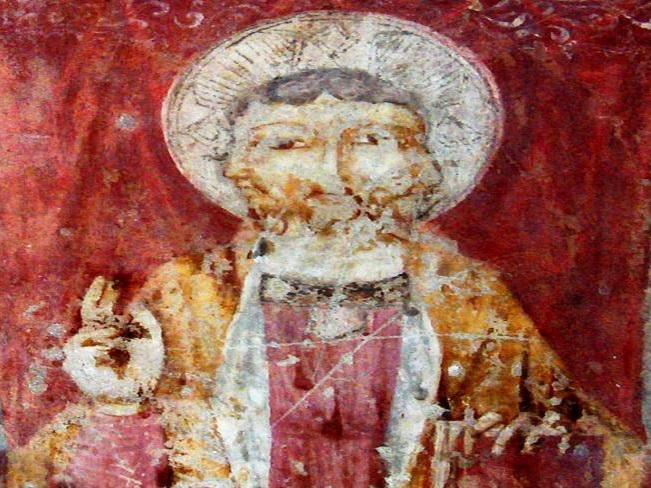
This 13th-century fresco in a church in Perugia, Italy, depicts the Trinity as a being with three faces representing Father, Son and Holy Spirit.
Let’s get right to it, shall we?
Understanding the doctrine of the Trinity is not easy at all. Its not that God went about developing a doctrine for the purpose of causing so much head scratching. And certainly, the God of All Heaven, the Great Creator of all things, the Almighty and All-Holy One, who is faithful in revealing Himself so that we might know Him, is not in the business of concealing. Sometimes He has, yes, as in not revealing the mystery of all time, the incarnation of the Word of God until it was the perfect time. But His very identity is not meant to not be found. “I have come so that you may see and believe.” So, that’s not it.
It’s more like this: the Trinity, or the Holy Trinity, refers to who God is. We say “is” because Trinity refers to the very “being” of God. And once we are talking about the being of God, we suddenly realize it is not a simple task. For one thing, the Bible has so many, many ways to talk about God – His identity, His being, His purpose, His Life, His power, His LOVE, His quiet, His Loudness, and His Holiness – His Otherness. Just reading the scriptures alone it is a monumental task to describe who God IS and help others understand. Biblical scholars and theologians come in real handy at this point.
For one thing, from this biblical perspective, we hear the Name of God being spoken in terms of “who He is”, and that is YHWH, pronounced usually, as Yahweh (the 17th century King James Version printed it out as Jehovah). The bible relays God’s meaning of this as “I am who I am”, or “I will be who I will be.” And then in the New Covenant with the Son of God, The Word, having been revealed, and known as Emmanuel (God-with-us), and even Jesus’ Name (Y’shua; Joshua: one who saves). And we’ve only scratched the surface, so to speak.
Names we can kind of begin to get. After all, you have a name. And a last name can get us looking at where we have come from genetically.
But when we add in this concept of each of the three persons of the Trinity, who each are called by Name, then it gets a little more difficult. And then trying to conceive of how these three persons, each with names, is only One God……well, maybe we just call it a “mystery” and call it a day.
I’ve come to think that one of the reasons it may be so difficult to really understand what it means for God to be Trinity, is because we have such a hard time simply trying to figure out who WE are. On this Sunday, try your hardest to listen and comprehend the language being used to describe God as Trinity. It is not easy, and never has been since the early Church began to realize this identity of God. But let’s go at it in a different direction. Your hard work in this, along with your worship of the Tri-une God may actually assist you in understanding more of your own “being.” And why would that be? Because we are made in the image of God.
You and I may have been named for a whole host of reasons. If we were to talk about YOUR “being” – who you “is”, if you will -- we won’t be able to simply describe you as “a baseball player”, or “a mother”, or “a father”, or “a priest”, or “straight”, or anything else as if that were the core of who you are, your “being.” Yes, sometimes those things are so very strong in you that you might FEEL it is your very being. But they are simply things “about” you. As much influence as a name can have on an individual and their future, it is still not a person’s Being (God’s describing himself by his name is different).
But we are created in the image of God, and we can see in ourselves something of this being of God called Trinity. You and I have a body, we have a spirit, and we have a soul. If we were to lose one of those, we would no longer be alive. We can talk about each, but they cannot be separated from who we are. One of the disciples’ first inklings of what this meant in terms of God is when Jesus said, “I and the Father are One. If you have seen me, you have seen the Father.” As well, the Holy Spirit is often described as the Spirit of Jesus, and the Spirit of God. You can see them, even “touch” them, but you cannot separate God out of His very being. And the same way with us, whereby you cannot simply say that my human trinity is simply facets, “faces”, of something deeper. No, more than facets. Distinct parts. And now you know why it is so difficult to describe the identity of God in terms of Trinity.
It is very important to try, though. It will help us understand more of who God “is”, and thus it will help us understand more about who we “is.” And as the bible points out, our understanding will always begin and end as we come and worship Him.
Would you like to know more about God and who He is, in His Being? To start, then, Come and Worship. Bring your thanksgivings. Hear God’s holy Word. Pay attention to the lyrics of the hymns. By getting to know who God is more and more, you will find a new path being made open to you for you to discover your own self.
Father Robert Eaton, Interim Rector
|
RETURN TO TOP
“Power from on High”
This Sunday and Beyond - June 9, 2019
Get it in PDF form with calendar

The Ascension of Christ by Salvador Dali 1958
Pentecost. It is a primary and functional centerpoint for the whole Church, the complete body of Christ. But it is not always adhered to. And so it is something of a litmus test for me regarding the clergy of the Church. How any one ordained deacon, priest or bishop (or lay teacher) uses an illustration to illuminate what happens at Pentecost is kind of "make it or break it" for me.
For Pentecost 2 years ago, in 2017, Father Stephen L. Schuneman, wrote the reflection for All Saints'. He did an excellent job with that illustration and I want to share it with you this year, 2019.
One illustration is usually less than necessary, so I've included a new one of my own. One or the other, or both, the point is to get the power. And God is offering it. Just ask.
"Suddenly our house was silent, and that’s not a good thing. I looked over at the clock on my dresser and saw nothing. The screen was blank which meant the power had gone out. This has happened before, in fact, it has happened several times recently without warning. The mobile home park where we live has had an electrical problem for some time. Old wiring has led to frequent power outages.
There isn’t much to do when that happens, just keep the refrigerator closed and wait for them to fix the problem. Truthfully, in those times I tend to take a nap, in hopes that it will be a short outage. I can’t do anything that requires electricity, unless it’s battery powered, like my iPad. I’m always amazed at how much I rely on things that charge up.
That makes me think of Pentecost. Right after the Ascension of Jesus into heaven, I imagine that the disciples felt the power had gone out of the church. They had looked to Jesus to give them energy and direction. They watched in awe as Jesus left them, ascending into heaven. Angels in white robes spoke to them saying, “Men of
Galilee, why do you stand looking up toward heaven? This Jesus, who has been taken up from you into heaven, will come in the same way as you saw him go into heaven.”
What are you standing around for? Because it was one of those interim times when it seemed that the power had gone out. They didn’t know what to do because it was as if the power had been drained out of them. I understand this, it was like my experience at home. Everything was silent, nothing worked, so save the perishables.
But that interim low was not even half the story. The disciples returned to Jerusalem and devoted themselves to prayer. They knew that something was coming. The “power from on high” (Luke 24:49) that Jesus had promised when he ascended into heaven. Pray and wait.
On the day of the Pentecost that prayer was answered, and they received more than they could have imagined. It is described so powerfully in Acts 2: “ When the day of Pentecost had come, they were all together in one place. 2 And suddenly from heaven there came a sound like the rush of a violent wind, and it filled the entire house where they were sitting. 3 Divided tongues, as of fire, appeared among them, and a tongue rested on each of them. 4 All of them were filled with the Holy Spirit and began to speak in other languages, as the Spirit gave them ability.
The power is on. Jesus has risen and ascended into heaven, and the church is alive with him. Called the Birthday of the Church, Pentecost is the lights coming on, and the Spirit of God present and overflowing among the disciples."
The other analogy is the credit card or debit card that is already yours from a valid bank or other institution. All the power for financial purchases is in that card. But one thing remains.....you have to call the phone number on the adhesive notice to have the card "activated."
Realize and recognize what has been provided for you to do in ministry, and ask God to give it to you. Then do like the disciples; expect the Holy Spirit to show up with power in your life, and ministry will follow.
Do it now.
Come Holy Spirit.
Father Robert Eaton, Interim Rector
|
RETURN TO TOP
“Trust in Jesus”
This Sunday and Beyond - June 2, 2019
Get it in PDF form with calendar

The Ascension of Christ by Salvador Dali 1958
This is the week of the Ascension of Jesus. We will have celebrated that event at 6:15pm on Thursday, May 31, and in its own way, on the following Sunday, June 2, 2019. The Feast of “Jesus Being Carried Up” in the bible is identified as 10 days before the Feast of Pentecost, which is always seven Sundays after Easter. With such chronological certainty in the Holy Scriptures the Church has followed suit, and the 2nd Thursday before Pentecost is always Ascension Day.
I’ve always appreciated Salvador Dali’s depiction of the ascending Jesus into heaven, because I think it adequately shows the way the Bible story describes the apostles as they watched Jesus rise up off the face of the earth and into the clouds above. In the painting you see the soles of Jesus’ feet!
When someone walks away from you, or drives away, or climbs a ladder and you are holding onto it for safety’s sake isn’t that the same view?
And much more emotionally pulling, when someone you care for deeply departs from you, either from a break up, or by deployment, or by any other separation, isn’t that quite often the same kind of view? Not a tableau, carefully crafted to show all things, but more the backside of someone, or the leftover of someone?
Certainly, as we have been hearing through the second half of the Easter season especially, Jesus has been preparing his apostles for just such a moment of his departure from them. And in a grizzly manner; but with hope for them that they will see him again, even if briefly. And so he’s been prompting them to do what he has commanded in order to Remember Him, not just his soles nor his backside, but his face, his teaching, his presence. And that is to lift up bread and wine as His Body and Blood, every time of gathering in His Name. And he has said it will be, in fact, His presence in that bread and wine, now his body and blood.
And the other thing to do to show our desire to love Him as he walked the face of the earth, and now as he sits on the throne of the Lamb in heaven, is to show love for each other.
This whole picture of the Last Supper and of the Ascension needs all four gospels, all four narratives of the Good News of Jesus Christ. But there are only two that speak specifically of that moment of his final blessing and being carried up. Those would be Mark, and Luke.
Here is Luke’s telling of it:
“Then he led them out as far as Bethany, and lifting up his hands he blessed them. 51 While he blessed them, he parted from them and was carried up into heaven.[i] 52 And they worshiped him, and[j] returned to Jerusalem with great joy, 53 and were continually in the temple blessing God.”
Beyond these two Gospels, Luke is unique in that after his Gospel ends with the Ascension, we can then turn to his sequel, the Acts of the Apostles. So not only does he write the Good News of Jesus Christ, he then writes what could be called the Gospel of the Holy Spirit, carried out from Pentecost through the earliest history of the Church, empowered by the Spirit. And the hinge event between the two volumes, is the Ascension of Jesus. The reason, he tells us in the opening verse of Acts, is that his first book dealt with all that Jesus began to do and teach until his Ascension, making clear that what would follow were things that Jesus, through His own Spirit, had continued to do since.
With that in mind, the continuity of Jesus, wouldn’t you want to put all your trust and faith into the life of this Jesus who may not be physically present like he was, but true to promise, is still with us always? Yes! And its because He is alive. He is risen from the dead.
This Sunday, the Seventh Sunday of Easter (or the 6th after Easter), falls right in the middle of this transition, where Jesus goes from acting through his own physical and historical body on earth to his mystical body, the Church. This is why in the gospel lesson Jesus prays not only for he union of the disciples with him and the Father, but with each other, so that through them everyone might know that the Father sent Jesus out of His Love for the world.
That means that Jesus has prayed for you! And, as we learn from the Holy Bible, Jesus is still praying for you, as is his Spirit. If you have not yet, do as he has asked: repent of any departure on your own from his ways and commands; and believe in the risen Lord Jesus. He will not leave you, ever.
Father Robert Eaton, Interim Rector
|
RETURN TO TOP
“Trust in Jesus”
This Sunday and Beyond - May 26, 2019
Get it in PDF form with calendar
We are coming closer in our weekly celebrations of the Easter season to the moment when Jesus Ascends, and then the feast of the Holy Spirit, or Pentecost.
As a result, the Sunday gospels focus more and more on two themes: the departure of Jesus, and the coming of the Holy Spirit as the very presence of God in the whole world. In this Sunday's gospel lesson (May 26, 2019) from John's account of the last supper, also known as “The Last (or Final) Discourse,” Jesus tells the apostles that if they love him, they'll keep his words. He says this not to lean on them or put pressure on them, but so that he and the Father can "make their home in them." And at the same time, making use of a very familiar phrase, he tells them to choose to not be afraid as he makes his departure. The phrase is, “Do not let your hearts be troubled. ”A little reflection will remind you that this is one of the phrases from one of the most common scripture lessons read at funerals. “I go to prepare a mansion for you”, is the other part of that phrase. This section of scripture read at funerals is actually from this same Gospel, this same Final Discourse, and spoken only moments earlier to the same apostles. In other words, Jesus says it once, and then says it again (and again). This is the grieving part of what the apostles and all the disciples will go through when Jesus departs in his Ascension into heaven. “Do not let them (your hearts) be afraid”, is the following phrase from “Do not let your hearts be troubled.”
That is so difficult to do, even as an act of will, when someone has died, and you see their coffin being placed into the earth. Is Jesus saying that you can WILL your way out of a natural emotional response to death and departure? It is, of course, possible to let ourselves be “stuck” in grief and not give ourselves the permission to
bring closure to a loved one’s life and presence in ours. Sometimes we end up finding unhealthy patterns of behavior to compensate for that lingering grief, which can end up in addictions. On the other hand, we sometimes will beat ourselves up for thinking that we are being too selfish with our feelings of grief if WE think they have lasted too long, or if our acquaintances and even friends ask us why we’re not “bouncing back.” This is a generalization as an average done by therapeutic communities many years ago. But the general rule of thumb is an average time of grieving a close death is two years. That’s an AVERAGE.
But I don’t think Jesus in this Gospel is attempting to deny the natural, God-given, built in emotional processes. In this Gospel we need to see another reason Jesus says to his apostles to “not LET your hearts be troubled.” And it can be seen in the next sentence in the discourse, where Jesus says to them, “You heard me say to you, `I am going away, and I am coming to you.'”
Here we look forward, then, to what is coming. And that coming is Jesus, again!
“Don’t worry, I’ll be back.” Something like that. And who more than Jesus Christ shall we trust to actually guarantee his own return. This will happen on the third day after they see him die on the cross in the Resurrection; this will also happen 10 days after they watch with their eyes as he ascends above, when on the day of Pentecost the SPIRIT of Jesus falls upon them; ultimately we will all see Jesus’ final return at the end of time as we know it now, in Glory, and for the Final Judgment.
That, my friends, is a spiritual and theological “hat trick” as they say in soccer goals: Three ways to see Jesus return after he has left. But what if any of those apostles or disciples were to die themselves before any of those three returns? That’s when Jesus famous words earlier in the discourse have comfort for us: “I go to prepare a place for you.” So even if we should die now, “be not afraid”, and “do not let your hearts be troubled,“ because you are safe to see Jesus again. You will not be left behind, or bereft of his presence.
Alleluia. Christ is risen indeed.
Father Robert Eaton, Interim Rector
|
RETURN TO TOP
“DEALING WITH THE BETRAYALS IN OUR LIFE”
This Sunday and Beyond - May 19, 2019
Get it in PDF form with calendar
The Good News reading (the Gospel) for Sunday, May 19, 2019, at All Saints is a portion of Jesus’ teaching at the Last Supper. And there is a lot of teaching that takes place, and teaching with direct action or illustration. For instance, there is the washing of the feet of the apostles by Jesus himself. He has spoken of being a servant to all, and then he washes their feet, beginning with Peter. It is a fundamental teaching, of the priority of each of us to each other. In fact, Jesus said “Just as I have loved you, you also should love one another. By this everyone will know that you are my disciples, if you have love for one another."
Probably the most famous of the teachings of Jesus at the Last Supper, he showed them bread and wine that he was now presenting to them as HIS body and HIS blood, and gave it to them as He made it so, and to remember him always.And then there is this word from Jesus, “At the last supper, when Judas had gone out, Jesus said, "Now the Son of Man has been glorified, and God has been glorified in him.”
I spent some time this week thinking about the word of Jesus about being glorified, and how that might be as important a teaching as the servant leaders, and as the abiding presence of Jesus Christ in the consecrated bread and wine. What I eventually came to see was the counter-intuitive part of each: a leader who washes his followers’ feet; bread and wine that taste like bread and wine but which have become the most powerful food on earth – the spiritual food of the Body and Blood of Jesus. And now the glorification of the Son of Man proclaimed, but only after Judas Iscariot “had gone out”, in fact to lead Jesus’ captors to him. How is that possibly glorification?
You may have found yourself in a situation, on either the good side of it, or the bad side of it, where the context didn’t warrant the eventual good purpose of it. Jesus was no different. And if we can understand this particular one, with Judas’ action
being the thing that Jesus uses, in order to proclaim being glorified, then we might be able to follow Jesus’ lead in teaching, and do the same.
So, are we to look for betraying people to be placed into our lives, in order to learn something from their act of betrayal toward US? No, that’s not it. Jesus didn’t need to learn anything else about who He was and where He came from, and where He was going. Is it the lesson that when life hands you lemons, make lemonade?? No, because this was not just a random act. Jesus didn’t need to look for a silver lining in a dark cloud. The very straightforward words of Jesus following the departure of Judas are quite stark, and very much connected…..Judas leaves, and then Jesus says out loud, ”NOW the Son of Man has been glorified, and God has been glorified in him.”
Let’s try it another way. What do we see Jesus doing about Judas? How’s that, you say? Well, Jesus knows what happened to Judas in the sense of both Judas allowing Satan to influence his actions, and Jesus knows about the payment Judas agreed to receive. And Jesus knows Before this moment arrives in the departure of Judas. So, what did Jesus do about Judas? What we do know is that Jesus did not use his power and authority to “remove” Judas from his life. What Jesus did was to let Judas do what he was going to do. And Jesus knew that allowing Judas to do what he was going to do would lead to his arrest and crucifixion, his death. And above all, if we need to apply some kind of justification for Jesus’ behavior or lack of behavior toward Judas, it would be this: Jesus knew that this betrayal was necessary in order to fulfill God’s plan for salvation. Jesus, who walked through a crowd of People who wanted to throw him off a cliff; this Jesus, who avoided arrest at any other time in his three years of ministry; this Jesus, who by revelation in a dream to his adoptive father Joseph avoided being slaughtered by Herod’s troops in Bethlehem at his birth; this Jesus now knows that the time for this act of betrayal, “that the Son of Man will be betrayed and placed into the hands of men”, is the right time.
How can we possibly learn something of such magnitude for our own lives, the way we deal with our own detractors and enemies, and those seemingly out to take us down in some way? Of course, this happens in a similar way all the time for those who serve humanity on the dangerous edge of life: military men and women, first responders, the normal duty dangers of those who protect and serve us. And often unto death.
For the rest of us, we should see how we ourselves glorify God by turning the other cheek, by the patience of Job, by loving – truly loving – our enemies, by praying for the hearts of our enemies and detractors to turn, to be willing to suffer for Christ’s sake in our witness and testimony, and if we know it, which we can, to not turn from
the mission that God has given to US, knowing in fact that the Enemy will place people into our path to move us off center and off focus.
This is not a succinct teaching; but it is a call to follow the same way as Jesus. And so, Jesus shares this moment with his disciples, just as he did with the washing of feet, and the sharing of his body and blood. And with these actions within our spiritual arsenal, if you will, the glory of God the Father will be shining upon us as well.
The words of Jesus’ teaching about our strength in the Holy Comforter found in a hymn come to mind, “Breathe on me, breath of God; fill me with life anew; that I may love what thou dost love, and do what thou dost do.” (click here for music and two verses)
Father Robert Eaton, Interim Rector
|
RETURN TO TOP
"Don’t Lose the Risen Christ in the Midst”
This Sunday and Beyond - May 5, 2019
Get it in PDF form with calendar
There are quite a few fish stories in the Bible. I don¡¦t mean the kind of fish stories that you hear fishermen or fisherwomen tell other fisherfolk, as in ¡§you should have seen the one that got away!¡¨
I mean the stories that are about fish or include fish in the ministry, the miracles, the teachings of Jesus, and those of the disciples (and other places in the bible). Fish is a daily staple of the diet, and the economy for Jesus and all those living at that time in Israel (and many other places around water). It is no surprise, then, to hear Jesus teach or show God¡¦s power focused on familiar items like fish. Like the miracle story of a fish being caught by Peter at the Lord Jesus¡¦ behest while teaching about paying temple tax and Roman tax, and lo and behold, a large value coin is found in the fish¡¦s mouth, enough to pay two people¡¦s tax.
Of course, there is the comment made by Jesus, ¡§follow me, and I will teach you to be fishers of men!¡¨
And then there are the amazing catches of fish by nets from the disciples¡¦ fishing business boats. One of those is in Luke. The other is in John, and it is after the Resurrection. So we are right in the middle of a story being told by John about the resurrected Jesus appearing to the Apostles, and in the telling of that is how Jesus ¡V unrecognized at that moment ¡V tells Peter and seven of the apostles who have been working unsuccessfully at fishing with nets to throw the nets on the other side of the boat. And they almost immediately gain a HUGE haul, which they then are going to have to process.
All of this happens at once¡Xthe net fills up with fish to overloading it, Jesus now has been recognized on the shore somehow by the young apostle, John, who is also part of the fishing party, and tells Peter, and Peter jumps in the water to swim to shore.
Then comes the processing of the fish, and a count is given: 153, and, said with amazement, the net was not torn!!
Lots of people think numerologically. And with this number being intentionally added to the detail of the excitement of the story, you know there will be attempts to come up with various numerological interpretations of the number 153. There are also various numerological METHODS, which allow for several different interpretations from a same passage of the scripture.
Of course, each of the words in the Bible, both Greek and Hebrew, adds up to a number. It is no wonder that of these over 10,000 words (most with several different tenses/forms), one can use arithmetic to derive one word/number from other words/numbers as one sees fit, and read meanings into it.
To illustrate this point, here are a variety of some numerological interpretations of 153:
„h St. Jerome claimed there were 153 species of fish, thus the catch became a symbol of a fruitful mission as fishers of men. „h
John A. Emerton notes that the streams of living water flowing from the temple in Ezekiel 47:9-10, will have fishermen standing along the shore, from En Gedi to En Eglaim. "Gedi" has the numerical value 17, and "Eglaim" has the numerical value 153, and 153 = 1+2+3+4+.....+17. Thus the number represents all the fishermen. (Emerton was Cambridge¡¦s Regius Professor of Hebrew from 1968 ¡V 2015)
„h St. Augustine of Hippo also noted that 153 = 1+2+3+4+.....+17. 17=10+7, which is the ten commandments + the seven spirits of God. „h
St. Gregory the Great reaches 17 the same way, but multiplies it by 3, the number of the trinity, to get 51, and by 3 again, unto perfection, to get 153.
„h Others break 7 further down into 4+3, the number of walls in the new Jerusalem + the trinity
„h Yet others observe that 17 is the number of loaves of bread in the feeding of the 5000 + the number of baskets picked up after (=12+5).
„h Others note that 153 is the numerical value of the phrase "The church of love" or "the children of God" or "Cana G" (+ "Cana in Galilee").
„h Some see the number made up of "Simeon, Bar, Jonah, Kephas" (as in Cephas, Peter).
„h Still other numerologists find 153 to be a reference to ICTHYS (a common early Christian acronym, standing for "Jesus Christ, Son of God, Savior").
Is there a conclusion to all this arithmetic?
As Donald Carson (Trinity Evangelical Seminary), who wrote his commentary on the Gospel of John (1990) observes, without losing any of his deep respect for and high regard for the inspiration of the Word of God,
"Large quantities of ink have gone into explaining why there should be 153 fish. At the purely historical level, it is unsurprising that someone counted them, either as part of dividing them up amongst the fishermen in preparation for sale, or because one of the men was so dumbfounded by the size of the catch that he said something like this:
¡¥Can you believe it? I wonder how many there are?'"
Spoken like a true fisherman. That¡¦s where I am on that, too, even though I love to see patterns of numbers and letters in the books of the Bible.
One thing in all this excitement and numerology on the fish cannot be lost ¡V and it is getting close now¡XJesus is standing on the shore, showing himself to be resurrected, ALIVE, and he will EAT with those disciples. This is not a ghost. This is not a mirage. This is not an apparition. It is Jesus in his resurrected body, able to eat, sit, COOK, talk, listen, watch, and know where all the fish are.
When you get wound up by the excitements and the vicissitudes of life (isn¡¦t that a great word, vicissitude? ¡V it means, basically, the difficult changes of life), Jesus is still in the midst of your story, your life. He will prepare a meal for you of provision and nurture, of satisfaction and connection. And He will invite you to sit with him and eat together.
This is the risen Jesus. Be in awe and give praise and thanks for his mighty works. And then sit with him and appreciate him, and receive his resurrected life from him.
Alleluia. Christ is Risen.
Father Robert Eaton, Interim Rector
|
RETURN TO TOP
"Cause Unknown; Solution Needed; God hath provided”
This Sunday and Beyond - April 28, 2019
Get it in PDF form with calendar
When someone says to you, “Show me- I don’t believe you!”, you know they’re not just quoting somebody else. That is a very common, and sometimes very necessary demand from within one’s own sense of protection, defense, natural skepticism. Of course, it can also represent a life of limited experiences, or even a natural response to someone who has fooled you about something a few times before.
The attitude is the basis of modern scientific inquiry, which, very simplistically, is a combination of curiosity and skepticism brought into the planning and execution of a measured experiment, where the experiment is intended to give a high degree of probability that the thesis you have developed (or stumbled upon sometimes) is true or false.
Putting that into a laboratory and taking notes is the beginning of scientific inquiry providing new trails to answers and solutions.
Obviously, though, in the history of the world, such curiosity and skepticism did not begin in the 1800’s. Perhaps it was the beginning though for people in politics and other social interactions to use the idea as a phrase to demand a proof. As in the late 1880’s, when a particular politician running for office in Missouri, said in a speech,
“I'm from Missouri, and you have got to show me." This is in keeping with the saying "I'm from Missouri" which means "I'm skeptical of the matter and not easily convinced." That created a buzz, and then spread quickly enough, that Missourians began to apply the unofficial nickname, “The Show Me State.” US President Harry Truman, a Missourian, was known to utter that phrase while he was in the White House.
However, according to researchers, OF COURSE, the phrase "show me" was already in use before the 1890s. And who could possibly claim they were the first?!
It was at least as far back as 2000 years, we know that much, from the post-resurrection story of the Apostle Thomas.
In Sunday’s Gospel reading at All Saints’, Pennsylvania Ave. (entrance on 6th Ave), you will hear the very well-known story of when after Jesus rose from the Dead (Alleluia!), he came into a locked room with ten of the disciples, and they were able to see him as physically real in front of them. It was really Jesus, alive. Thomas was not with them for some reason. But when he rejoined them later, he would not believe the report that Jesus was alive, that they had seen the Lord. He said to them, “"Unless I see in his hands the print of the nails, and place my finger in the mark of the nails, and place my hand in his side, I will not believe."
A whole week later, Jesus shows up again in the room and this time Thomas is with them. Jesus looked at Thomas and said, “Put your finger here; put your hand in my side. Do not be faithless but believe.” The Gospellor does not tell us that Thomas actually did that. But it does say that his reply was the massively humble, “My Lord and my God.”
This is not an argument for practical and pragmatism versus faith. This is not an argument for scientific method versus bland faith. You see, the demand was made by Thomas for who he was in his own identity at that time of his life, despite all he had seen. It might have been a simple matter of fear – fear that Jesus had not REALLY risen, and he didn’t want his own hopes to arise, and then be shattered. We don’t know. In fact, we are too quick to cast Thomas in the mold of the skeptical and doubting from before that meeting in the upper room, and place it on him as an everlasting mantle of identity AFTER that meeting.
You see, Thomas’ response at the moment he HEARD JESUS talk to him and accede to his curiosity and need to know for sure; that moment when Jesus CAME TO HIM, his response was to be humble and acknowledge Jesus to be the Lord, the Messiah, risen from the dead.
I think the artistic renditions of Thomas on his knees at that point, at the feet of Jesus, are true representations of Thomas’ response, even if he didn’t actually bend his physical knee. He had bowed the knee of his HEART.
After this moment, and after the Ascension of Jesus, and after the Descent of the Holy Spirit of Jesus on Pentecost upon them all, Thomas is one of those apostles who left Jerusalem on a mission, proclaiming with his very life, Jesus has risen!! He is risen indeed!! His life was transformed by his meeting with Jesus.
Your life will be transformed as well when you meet Jesus, if you haven’t already. Come talk to us about that. And if you have believed and have been transformed, then Alleluia!, and continue to place your humble faith into action as his witness.
Father Robert Eaton, Interim Rector
|
RETURN TO TOP
"Cause Unknown; Solution Needed; God hath provided”
This Sunday and Beyond - April 21, 2019
Get it in PDF form with calendar
“The causes of the fire remain unknown.” That’s what keeps popping up on my WWW newsfeed regarding the April 12th Notre Dame Cathedral fire. I’m using the near-obsolete reference to the World Wide Web (WWW – rather than to “the internet”) because this has been a World Wide news event. An object, which in so many vast ways has become a symbol of the constancy of our Christian faith, has withstood the ravages of almost everything thrown its way. The interior and the exterior, as has been witnessed and testified to many – including many in our own parish who have visited and even worshipped there – is overwhelming, majestic, time erasing. How such an object has managed to remain standing is a near miracle.
And it is still standing today, thanks to the architectural design innovation of centuries past. What almost took it down? While everyone is looking for a culprit to satisfy conspiracy theories, or to pin their revulsion and anger upon, the near-immediate cause can be said to be “renovation,” “repair,” “retrofitting.” How ironic. There is much to be considered in that Irony for our faith.
Whatever insight or discovery takes place to find the cause of the first spark, one thing is virtually true around the globe: We don’t want to lose the cathedral. It is so very important to the psyche of the French nation and identity. It carries with it remembrances of not only national, but European, and world-wide, and Christian history. It has literally begat and housed hopes and dreams, pain and sorrow, life and death, faith and confession of the lack of it, renewal of faith, and in some cases, most likely the rejection of faith.
In such a quick-changing world, full of nets and cords laid out for our fall, such edifices (and this one in particular) stand for something physical that has NOT fallen, and thus to see to it nearly consumed by fire shakes our very existence.
So we pray for the worshippers who make up the congregation associated with that house of the Lord; for the Roman Catholic community of Paris; for all Parisians, for all the people of France; for the Roman Catholic community world-wide, and for all the faithful affected; for their strengthening, their offerings of thanksgiving and praise.
We give thanks with them for their relief. We give thanks for the wealthy families of France and Europe and around the world who have already stepped up to pledge $500,000,000 to restore the destroyed and damaged parts of the cathedral. We give thanks for all first-responders who battled intense heat to control and then extinguish the flames. We give thanks for the French priest who boldly entered the cathedral with a phalanx of firefighters to remove the Blessed Sacrament, and the various movable invaluable relics. There is much heroism, generosity, and sacrificial giving already regarding this devastation. We look forward to hearing more of those stories.
On Palm Sunday, apparently, there was a fire in a crypt underneath the nave of the Episcopal Cathedral of St John the Divine in New York, in between morning services. It was a crypt in which was also stored much art and furniture. Most was damaged or destroyed. With the nave and chancel filled with smoke from below, the next service went on as scheduled out on the lawn. It was much worse in 2001 when an extensive fire caused a great deal of damage and it took 5 years to really clean up and restore. The Dean said, “I don’t believe in any divine messages here.” He was just relieved nobody got hurt and the cathedral was still there.
Between Notre Dame, and St. John the Divine, especially during Holy Week, I can think of several divine messages, whether or not God put his flaming judgement onto each. I can also pretty much guarantee that the messages from a thousand pulpits will carry some of these messages. The most important one will be that the stone the builders rejected has become the cornerstone of the New and Eternal Covenant, Jesus Christ. He is not able to be destroyed, nor corrupted. He is the foundation of all that is lasting, and true, of life and living. He is the same, yesterday, and today and for ever.
As we continue to watch the unfolding of the Notre Dame fire, and are reminded of so many edifices of even longer duration that are no longer with us, we can be shocked and sorrowful, prayerful in intercession and look forward to its rebuilding. And then we must give thanks that God is faithful, and that Christ is everlasting. With our adoption by faith as the Children of God, we also know that no matter what happens to the temple of the Holy Spirit that WE are, no matter what, we are His for eternity.
It is all found in the sacrificial giving of God to us: the death and the resurrection of Jesus Christ. To Him be the glory.
Happy Easter.
Father Robert Eaton, Interim Rector
|
RETURN TO TOP
"A New Life from the Debris of the Old”
This Sunday and Beyond - April 7, 2019
Get it in PDF form with calendar
This Sunday in San Diego, you would probably find only one congregation in the entire city reading the story of the Parable of the Tenants, from Luke 20. The rest of the ecumenical world have moved on to a different schedule of readings. We are using the Book of Common Prayer.
Anyway……..You probably will recognize it when you hear it, this teaching of Jesus by allegorical parable, where the absent owner of a vineyard sends several delegations of servants to collect the rent and portion of the harvest, all of whom are beaten up and sent away by the tenant farmers. When the owners’ son was sent, they decided to kill him, too, and claim the inheritance. No responding mercy in this story, though, like last week. Last week in the story of the Prodigal Son, the Forgiving Father recognizes repentance, and Mercy is applied. Here there is not one hint of repentance, and as Jesus tells the parable, the owner has all the tenant farmers killed.
One little phrase, though, somewhat unexpected to those whom Jesus is telling the parable.
"What then will the owner of the vineyard do to them? He will come and kill those tenants and give the vineyard to others."
When the people heard this, they said, "May this never be!"
They do understand the judgement is justified for the horrible crime. They get that. Rather, they are responding (“May this never be!”) to the unexpected: “and give the vineyard to others.” The crowd listening understands this is a parable about the People of God, and although still scratching their heads about Jesus as the Messiah (and thus the son of the vineyard owner!) they cannot wrap their heads around how God would give up the Promised Kingdom to some OTHER PEOPLE!
So Jesus looked directly at them and asked, "Then what is the meaning of that which is written:
" 'The stone the builders rejected has become the capstone'?
Everyone who falls on that stone will be broken to pieces,
but he on whom it falls will be crushed."
This is a very powerful part of the story, of the purpose, the mission, of the Messiah. He has come to provide salvation for a People lost in the darkness of their lives attempting but failing to fulfill the Law of Moses, and the Ten Commandments. He has also come to save those who are lost in the darkness of the World. So Jesus becomes the capstone, or the CORNERstone, of a new building. This building is not only the People of the Promise to Abraham any more. It is the new building, made up of ALL those who will believe in him as the Son of God, the Son of the Father who is now redefining the Kingdom of God on earth.
There’s an old adage in the rebuilding and remodeling of homes: keep at least one wall, and you won’t have to apply for a new building permit. You may have experienced something of the same when your life has fallen apart, but you step up to start something new: same person, new life. And now you find yourself and your new life flourishing. These kinds of rebuilds usually come from disaster and tragedy. But for Jesus the Son of God, for God the Father, and God the Holy Spirit, the use of the Messiah to be killed but to become alive and the new cornerstone was in fact the plan.
I’m sure you get that point that the Kingdom of God will eventually mean the destruction of all of God’s enemies, including those who refuse to believe in His Son. But here is another.
If you've lived very long and are blessed with just a bit of self-perception, then you know how possible it is to resist God’s desire to be in your life, to rebel against God. You can love God on the one hand, but stand adamantly against his will on the other. Your reasoning and justification can rise to heights of presumption and twisted confusion. Thus, you end up fooling yourself (mostly) into believing your own rationale. But in the end you are a rebel, and more -- a rebellious unbeliever -- who loves God, or purports to. Crazy? Yes. But possible. Quite possible.
We begin looking at this passage by talking about our own tendency to resist God and his will. We want our own way, prefer our own way, and resent it when we can't get it. Too often there are issues we war with God about -- an untimely death, a financial reversal, a loss we can't seem to recover from. Sometimes we openly voice our bitterness in prayer, and sometimes speak it to family members and other Christians.
If we allow ourselves to stumble over Christ's will, then we call upon ourselves the awesome punishment of being crushed to powder by the Stone.
Here is the other: at the same time, being enemies, God is willing to provide mercy, and a new life in Him. The cry from our hearts should be just a bit different than the Jewish leaders. It should be, “Can this possibly be true? Can we find new life even if we once were enemies bound for destruction?”
Yes. Because the Capstone, even having been rejected, can be the New Cornerstone of our WELCOME of Jesus Christ into our lives; to believe and respect the Owner’s Son. This is also part of God’s desire for us.
Father, forgive me for my resistance and rebellion. Help me to accept you and your direction as from your hand instead of resisting you at each step. Help me always to follow your Son, Jesus. Amen.
Father Robert Eaton, Interim Rector
|
RETURN TO TOP
"The Kingdom Option Is For Mercy”
This Sunday and Beyond - March 31, 2019
Get it in PDF form with calendar
One of the most famous parables of Jesus is going to be read at the Sunday services at All Saints’ Parish this week, March 31, 2019. Of course, ALL of Jesus’ parables are very well known. Folks who haven’t gone to Church might not know about Jesus, who he is, what he did, why he is important, how come people say he has some good news. But more than likely they have heard in daily conversation the retelling of one of the parables, even if only a punch line, or the sharing of a title, like, “You know, like that guy who buried the money he got instead of investing it”, referring to the parable of the Talents.
Sunday’s parable is about the younger son who asked for his share of his father’s property and business, went away, squandered it on gambling, exorbitant living, etc., and then found himself BROKE. Now what? With the knowledge that the hired servants at his home ranch get better food and treatment by his father, and repentant of his arrogant and wasteful behavior he decides to go crawling back to his father at the homestead, show his regret and repentance, and just beg for a job.
In the parable that Jesus shares, the young man does go back and falls at his father’s feet - the father who has come out to greet him because he is so relieved to see him and know that he is alive. The father does not receive his younger son’s proposal. Rather, mercifully, he raises him up off the ground, and proclaims him as “son.” And the party feast is on
.
Jesus is not finished, though. The OLDER son is not happy about restoring the younger son to “son” status again. He’s more on the track of being the unmerciful, and a “throw the squanderer out!” attitude, even though the father now pleads, “your brother was dead, and is now alive again.”
And, famously, that’s where Jesus ends the parable.
When you compare Jesus' use of the parable as a tool for teaching with other forms of storytelling with morals, we find that the parables are uniquely very rich in meaning and symbolism throughout the parable. Every one part and all parts together of the parable are meant to be used for the purpose of teaching about something, in this case the Kingdom of God. As well, a parable in all its richness can speak to not only a whole people, but also each individual who hears it. And there are times when Jesus uses his parables to teach and challenge a very specific group of people who are listening in; at the end of the parable those people usually realize that Jesus is talking about them and they get offended.
There is so much here. In this case the parable has three sections and two of those sections are in fact two endings. But these are not ALTERNATE endings; you don’t get to pick one or the other. What we have then is a story of a Young Man who blows it with his family and comes to realize bluntly how far he's fallen, and then makes the attempt to return, and in the return he finds two different responses. One of those responses is immediate in relationship, and the other does not let you know where he stands..
It's important to remember that every part of a parable is important. So even though you don't like the second ending, you can't set it aside
When I drive to my home and back on the freeway, I usually take a break at a Pilot truck stop. Today that name inspires me to think of Jesus as a teaching “pilot” leading us from one point to the next, presuming the former, because each point is important at which to arrive.
It's been said that when given the choice of choosing which person in the parable they relate to the most, most will choose the repentant young man, having fallen themselves, and having received (or only sought) the Father’s mercy. That despite the strategy that Jesus means all should see ALL in the parable. Nothing wrong with relating to God’s mercy! You see, the first ending of the story is how the Father in heaven relates to each one of us as we recognize our sin and with repentance turn back to be received again. You see the immediate response is Mercy
The second ending Jesus teaches is how each of us usually respond to those who have hurt us in some way. The older brother represents people who are part of the family and are supposed to know about Mercy but they don't offer it. Ouch.
There does not seem to be a demand in the parable for all of us human beings to be forced to be merciful to each other. Parables are truths about “what is” even in a story form.
What Jesus hopes, I believe, in teaching this parable is that all of us human beings are selfishly inclined to withhold Mercy. And the purpose of that is we will (like the younger brother come to that awareness!) come to realize that we do want to look and act like the father than our selfish human behavior, and begin to share Mercy with each other. If we don’t, we will find ourselves in an ending to our own story that does not have an ending we want to see. Not a threat. Simply a matter of righteous fact.
As with the father's response in the parable it is still important to see that the younger son was repentant. So, when someone comes to you and is repentant for their behavior I think Jesus is teaching, be merciful as your father in heaven is merciful.
Join us and Church and hear more of the mercies of God.
Father Robert Eaton, Interim Rector
|
RETURN TO TOP
"The Other Chance”
This Sunday and Beyond - March 24, 2019
Get it in PDF form with calendar
What a blessing this Sunday is in Lent with two very, very familiar stories from the bible. One is the story of the Burning Bush, or perhaps we could call it the story of “the Bush that Didn’t Burn Up Even as it Looked like it should have”. Yes, a miracle. And, yes, “The Burning Bush” as a title is simpler. This was a real-time miracle that Moses not only observed from afar, but also right up close to it (so, you can’t say it was simply a mirage in the wilderness heat). The other story is of the Barren Fig Tree. Or perhaps, the story of “the fruitless fig tree that was given an extension.” It was a parable that Jesus told. A parable is a teaching tool to get a point across, a moral and/or Truth about the Kingdom of God. Let me share it with you. You’ll know the parable as you read it.
13:6 And he told this parable: "A man had a fig tree planted in his vineyard; and he came seeking fruit on it and found none. 7And he said to the vinedresser, 'Behold, these three years I have come seeking fruit on this fig tree, and I find none. Cut it down; why should it use up the ground?' 8And he answered him, 'Let it alone, sir, this year also, till I dig about it and put on manure. 9And if it bears fruit next year, well and good; but if not, you can cut it down.' " Luke: 13:6-9 (RSV-CE2}
God gives us all an extension! Here are some thoughts on that theme by the Jesuit, Fr. Donal Neary.
-
“Life is often a matter of falling and getting up. Lent – give up something and start again. Rows in a marriage or family and we try again. Fig tree was barren, but got another chance.
-
Give it one more chance. God never points the finger. Always an extension! Another chance! In our lives we feel judged often by God and condemned. This is never the case. Allow the flow of love to enter those dark sides of ourselves.
-
You could imagine people pointing the finger at the tree. No fruit again. Like we do often. Cast the first stone, see the speck in the other’s eye and not the beam in our own. We are good finger pointers.
-
To change, the tree needs nourishment and feeding, and care. We need that too. There is the nourishment of our lives in prayer, Mass, and the way we care for each other. We are supported always by the love of God.”
Isn’t that the Truth, that we are supported always by the love of God. Of course, there is a day coming when the extensions end their course! And since we do not know when that day will come, then NOW is the Day to file for that extension, so to speak!
Let’s add to Fr. Neary’s reflection by adding in that story of the Burning Bush (it comes from the Book of Exodus, Chapter 3). Don’t we all need to know that there is a tree that never burns! And the voice and the burning itself tell us that such a tree exists, and that is God. His love spreads in his care for us. The God of Moses is the one who always is, and the one whose very heart is compassion, another word for mercy.
That mercy tells us that there is in fact with God “the other chance” – a need we all have and will always exist in life. For instance, we know the struggles of people in addiction who needed “the other chance” and believed in themselves and in God. Beyond our own strengths as people in need, people who have turned away from a life of crime will have had people who gave them another chance. Teachers know the value of believing again in a student, whether that first-grader child, or the struggling 2nd year college student. We are people always given another chance by God to move on in greater faith and strength and in repentance when necessary, and WE are his people who – like Henri Nouwen’s “wounded healers” -- WE are the people of God who are called to try to give another chance to others.
The Burning Bush will eventually stop burning, but it will miraculously never be consumed. The fig tree with the help of the compassion of others, and an agreeable owner, will have the chance to still be a bearer of fruit.
Lord, help the reader of this reflection know and believe that you never give up on them, or anyone. May I be the same!
Father Robert Eaton, Interim Rector
|
RETURN TO TOP
"You WANT Jesus to tell you what He sees in you”
This Sunday and Beyond - March 17, 2019
Get it in PDF form with calendar
The Gospel reading for this coming Sunday, March 17, which (besides being the traditional St Patrick’s day, but Sundays always take precedence over any other feast day) is the Second Sunday in Lent. As you will hear in the very first words, Jesus is on his way to Jerusalem. It is as ominous as it sounds. The second half of the reading, Luke 13:31-35 begins with a warning from the Pharisees for Jesus about Herod’s plan to kill him, but it becomes, first, a reflection on the nature of Jesus’ life and mission; the ultimate destination of his mission is in fact the reason he is heading for Jerusalem, when he will be put to death. And, second, it becomes a reflection on the tragic role played by Jerusalem in the life of Jesus and other prophets.
You remember the Pharisees. You know, they were just doing their job, in the sense that this religious party they belonged to strongly needed to uphold the Jewish faith as it had been received and was written. They certainly went way overboard in trying to uphold traditions and customs that were NOT in the Holy Scriptures, and Jesus was always pointing this out to them as they tried to trap him. But he also would affirm their understanding and insight when he heard it from them. You gotta wonder, though, when you hear the Pharisees in this story warn Jesus about Herod,
“At that very hour some Pharisees came, and said to him, "Get away from here, for Herod wants to kill you."”, whether there was some impurity in their motives! And whether or not their warning is either sincere or representative of a real threat.
In any case, Jesus takes the time to answer their warning.
32And he said to them, "Go and tell that fox, 'Behold, I cast out demons and perform cures today and tomorrow, and the third day I finish my course. 33Nevertheless I must go on my way today and tomorrow and the day following; for it cannot be that a prophet should perish away from Jerusalem.'
Whatever the purposes of the Pharisees and Herod, Jesus uses the threat to make clear the nature of his upcoming death as a part of his mission. Jesus is going to die, but it will have nothing to do with the threat of Herod.
Rather, his death is the completion of his present ministry. He characterizes this ministry as “casting out demons and performing cures.” This fits so well with the victory of Jesus over Satan in the wilderness, and how much we need Jesus to save us from those same temptations into sin, and our separation from God. In that way, the passage invites Christians today to reflect on the meaning of Jesus’ life and death and on the role we play in the continuing mission of Jesus. But it also points to something we need to make use of during this Lent season, for our penitence and self-examination.
You hear the words about “what is to come”, and about the true Prophets who cannot “perish” outside of Jerusalem. Jesus has been journeying to Jerusalem for a few chapters now, and it is a journey that will last 6 more chapters in Luke’s Gospel. Jesus’ mention of his death there leads him to reflect on the tragedy that Jerusalem had been in Israel’s past and will be in Jesus’ future, even though its role is a necessary one. There is a major prophetic ministry in Jesus for himself and for the world, which is not only necessary but extremely appropriate in our own daily lives, you see. And all this talk about prophets can raise a very important question for us as we make this journey with Jesus to his crucifixion.
As we walk with him, it’s not just his cross for himself that we must consider. We are also, in Lent, preparing ourselves to experience Jesus’ cross, seeing to it that we bear our own. As we hear this passage let’s consider whether our lives lead appropriately to that cross. Can we make sense of our own personal, seen-by-God lives as a part of how God wants to both establish and build up His kingdom in our world? If we lived in China right now how frightened would we be to leave that mission due to the threats of their earthly rulers; their Herods? And believe me, the gift of prophesy is given so that we CAN IN FACT be recipients of such insight. Why? Because we need God’s Truth to set us free.
So, most importantly for this reading, here is the prophesy application to US, as we are the living Jerusalems (because we are living temples of the Holy Spirit) where the Word of God is to make its throne: if Jesus were to speak prophetically to us, what would his message be? How have we played the tragic role of Jerusalem? On the other hand, how have we recognized God’s messages and kingdom, and how can we continue to do so?
May Jesus’ death be in you, rather than apart from you. And may his resurrection from death and the grave, be also the center of your own death and life in Christ.
Father Robert Eaton, Interim Rector
|
RETURN TO TOP
"Some Directional Arrows Point to Difficulty”
This Sunday and Beyond - March 10, 2019
Get it in PDF form with calendar
The Bible is filled with promises from God. There is only One God, so it is important to absorb into your thinking and praying that Guidance from God that we really like and that which we DON’T really like are not necessarily two opposing forces. In the One God there is not a dark side and a light side. God DID create darkness and light, but as one complete cycle. What God tells us in His promises is that he wants the BEST for us, AND he will act for the establishment of His kingdom. And, actually, to turn that around, the way God has chosen to build up His kingdom in heaven and on earth is to guide us into maturity. And the development of our maturity will most likely include God leading us into places and adventures that we really like doing, and places and adventures that really test us to our core. And, of course, in the testing is the refining, and thus strengthening. There's a song that says, “Some of God's greatest gifts are unanswered prayers.” That's the idea.
We are now into the season of Lent. Lent is an ancient period of time leading into the celebration of the Resurrection of Jesus. This year Easter is on Sunday, April 21. Although Lent has been shorter (as when the first priest or bishop decided to have a time of vigilant prayer probably 1900 or 2000 years ago), and though we know it’s been longer (as the tradition took on a life of its own), it settled down to 40 days of praying, fasting, and instruction. The number 40 is not coincidental. It appears in many places in the story of God and His People in the Bible. The story that makes it so easy to continue a strong tradition of 40 days of fasting and praying is the period of time that Jesus spent in the wilderness following His baptism by John the baptizer.
That temptation by Satan of Jesus is the Gospel lesson that will be read on Sunday, March 10, the First Sunday in Lent. And that brings us back to the beginning thoughts. At the beginning of Lent, as the 40 days begin, we are confronted with a Gospel reading that says that after His baptism, the Spirit of God LED Jesus out
into the wilderness.” Why? And here is a very incomprehensible action of God -- to
be “tempted by Satan.”
For all the outpouring of love and mercy, the self-sacrifice of the suffering Servant,
which can fill us with joy and completion as disciples of Christ, and all led by God,
how is it that we can understand the Spirit of this same God driving Jesus into
harm’s way, a phrase we use in military terms. You know, it’s hard enough to fast
for 40 days, much less have to end those days with a major battle of temptation
from the devil.
I'm not going to try to explain this for you in this reflection. What I want to
encourage you to do, though, is understand this is the same, One God who has
poured out His Spirit at Jesus’ baptism, and has now driven Jesus out to be tempted
by Satan. Even more so, as we consider that Jesus did not sin, and this is not a
matter of enforced punishment or payment. But for us, as we have sinned, if that is
the case for the sinless Jesus, which I believe it is, then we must consider that this
same God, who desires not the death of a sinner, but rather that they turn from their
ways and live”, may do the same blessing and “driving” in the lives of sinners he
wants back.
I gave my annual Lenten season prayer to be prayed by everyone in the parish this
past Wednesday for their “hard work” of reconciliation with God, that being, “Lord,
show me in my life where I am resistant to you.” But I want to share another option
of a Lent exercise with you readers, keeping in mind how my reflection on this
Sunday’s Gospel has already taken. This you can do over the 40 days (minus
Sundays) that take us to Easter:
1) Think about your life and how GOD has blessed you,
2) Make a list to keep.
3) Then think about your life and how GOD has driven you into situations that
demanded every ounce of your faith, your perseverance, your devotion to
serve the Lord, as dark and difficult as they may have been, and whether you
came through it successfully (as Jesus did), or you did not.
4) Jot down God's assistance during those times. Who was there? What did you
learn about yourself? How did you grow in the maturity of your faith? What
“circumstances” assisted you? Or, what weaknesses did you discover? What
was missing? How did you come back to an assurance of faith if you didn't
“make it” through those times?
5) Keep your notes and thoughts for another time, which then might be helpful.
Finally, just remember this, because it is also very true: not every dark place in
which we find ourselves is of God's making! And not everything we might count as
abundance and blessing is of God, either. Lent is a season to help us discern the
differences, and then grow into further maturity in Christ.
Key: Always, always keep your eyes upon Jesus.
Father Robert Eaton, Interim Rector
|
RETURN TO TOP
“Come to Jesus to be Transformed and be Transfigured”
This Sunday and Beyond - March 3, 2019
Get it in PDF form with calendar
It’s just a word, “transfigured.” But with so much power in it already in our contemporary society. Just the first syllable alone, “trans” gets people’s minds moving in the direction of thinking you are going to say something else. We are brought to mind of a major feast day celebrating a moment in the life of Jesus Christ in the Gospel lesson for Sunday, which is the Last Sunday before the season of Lent begins. The word transfigured is not in the telling of the story by St Luke, but the entire story has been labeled for a millennium as, “The Transfiguration of Jesus on the Mountain.” There is MUCH to the story, and I invite you to attend one of our Sunday services so you can hear it, and the selected accompanying Bible readings which very much enhance the Gospel reading. We have a Mass (Holy Communion) at 8 am and one at 10:30 am (with lots of music).
The main focus of the story is the description of Jesus being “transfigured.” If we’re talking about Jesus, then I can’t say “Its ‘just’ a word.” On top of that, there is a larger meaning of the story for us who weren’t there, that being what it means to be “enveloped in the cloud of God” (that’s what happened up there on the mount, with Jesus and the three disciples he took with him), and come out shining with God’s glory to the World around us. Are we transfigured, too?
Like I said, Luke tells of what happens when Jesus is transfigured, not by simply using the word, but only by describing what was seen. There is another word used in the New Testament Greek language which is very familiar to most in our society which is translated variously as both “transfigured”, and “transformed.” I want to reflect on that a bit. But first, that word in our English language is “meta-morphosis”, from the New Testament Greek, metamorphothe. In Matthew 17, for instance, it is most often translated as “transformed.”
However, translators have always chosen to translate the word in relation to Jesus’ mountain top experience as "transfigured" instead of the word "transformed" to emphasize that this is still Jesus, and still identifiable as Jesus, that is, not “morphed” into something or someone else, like the cartoon and animated Transformers (“More than meets the eye!!”).
Back to Luke who simply describes, he says, “the appearance of his face changed, and his clothes became dazzling white.” Whatever the case, Peter, James, and John were not confused. They knew it was Jesus. He looked different, but he was clearly him. He was "transfigured," not "transformed" into something else.
Here’s the reflection on these things of transfiguration and transformation. I can think of times when my own face has been transfigured from sadness to joy, and from depression to hope. You can probably think of something of the same, where you have not been “changed” from one thing into another, because it is still YOU. Your face may have been transfigured from muscles forming a frown or “downcast” expression, to the muscles forming a smile, lifted eyebrows, a tilt of the head, and so on. Someone else looking at you and witnessing this might say to you “Wow, You’ve just changed!” And what really has changed has been not your facial muscles – they are the same muscles – but now your face has been transfigured by your response to something else. Like Good News. Like a warm and empathetic word. Like realizing what was dead might still be alive. The son or daughter or parent or friend that had wandered off or even abducted has been found alive.
The other term, transformation, speaks to a much deeper reality, where what was once, has now been completely changed into something else. Jesus was transfigured, not transformed. Jesus wasn't really changed in any way. He was no more and no less divine because they beheld him in glory; and he was no more and no less human, either. We might say they saw “the real Jesus,” in seeing him as he could be seen in the Kingdom; but he was still the same Jesus they’d walked with up the mountain. He wasn’t somehow a different sort of being. And, you see, Jesus didn’t need to be transformed because he didn’t need to change!
But for their sake He was transfigured so they could see and believe even more that Jesus was glorified. Having a voice come from the cloud was icing on the cake (don’t want to give all of the story away, in case you haven’t heard it! You can read it, though, in Luke, chapter 9).
So what’s the bigger picture for us non-divines? Well, we do hear from time to time about the "transformative power of the Gospel," and that's because our sinful nature must actually be changed in order for us to be received as righteous before God. Yes, we need to be changed from glory to glory, but once that has been accomplished by Christ, through faith in Him and by His Grace toward us, then we are due for moments of transfiguration as the light of Christ also shines through us, fully reflecting the glory of God. I say this because we don’t stay on the mountaintop in our own moments of being transfigured in some way, or even in the glory of God with His light shining off our faces and our deeds. Jesus had to come down the mountain, and the apostles with him. And when they did, they found a crowd waiting.
Ultimately, you see, Jesus’ transfiguration, and ours, is to be carried on in our assistance and ministry to others. How? Well, as Paul says, we are given God’s grace for being transfigured just for the purpose of helping others be transfigured themselves. Even if as simple as saying to someone who is depressed, that you experienced transfiguration into hope from your own depression, you have just allowed that person to receive an invitation to also be transfigured in hope.
We are called to reflect the presence of Christ within us. Jesus, who wants to shine to the world, wants to shine right through you. Come to Jesus and be transformed and be transfigured.
Father Robert Eaton, Interim Rector
|
RETURN TO TOP
“Do You Think Karma Is Kristian?”
This Sunday and Beyond - February 24, 2019
Get it in PDF form with calendar
The word ‘karma’ has been in everyday West coast vocab for 50 years, and then spread from there all the way back to Hindu India from whence it came. I say Hindu India, because from a religious perspective there are many Indias, including Christian India. That’s an illustration to show that there are differences between the concept of karma and the Christian understanding of what is taught in Luke chapter 6, as we will hear on Sunday (2/24/2019). It's a good time, then, to talk about the difference, because Karma and what it sounds like in the Bible are not the same.
Karma is the belief that good and bad experiences in this life are the sum result of deeds done in both the current, and previous (!) lives. Karma is supposed to help us make sense of why we may be going through certain situations. It also gives us rationalization for the cycles of birth and death. Essentially, what a person reaps in this life can be a consequence of what they sowed in their previous lives. What a person sows now, they will reap in a future life. And karma can accumulate, giving you a chance to balance out positive or negative consequences.
On the Jesus side of things (which Christians believe is nothing but the Truth) he said, "For the measure you give is the measure with which you shall receive." The Gospel for Sunday is full of such statements. And in another place, such as the Letter to the Galatians, St. Paul echoed Jesus, saying, "What you sow, so shall you reap." Measured giving and receiving, and sowing and reaping in a Christian’s life of faith relates to the eternal implications that faith has on the Kingdom of God. It can thus be applied both to the Christian’s life on earth as well as in eternity. However, it’s different from Karma in this way: faith in Jesus Christ is a major component. Without the knowledge of Jesus Christ, and the discernment of the Holy Spirit, I believe we could easily mistake one for the other. However, both of these principles have very different effects on our beliefs and ways of thinking.
Obviously, then, the sources are different. Karma originates from the Hindu tradition, first mentioned in the oldest known Hindu text. But like I mentioned earlier, there are many religious Indias, so there are many Hindu sub-areas and differences, too. Once you know that there are over 1000 identifiable gods in the Hindu system of belief, that seems obvious. But this is also true even on just one topic, such as Karma. Over time, different cultures and traditions have taken the concept of karma and have added different details to it, so, the law of karma ranges depending on geographical area.
To the contrary, the principle of measured giving and receiving, sowing and reaping is a biblical concept found all throughout the Holy Scriptures.
“Do not be deceived:. whatever one sows, that will he also reap. For the one who sows to his own flesh will from the flesh reap corruption, but the one who sows to the Spirit will from the Spirit reap eternal life.” Galatians 6:7-9.
Now let’s dig a little deeper. And as we do, we find that Karma, from the basis of its foundation, is something that speaks against what we learn from the Bible.
In the principle of karma, the good or bad things that a person does will impact them both now and in their next life. There is the belief that if we do certain things through goodwill, acts of charity, and our personal service to mankind, we can store up goodness for ourselves. Karma makes us believe that if good (or bad) things happen to us, we deserve it because of something that we've done either in this life or a past one.
To the contrary, Scripture teaches us that “God gives his sunlight to both the evil and the good…,” Matthew 5:45. According to scripture, we cannot simply do good and expect only good to happen to us (or the reverse), whether we are believers in Christ or non-believers. The Book of Ecclesiastes in the Old Testament speaks about this same phenomenon,
“It is the same for all, since the same event happens to the righteous and the wicked, to the good and the evil, to the clean and the unclean, to him who sacrificed and him who does not sacrifice…,” Ecclesiastes 9:2.
Because both good and bad happen to believers and non-believers alike, faith in Christ for an eternal hope is the major dividing line between karma and sowing and reaping.
Karma teaches that there are multiple lives (reincarnations), and thus, multiple chances to do good, atoning for the bad that has been done. You are not helping yourselves or others if you speak Karma over our lives; you are deluding yourself and providing a false blessing, saying that we can earn our way into a good or bad life. Why? Because you are on your own to accomplish it! Faith in Christ, and following the measure of giving our lives to HIM, and sowing into HIM, means liberty from such a system of succeeding or failing based on my own actions. This is GOOD NEWS: with the concepts of measured giving and receiving, and sowing and reaping, we see that Jesus Christ did the work for us. By His one-time Incarnation, He then went on and paid our price to enter into eternity with him in heaven on the cross. There is nothing more that we need to do other than live a faithful life.
With great help from Britnee Bradshaw at her blog, On The Way Up.
Father Robert Eaton, Interim Rector
|
RETURN TO TOP
“How Do I Come to Trust Someone with my Life?”
This Sunday and Beyond - February 17, 2019
Get it in PDF form with calendar
You’ve heard of the Sermon on the Mount, and then there is the Sermon on “the Plain” (or better, “at a Level Place” on the hill). Perhaps you know them better as “The Beatitudes” and “The Blessings and Woes.”
This reflection won’t be about those, but since the latter is what you will hear – Luke’s version -- if you attend worship at All Saints’ this Sunday, I do want to say this briefly:
The former is found in Matthew’s Gospel; the latter is found in Luke’s Gospel, at Chapter 6, verses 17-26. For instance, in both, Jesus said, “Blessed are the poor in Spirit,” etc., where you can hear Jesus teaching on both the spiritual and the physical nature of being poor. I commend them to you to organize your life around them. Both have been lifted up as cardinal virtues of life. And you can’t go wrong with following Jesus on these.
Don’t fail to note that before Jesus started his sermon on these virtues and cautions, he healed all who came to him that day, including exorcising demons. It is very important to note that Jesus did not expect that his ministry as Savior could be all that it was supposed to be if only in preaching. God’s power flowed through him for setting people free from physical, psychological, and spiritual problems. This was the precursor to his teaching and preaching. He does want to heal you.
So here, though, is another matter that is so important to us, as well. It shows itself in Sunday’s gospel, even if indirectly. It is the matter of being able to TRUST someone.
The way it shows itself is in the timeframe of Jesus’ ministry to this point. This Sermon at the Level Place is, among other things, the first time that Jesus has taught since he chose who among his disciples would be those identified as “Apostles.” An “Apostle”, to figure out why Jesus would use that designation at all, is simply used to identify a person who has been tasked with being the messenger of the one who called. With this identification comes the responsibility to share the message accurately and faithfully. You can see it either in the use of the Greek word “apostolos” (so now you know where that English word Apostle came from!), or in the Hebrew word of the same meaning “shalluach”, or sometimes, “shallah.” (probably better to use Apostle; if it were the 12 Shallahs, it might sound like 1950’s doo-wop bands!) Anyway, given this new designation and authority, it is right to consider this first teaching of Jesus with his new apostles as very important in their own learning and formation process.
But here is our reflection question, “How long does it take to build trust in someone else before you “promote” them or identify them as someone you can trust with your very words and your very dreams and hopes and, for Jesus, his very mission?
The timeline for moving from Disciple – or one who follows and is being taught – to being designated as Apostle is not very long. In Luke, it only takes One Chapter to get from calling disciples until the night Jesus spent in prayer and then announced the twelve the next day. That’s an unfair way of calculating, though. However, even the best of considered calculations mean a period of three months to a year. That’s fast for such trust into promotion. Would you trust someone with your very purpose in life after only three months of knowing them?
Yes, Jesus had the divine ability to read into men’s hearts and minds. He could tell motives; agendas; fears, loyalties. And even with all of that, he listened to the voice of God the Father in prayer before making such a choice of trust. I would be remiss to not say that even Jesus chose someone who would eventually betray him. That will always have to be taken into consideration when you are deciding to trust in someone.
We can, though, make some conclusions for ourselves about the process of coming to trust someone in our lives, like Jesus came to trust those particular twelve, after so little time with them.
First, realize – no, make a powerful commitment to yourself – that the decision to trust someone is both of the heart and of the mind. Don’t leave the other out.
Second, it will take more time than Jesus took. Yes, there are some gifted people out there who can “read” people accurately. The rest of us, though, have to hear those same thoughts and words by taking the time and opportunity for those people to actually say those things out loud in conversation.
Third, like Jesus, you will need to have in your mind just what a trusted person looks like and sounds like, along with certain virtues and life priorities and mission goals. Your discernment and testing will weave in and out of these.
And Fourth, you, like Jesus, can talk to God the Father knowing you have His willing ear; but to know what His counsel is to you, like Jesus, you must know how to listen yourself to God the Father as he speaks to you. And then act on it
Father Robert Eaton, Interim Rector
|
RETURN TO TOP
“Jesus: The Audio/Visual Expert”
This Sunday and Beyond - February 10, 2019
Get it in PDF form with calendar
We don’t usually think of Jesus in terms of A/V, or of I.T., or other specifications of modern communications. The story coming up on Sunday in our parish gathering of worship, though, might give you a new appreciation for Jesus’ abilities, and gifts, in this area.
The reading from the Gospel of Luke on Sunday at All Saints’ is the first several verses of what is known as Chapter 5. And, actually, if you are going to be specific as a communicator, it must be noted that the Gospel reading includes TWO stories, AND a follow-up “object lesson” from Jesus’ to his closest followers.
Here’s the first scene: people were pressing in to hear Jesus teach. He was at the shore of Lake Gennesaret (the Sea of Galilee). The implication is if they kept pressing, he would eventually back step into the water. Here’s the first Master Audio/Visual technique: get out onto the water, and allow the water to reflect the sound of his voice toward the crowd, increasing the volume of his voice at the same time. Basic physics. Brilliant decision. But first he has to have a platform! So he steps into one of Peter’s boats and asked him to get him out from the shore a little. Not just “push me out” – that had no guarantee of placement. No, the request was more specific, that Peter would “put out a little from the land,” which implies two things: that Peter was in the boat with him as his A/V assistant, and second, that an anchor was probably used to stay put.
Now, I will suggest that this was audio technology that would have been well known at that time. Certainly, for those in the fishing and merchant marine industries, who knew from experience that their voices over water would carry farther and more distinctly.
Point: Jesus knew where he was. He was culturally and socio-economically aware, and able to take advantage of his surroundings in order to communicate his Good News. By the way, the first to broadcast a worship service by live radio was an Episcopal congregation in Pittsburgh, PA.
The second act of brilliant communicating was after he was finished speaking from the boat, but still out on the water with Peter. Apparently already knowing that Peter had spent all night with his fishing company with no results, he directed Peter to put out the nets on the deep side of the boat. Perhaps this was an attempt to thank Peter for his A/V assistance, being so tired and all. Peter objected, but did what Jesus said. The nets, amazingly, filled in with an enormous amount of fish, enough to start breaking the nets, and for Peter to signal to the other boats to come and assist the harvest.
Now this kind of communication, without sonar, was an incredible act of knowing where. This didn’t come from knowing the fishing community or the water. This was Jesus as the Son of God pointing out right at that moment where the fish would be. That is revelation communication. Call it prophecy, or call it a word of knowledge, that kind of communication also has its place in the Good News of Jesus. In fact, it caused Peter to fall to his knees before Jesus in a moment of self-abasement. We would call that an immediate overwhelming sense of humility.
It’s always the best thing to show humility – humbleness – in the face of God’s power and love, and that is a great thing for US to communicate. But the communication “skill” for Jesus, brings us to this point: Jesus knows who we are. He knows where we live. He knows what we do. He knows the technology of God to bring God’s extraordinary power into our lives. This is one facet of the communication of God’s love to us, and He CONTINUES to communicate with ALL of His disciples in this same way. How do you think any prayer is ever answered?!
As an added bonus to these stories, Jesus talks about communication very directly. The fish have been caught; Peter falls to his knees; everyone there has got their mouths open to the lake beach below them. Jesus essentially says, “You think providing these fish and you catching them is something? You follow me, and I will show you how to “catch” men with the Good News, that they might follow me.”
And so, the ultimate communication is seen in teaching God’s word, in the display of God’s power, and now showing others how to do the same to bring others to Christ. Christian communication, however, means – by speaking over the water, by revelation of God’s hand and power, by talking about Jesus to others, by radio, by TV, by YouTube! – the art, the gift, the skill, the talent of bringing others to Christ.
Father Robert Eaton, Interim Rector
|
RETURN TO TOP
“Is Jesus Someone I Can Believe In?”
This Sunday and Beyond - February 3, 2019
Get it in PDF form with calendar
If you are someone who has yet to find the God they can believe in, then let’s talk about looking at Jesus Christ. Just for this moment of reading.
You know, there’s just an enormous amount of things we could talk about in regards to who Jesus is. But this, to be a conversation, also has to be, from your side, answering the question about what may be behind my first sentence. If your question is the same, that is, “Is Jesus someone I can really believe in?”, then we’ll need to talk about what your qualifiers are for “can really believe in.” Correct me if I’m wrong in regard to you – I have found this question is in reference to whether or not God has any idea of what I’m going through in my own life, and, even if He knows somehow the details of my life, is there any sense at all that He’s experienced any of what I’ve experienced? Can God relate to me?
We are talking about the nature of a relationship that spells out T-R-U-S-T. And the fear of developing a relationship when trust is broken. And when Trust is broken, and the relationship is thus broken or impaired in some way, then one of the feelings that comes from such is Rejection.
There are quite a few other facets of “can really believe in”, such as I want a God who shows no weakness; or, I want a God who proves compassion; or, I want a God who is vulnerable.
The bottom line is that Jesus was absolutely REJECTED by his own family and home town people, after He shared some of the realities of His Father in heaven who showed faithful compassion and empathy in the form of HEALING to people who were not considered the People of God at that time. And the People of God did not receive the same ministry from God because, well, they chose not to believe and trust in their own God!
So here you are, not having made up your mind and heart about WHO to believe in. But perhaps you’ve heard enough now about Jesus perhaps sharing some of your own life events to keep on reading?
As I said, Jesus said to a crowd of people in a Jewish assembly house (a synagogue) that at one time in their history God had bestowed miracles on outsiders who believed. It was a not-so-veiled commentary on the faith Jesus perceived in his home town, Nazareth. Outside this village Jesus had performed amazing miracles, but the unbelief in Nazareth was too thick. Even though they wanted to see a miracle show, they eventually showed themselves to be neither worthy nor ready. “A prophet wasn't honored in his own hometown,” quoted Jesus.
The resentment and skepticism that seethed beneath the surface, now erupted in anger and murder. The congregation rose up from their Sabbath synagogue worship intent to kill their homegrown Teacher. They literally threw Jesus out of the building and out of the village. Then, once outside, the crowd led him away to the edge of the mountain that Nazareth is at. Without hearing or trial, and in violation of both Jewish and Roman law, his townspeople intended to kill him by throwing him over a precipice.
Is it possible this Jesus knows what you know about personal rejection? But by His divine power and presence overcame the intended results? Is that enough for you to see that this Jesus is someone YOU CAN believe in?
Now let me be clear. Life is no fairy tale, and believing in Jesus does not provide a get out of world unfairness card here. But Jesus walking through the crowd -- !! -- should be enough to let you know just Who has the Power in this life, and so Who’s side to be on!!
Did any good come from Jesus’ visit to Nazareth? Yes, and it directly reflects Jesus’ mission to gather us into his arms and to be that God we can believe in. One of Jesus’ followers, John said in his Gospel,
“He was in the world, and though the world was made through him, the world did not recognize him. He came to that which was his own, but his own did not receive him. Yet to all who received him, to those who believed in his name, he gave the right to become children of God." (John 1:10-12)
I’d like to offer this prayer for you and for your use, while you are considering just who – God – you can believe in:
Lord, you know how I hate rejection. How I go way out of my way to avoid being or feeling rejected. Help me to grow out of it. I am impressed by your courage without retribution. Give me the same courage to face those who distrust, dislike, or resent me, who look down on me, who think they have me figured out. Help me to love them while refusing to compromise my integrity. And if you are in fact the God I can believe in, show me who you are; and then Forgive me where I've been afraid. I pray this in whom I hope you are. Amen
Father Robert Eaton, Interim Rector
|
RETURN TO TOP
“There’s a Calling for Each of Us”
This Sunday and Beyond - January 27, 2019
Get it in PDF form with calendar
In the story from the Gospel of Luke for Sunday, we hear that Jesus has returned to Nazareth where he grew up. He had been traveling around visiting villages and synagogues ever since his baptism and was returning from his battle with the devil out in the wilderness, now fully empowered by the Holy Spirit. This means, just from reading what Luke wrote, that this visit to his hometown synagogue is his ministry homecoming.
Here in this synagogue he reads the portion of Isaiah’s prophecy which describes who the Messiah is to be, and what his ministry would look like. He begins the reading where prophet had said,
“The Spirit of the Lord is upon me….”
That in and of itself might not have caused any question, since he was reading the prophet Isaiah’s words. Then he continued from the scroll:
“…to bring good news to the poor.
He has sent me to proclaim release to the captives
and recovery of sight to the blind,
to let the oppressed go free,
to proclaim the year of the Lord's favor."
Why wait until he got to Nazareth to claim this was about himself? Because not only was Jesus a Nazarene, but the Messiah was a Nazarene, and this brings complete fulfillment to that prophecy.
You know, this moment reminds me of the public and media-invited announcements made by citizens of our nation that they are running for a particular public office election. It doesn’t seem to matter what the level of that office would be -- local, district, state, regional or national, politicians like to announce from their home towns. Of course, one of the reasons is to make the statement that even though this person has felt within themselves a political ambition, still, this person running for election is no different than any other person: they grew up somewhere specific, they had local friends, they had parents from somewhere. And then just to put a point on this homecoming announcement, they usually like to dress the part of their humble beginnings, like a cowboy hat if you are back in your humble home town of Dallas, TX. Of course, that doesn’t mean that everybody in your small home town is going to vote for you! Familiarity sometimes breeds contempt.
Still, announcing from your home town brings attention to not only to the person running for office but also on the town or city. How many little and big towns around the United States proudly display a marker at the city limits that announces “This town is the home town of Franklin Delano Roosevelt (or Dwight Eisenhower, or Abraham Lincoln, or whomever).” Yes, all the way around, that special person makes note of their hometown; it is a special place.
So, how is this alike? Because Jesus read what he read, rolled up the scroll, and said with great confidence and boldness, “This prophecy from Isaiah has been fulfilled here in your presence and your hearing.”
So here Jesus makes His announcement of His identity as the Messiah, formally, in the synagogue. Unlike those politicians above, though, the moment is not humanly staged. Jesus did not send a memo forward to the synagogue ruler telling him to hand Jesus the scroll of Isaiah and clearly, it was not so marked for that passage.
No, the PR person for Jesus was not a human team. It was the Holy Spirit himself, arranging for that moment. I imagine that no matter what happened before that moment God would have made sure Jesus got that scroll, and that he would read from it in his hometown.
This is one more story highlighted in the Sundays after Epiphany of how the identity of Jesus is revealed to the world, to the seekers of Israel, in power, and that the Messianic prophecy fulfilled. No one else is Jesus; no one else is the Messiah.
But YOU came from “somewhere,” too. If your identity is already in Christ, have you considered the path of your life, and your spiritual journey to Jesus, and what happened along the way? Can you see how God has been involved to bring you to that special place where you proclaimed him as your Lord? You do this reflection, and I can almost unequivocally guarantee that you will see God’s hand on your life, leading you until you did decide to follow Jesus, and that he’s still leading you. You can’t make those stories up; the realization of God’s desire to lead YOU to such moments of grace and confidence are humbling, and full of grateful thanksgiving.
If you have not yet come to believe in Jesus Christ as the Savior of the World, you should know that everyone who has ever reflected on their life, considering where they have been and where they are now in their personal journey, can see that God was already there in their lives leading and guiding them to come to that special moment of public proclamation. The Church notes that as the day of your baptism. He’s been there with you. It’s time to believe in the One, the only One.
Then you too will be able to say as Jesus did, “God has been with me in the stages and events of my life; God’s plan for me has been fulfilled, and is being fulfilled.”
Father Robert Eaton, Interim Rector
|
RETURN TO TOP
“Greater things than these shall YOU do”
This Sunday and Beyond - January 20, 2019
Get it in PDF form with calendar
Here is our Gospel reading for this coming Sunday, January 20, 2019:
‘Jesus said to them, "Fill the jars with water." And they filled them up to the brim. He said to them, "Now draw some out, and take it to the steward of the feast." So they took it. When the steward of the feast tasted the water now become wine, and did not know where it came from (though the servants who had drawn the water knew), the steward of the feast called the bridegroom and said to him, "Every man serves the good wine first; and when men have drunk freely, then the poor wine; but you have kept the good wine until now." This, the first of his signs, Jesus did at Cana in Galilee, and manifested his glory; and his disciples believed in him.’ (John 2:1-11)
Let’s make note of a several things before considering what this means for us today.
First, there is a miracle. Miracles are events that defy our known ways that the physics of the earth and the universe work. It is not an acceptable scientific or physical truth that a human being can “walk on water.” It is not an acceptable truth that wine can be created instantaneously from water, other than to note that the normal methods of producing wine will include some amount of water in order to bring the fruit to harvestable readiness (somewhere between 2 to 5 gallons out of the soil and air per glass of wine for dry farming, and 12 to 15 gallons for irrigation-based vineyards). These are the common Gospel stories during the season of Sundays after Epiphany, when Jesus is manifested to the world. You can add in feeding 5,000 and also 4,000 people from a basketful of bread and fish. Or commanding a tree to wither, and it does immediately. Or raising someone to life who has been dead for three or more days. Or finding gold coins in a fish’s mouth that Jesus said would be there (I’m pretty sure we’ve all heard stories of things found in fish, like coins, rings, bullets, and more…but to be told to go fish to find a fish that has the coins in its mouth in a specific area, and the first fish has the promised coins – that’s pretty much a miracle)!
Second, somebody else got the credit for the wine brought out late to the party, even though no recognition of a miracle is included in that credit. And Jesus said nothing.
Third, somebody DID witness the miracle – the servants – but they said nothing.
Fourth, this is the third of three stories that kick off the season of Epiphany, or the Manifestation of Christ to the World (“the Gentiles”). The first was the world coming to Jesus with the Wise men from other Gentile nations/countries/peoples. The second and third, Jesus’ Baptism and presentation as the Messiah and going forth with the LOVE of God, and the Miracle at Cana of Galilee (this one with water into wine) is the presentation of the POWER of God in the Messiah.
My thoughts about this Gospel lesson for you are informed this week by the second reading of Sunday, the Epistle, which is also taken from the New Testament. In that lesson, St. Paul enumerates nine spiritual gifts from the Holy Spirit given deliberately to various members of the Church as they are empowered by the Holy Spirit, such as gifts of healing, and words of prophecy, and speaking in tongues. We’ve seen these regularly in the Body of Christ since the feast of Pentecost, and even before. There’s another one worth mentioning here from Paul that says, to another [is given] the working of miracles.
When the steward of the marriage feast thanks the bridegroom for providing more wine, our first thought is, “No, no! JESUS provided the miracle!”, and you’d be right. But when Jesus doesn’t say anything it points to another truth, that Jesus is very willing share the wealth when it comes to miracles, and then provides the power to see it happen. Granted, the steward’s presumption in this story is incorrect. In fact, I’m sure the Bridegroom is just as surprised as the steward! And of course, there are witnesses as to what really happened. But if Jesus is willing to not say anything at this moment to demand proper credit, the room is left open for Jesus to actually and really delegate his miracle making power to others, and let the witnesses see someone else besides Him doing them. Of course, the Power for such is His. But how many times have you heard someone trying to take credit for something somebody else really did?! Happens all the time. Not with Jesus.
In the 14th chapter of John, Jesus in fact says, “Greater things than these shall you do.” Paul, besides giving witness to seeing disciples in Corinth working miracles, says in his letter to the Ephesians, “Glory to God whose power, working in us, can do infinitely more than we could ever ask or imagine!”
Being a follower of Jesus Christ, and empowered by his Spirit, is not and can not be minimized to a couple of prayers here and there that get answered. This is Power, baby! And He wants us to make use of it. The PROPER use of it is also spoken of in this Gospel lesson, and that is found at the end when John the apostle, writing his Gospel of Jesus, says, “This, the first of his signs, Jesus did at Cana in Galilee, and manifested his glory; and his disciples believed in him.”
This is what I think this means:
Not everybody will be given the ability for “working miracles”, in fact, it is a small percentage of church members who will. But whether it is miracles or any other display of God’s Power, it is to be understood as a “sign” and a visible “power”, that is, manifested Glory of God, for this one purpose: that men and women, boys and girls, will BELIEVE in Jesus.
Miracles for any other reason, according to this scripture, would be only attention getters for the person working them. And we know from the scriptures, as in the story of Simon the Magician in the Book of the Acts of the Apostles, some people will pay a hefty sum of money to have control of such an ability for their own selfish purposes.
With that in mind, this story, along with Paul’s letter about spiritual gifts, lets us begin to realize that God wants to do very, very powerful things THROUGH US, and our job is to say “YES!”, and ask for the power to make it so. God can change our understanding of physical reality; He wants us to be able to do the same.
Father Robert Eaton, Interim Rector
|
RETURN TO TOP
“No Matter What, It Is The Story of The Ages”
This Sunday and Beyond - January 13, 2019
Get it in PDF form with calendar
You have probably found yourself a few times in the “awkward!” position of having described to somebody else something you thought was quite remarkable but they were not responding with the same sense of response as you had when you saw it. I know I have. There is great restraint needed at that moment not to continue talking so you can embellish your described event. It’s over. So, you might have said those very famous words, “I guess you had to be there.”
I have imagined the same after Jesus was baptized in the River Jordan, where folks who witnessed it would tell others about what happened, and the signs from heaven that accompanied the baptism. There were a certain number of people there, lots of people, but even then, I bet even not all those people realized what was taking place. Those people may have seen some of the things, like a dove, or heard a voice from the clouds, but they may have been blocked by the crowds from seeing the actual baptism.
Can you imagine, “Man, Yakob, you should have seen it. It looked like the very heavens themselves opened up, and then this dove came down, and then there was this voice, and John was there in the river with this other guy…” And Yakob replies, “Oh, that’s nice.” Hmph. I guess you had to be there.
The main thing is that Jesus was baptized in fulfillment of all things.
And the beauty of it all is that you didn’t have to be there to reap the benefit of Jesus’ earthly ministry, or the further fulfillment of ancient Jewish prophecies with Jesus’ baptism. AND, we have a record of this baptism having taken place. This Sunday’s gospel account is fairly succinct:
Now when all the people were baptized, and when Jesus also had been baptized and was praying, the heaven was opened, and the Holy Spirit descended upon him in bodily form
like a dove. And a voice came from heaven, "You are my Son, the Beloved; with you I am well pleased."
So, the baptism work for the day had been accomplished. And in Luke’s account Jesus is baptized as the crowning baptism of the day, at which time the signs took place. There is no confusion here about one sign or the other being displayed or manifested mistakenly for someone else. That might have been the case if Jesus had been baptized as one among many in the crowd. But there was no mistake here. It is Jesus, the Son of God, to whom the Father in heaven spoke those words over this particular One. Upon Him is the line of David to be fulfilled in an eternal kingship.
Do you need to wait for someone to share this story with you, so that you can share in that eternal life and kingship? No. You’ve just read it. You’ve heard me share it. You don’t have to wait any longer. So, now what do you do with this information and story? Well, it is not necessary for you to feign the same response as you might know someone else had. But it is necessary for you, if you wish eternal life, to hear the voice of both John the Baptist, and Jesus Christ, the Son of God, and accept Jesus for the person that God the Father said He was “My beloved Son”, and John said He was, “but one who is more powerful than I is coming (that is, the Messiah!); I am not worthy to untie the thong of his sandals. He will baptize you with the Holy Spirit and fire." And you will have your own story to tell about God’s presence in you and through you, which you will want to tell. And you will be able to hold onto that story and be proud of it, and be excited about it, and tell it over and over, hoping others will hear and receive and turn to Christ.
Father Robert Eaton, Interim Rector
|
RETURN TO TOP
“Epiphany: Appearances foretold, and realized, and still available”
This Sunday and Beyond - January 6, 2019
Get it in PDF form with calendar
This Sunday we celebrate a day that doesn’t always fall on a Sunday: Epiphany or The Epiphany. You see, there is a connection between Christmas and Epiphany, and that connection is “The Twelve Days of Christmas.” So, since Christmas is always December 25th, Epiphany will always be January 6!
But that doesn’t explain the connection besides there being 12 days. The connection is that Epiphany is the day that we celebrate the Wisemen finally arriving at Bethlehem. And then we say goodbye to the Story of the Birth of Christ until next year. Twelve days just happens to be the time in between these two days of celebration. And there’s a wonderful song that has been sung for centuries that we all know by heart.
If you don’t mind, though, let’s look at the readings from the Bible assigned for this Sunday as well as look at the reason why the early Church used the word “epiphany.”
An “epiphany” is an “appearance.” Sometimes the word “manifestation” is used to translate epiphany. “Look! Here he comes!” is one of the phrases we use to point to the moments in the Bible when Jesus “shows up.” It doesn’t have to mean “show stopping”, but that is one way to relate such a thing in our day. When the Beatles iconically appeared in the door of their jet airplane on their first trip to the USA, there was an immediate cry (and screaming and tears!) as young people (mainly) said in their own way, “Look! There they are!” In the same genre, when a famous artist “appears” on stage at somebody else’s concert, there is usually cheers and applause from the audience. The surprise appearance surely could have been “staged”, but to the crowd it was an epiphany.
There are so many “appearances” in the story of Jesus’ birth, with rising stars, splendorous lights, and mysteries revealed, it is easy to say that these things are
epiphanies. And the greatest is the face of the child born on Christmas day: this is the appearance – the epiphany – of God to be with us.
Well, now, wait a minute, you might say….is this a new celebration called Epiphany, or isn’t that Christmas you are talking about? And the answer is Yes! It would appear from ancient days of the Church that “Epiphany” was the first of the celebrations of Christ’s life, after the Resurrection, of course, and the Coming of the Holy Spirit at Pentecost. And yet there is more. There is the epiphany of the God incarnate here to us;, and then there is the epiphany of this Christ to the rest of the World, which is so much of the meaning ascribed to the visitation of foreign wisemen who were not Jews; and then, there is the epiphany of Jesus at the River Jordan and the voice from heaven along with the Holy Spirit coming down on him at that moment in the form of a dove. The BIG picture of the feast of Epiphany, and the season of Sundays called by the same name that follow, is the appearance of Jesus Christ to the World in these various and powerful ways!
Eventually the nativity of the Christ would have its own day, and so would the Baptism of Jesus, always celebrated the first Sunday after January 6. And that leaves January 6 to celebrate the arrival of the wisemen with their gifts to the scene of the Jesus’ birth, still there in Bethlehem.
So now let’s look at the lessons for Sunday, the Epiphany, January 6. I am using a lot of material here from Dr. Scott Hahn as an introduction to his biblical teaching. We hope to have a weekly study started in a couple of weeks using his bible resource material and study questions.
Herod, in today’s Gospel, asks the chief priests and scribes where the Messiah is to be born. The answer Matthew in his gospel puts on their lips says much more, combining two strands of Old Testament promise—one revealing the Messiah to be from the line of David (see 2 Samuel 2:5), the other predicting “a ruler of Israel” who will “shepherd his flock” and whose “greatness shall reach to the ends of the earth” (see Micah 5:1–3).
Those promises of Israel’s king ruling the nations resound also in today’s Psalm. The psalm celebrates David’s son, Solomon. His kingdom, we sing, will stretch “to the ends of the earth,” and the world’s kings will pay Him homage. That’s the scene too in our First Reading, spoken 6oo years before Jesus’ birth, as nations stream from the East, bearing “gold and frankincense” for Israel’s king.
The Magi’s pilgrimage in today’s Gospel marks the fulfillment of God’s promises. The Magi, probably Persian astrologers, are following the star that Balaam predicted would rise along with the ruler’s staff over the house of Jacob (see Numbers 24:17).
Laden with gold and spices, their journey evokes those made to Solomon by the Queen of Sheba and the “kings of the earth” (see 1 Kings 10:2, 25; 2 Chronicles 9:24). Interestingly, the only other places where frankincense and myrrh are mentioned together are in songs about Solomon (see Song of Songs 3:6; 4:6, 14).
One greater than Solomon is here (see Luke 11:31). He has come to reveal that all peoples are “co-heirs” of the royal family of Israel, as today’s Epistle teaches. His manifestation forces us to choose: will we follow the signs that lead to Him as the wise Magi did? Or will we be like those priests and scribes who let God’s words of promise become dead letters on an ancient page? The answer, of course, is yours to make. As has been said on that popular art form, “bumper stickers”, Wise Men Still Seek Him. May you find Him as He has appeared!
Father Robert Eaton, Interim Rector
|
RETURN TO TOP
|



